Author: Bao Ngan Nguyen
ประโยคสนทนาภาษาอังกฤษสำหรับพนักงานเสิร์ฟมีความจำเป็นสำหรับผู้ที่ทำงานในด้านการบริการ โดยเฉพาะร้านอาหาร คาเฟ่ ฯลฯ มาสำรวจประโยคภาษาอังกฤษสำหรับพนักงานเสิร์ฟที่ทํางานในร้านอาหารกับ ELSA Speak ในบทความนี้กันนะ!
รวมประโยคสนทนาภาษาอังกฤษสำหรับพนักงานเสิร์ฟอย่างละเอียด
ตัวอย่างประโยคภาษาอังกฤษเมื่อต้อนรับลูกค้า
| ตัวอย่างประโยคภาษาอังกฤษ | แปล |
| Good morning/ afternoon/ evening. | สวัสดีตอนเช้า/บ่าย/เย็นค่ะ/ครับ |
| How may I help you? | มีอะไรให้ฉัน/ผมช่วยไหมคะ/ครับ |
| Do you have a reservation?/Have you booked a table? | คุณได้จองโต๊ะแล้วหรือยังคะ/ครับ |
| May I have your name? | ขอทราบชื่อคุณได้ไหมคะ/ครับ? |
| How many are you?/How many are in your party? | คุณมากี่คนคะ/ครับ? |
| This way, please. I’ll show you your table | เชิญทางนี้ค่ะ/ครับ ฉัน/ผมขอพาคุณไปที่โต๊ะของคุณนะคะ/ครับ |
| Your table is ready. | โต๊ะของคุณเรียบร้อยแล้วค่ะ/ครับ |
| Please take a seat. | เชิญนั่งได้เลยค่ะ/ครับ |
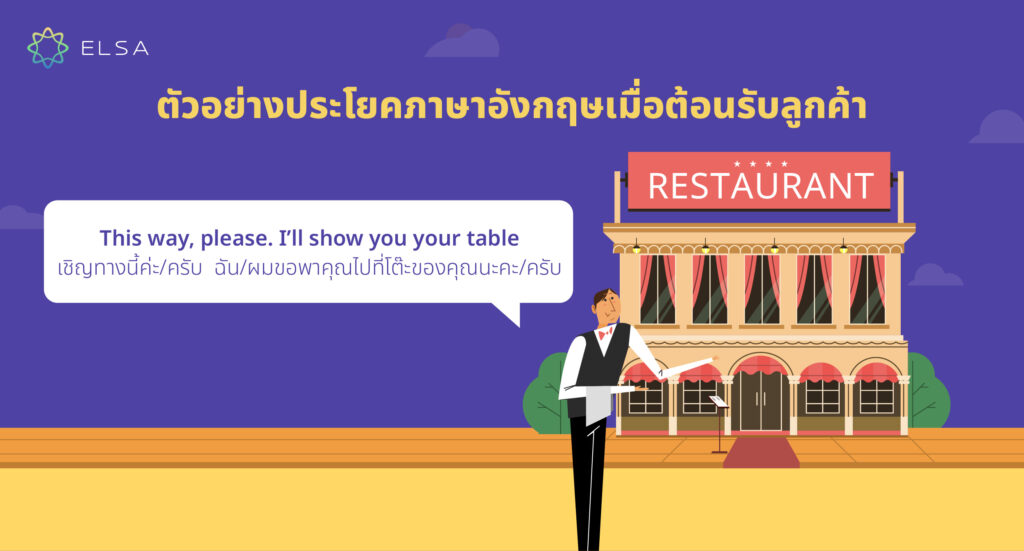
>>> Read more: ทักทายภาษาอังกฤษ : คำถาม คำตอบกลับ ทุกสถานการณ์ที่ควรรู้
ตัวอย่างประโยคภาษาอังกฤษในการจัดที่นั่งให้ลูกค้า
| ตัวอย่างประโยคภาษาอังกฤษ | แปล |
| Please wait to be seated. | กรุณารอสักครู่นะคะ/นะครับ เดี๋ยวพนักงานพาไปที่โต๊ะค่ะ/ครับ |
| Where would you prefer to sit? | คุณต้องการนั่งตรงไหนคะ/ครับ? |
| Mr.Jom, your table is ready. | คุณจอม โต๊ะของคุณพร้อมแล้วค่ะ/ครับ |
| I’ll show you to the table. This way, please. | ฉันจะพาคุณไปที่โต๊ะเอง เชิญทางเลยนี้ค่ะ/ครับ |
| Follow me, please. | ตามฉัน/ผมมาค่ะ/ครับ |
| Right this way. | เชิญทางเลยนี้ค่ะ/ครับ |
| Is this OK? | ที่นี่ได้ไหมคะ/ครับ? |
| Would you like a high chair for your child? | คุณต้องการเก้าอี้สูงสำหรับเด็กไหมคะ/ครับ? |
ตัวอย่างประโยคภาษาอังกฤษในการจดบันทึกเมนูอาหาร

| ตัวอย่างประโยคภาษาอังกฤษ | แปล |
| May I take your order? | จะสั่งเลยไหมคะ/ครับ? |
| Do you need a little time to decide? | ต้องการเวลาอีกสักนิดในการตัดสินใจไหมคะ/ครับ? |
| I’m so sorry. We are out of the tiger prawn. | ขอโทษจริง ๆ ค่ะ/ครับ กุ้งลายเสือหมดแล้วค่ะ/ครับ |
| How would you like your steak? | คุณชอบสเต็กแบบไหนคะ/ครับ? |
| Would you like a salad with it? | คุณอยากทานกับสลัดกับไหมคะ/ครับ? |
| What would you like to drink? | รับเครื่องดื่มอะไรดีคะ/ครับ? |
| What would you like for dessert? | คุณต้องการของหวานอะไรคะ/ครับ? |
| Would you like to taste the wine? | คุณอยากชิมไวน์ไหมคะ/ครับ? |
| Thank you. I’ll be right back with your drink. | ขอบคุณค่ะ/ครับ ฉัน/ผมจะกลับมาพร้อมเครื่องดื่มของคุณทันทีค่ะ/ครับ |
| การสื่อสารที่ดีระหว่างพนักงานเสิร์ฟและลูกค้ามีผลต่อประสบการณ์มื้ออาหารอย่างมาก และนอกจากประโยคบริการพื้นฐานแล้ว การรู้จักใช้ คําชม ภาษาอังกฤษ แบบสุภาพก็สามารถช่วยสร้างบรรยากาศที่เป็นมิตร ทำให้ลูกค้ารู้สึกประทับใจและอยากกลับมาอีกครั้ง |
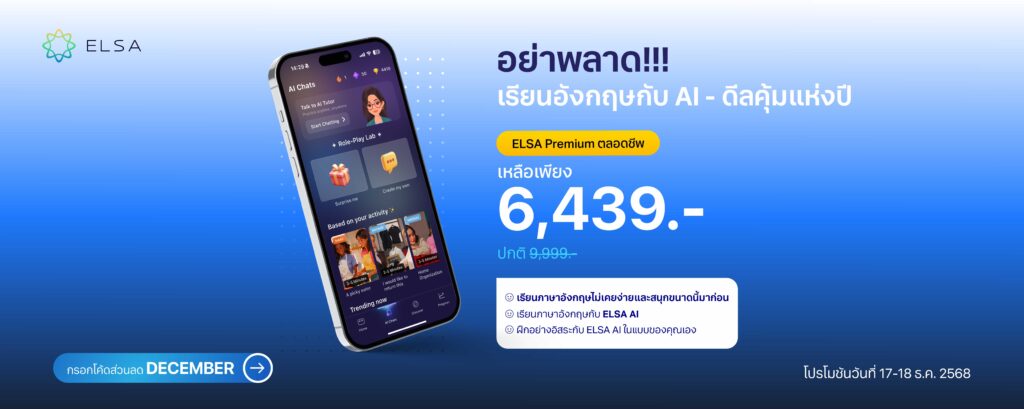
>>> Read more: 200+ คำศัพท์เมนูอาหารภาษาอังกฤษ
ตัวอย่างประโยคภาษาอังกฤษเมื่อนำอาหารไปให้ลูกค้า
| ตัวอย่างประโยคภาษาอังกฤษ | แปล |
| Here is your [dish]. Enjoy your meal! | นี่คือ [อาหาร] ของคุณ ทานอาหารให้อร่อยนะคะ/ครับ! |
| Excuse me, your order is ready. | ขออนุญาติค่ะ/ครับ ออร์เดอร์พร้อมแล้วค่ะ/ครับ |
| Here you go, [dish]. Let me know if you need anything else. | นี่คือ [อาหาร] กรุณาบอกฉัน/ผมได้เลย ถ้าคุณต้องการอะไรเพิ่มเติมนะคะ/ครับ |
| This is your [dish]. Please enjoy! | นี่คือ [อาหาร] ของคุณ ขอให้คุณมีมื้ออาหารที่อร่อยนะคะ/ครับ! |
| Would you like anything else with your meal? | คุณต้องการอะไรเพิ่มเติมเกี่ยวกับมื้ออาหารของคุณไหมคะ/ครับ? |
| I hope you enjoy your [dish]. Bon appétit! | ทานให้อร่อยนะคะ/ครับ |
| Here’s your drink, and the [dish] will arrive shortly. | นี่คือเครื่องดื่มของคุณค่ะ/ครับ และ [อาหาร] จะมาถึงในไม่ช้านะคะ/ครับ |
| Thank you for waiting. Here is your [dish]. | ขอบคุณที่รอค่ะ/ครับ นี่คือ [จาน] ของคุณ |
| I’ll bring your [dish] right away. | ฉันจะนำ [อาหาร] ของคุณมาทันทีค่ะ/ครับ |
| Please let me know if there’s anything else you’d like. | โปรดแจ้งให้ฉัน/ผมทราบถ้าคุณต้องการอะไรนะคะ/ครับ |
| May I serve it to you now? | ฉันขอเสิร์ฟให้คุณตอนนี้ได้ไหมคะ/ครับ? |
| Your steak, salad, and beer, sir. Please enjoy your lunch. | สเต็ก สลัด และเบียร์ของคุณค่ะ/ครับ ขอให้ทานมื้อเที่ยงให้อร่อยนะคะ/ครับ |
| This dish is very hot. Please be careful. | อาหารจานนี้ร้อนมาก ระวังด้วยนะคะ/ครับ |
| This food is best eaten while hot. Please enjoy your meal. | อาหารจานนี้ควรทานขณะยังร้อนอยู่ ขอให้ทานให้อร่อยนะคะ/ครับ |
| Enjoy yourself! | ทานให้อร่อยนะคะ/ครับ! |
ตัวอย่างประโยคภาษาอังกฤษในการแก้ปัญหา
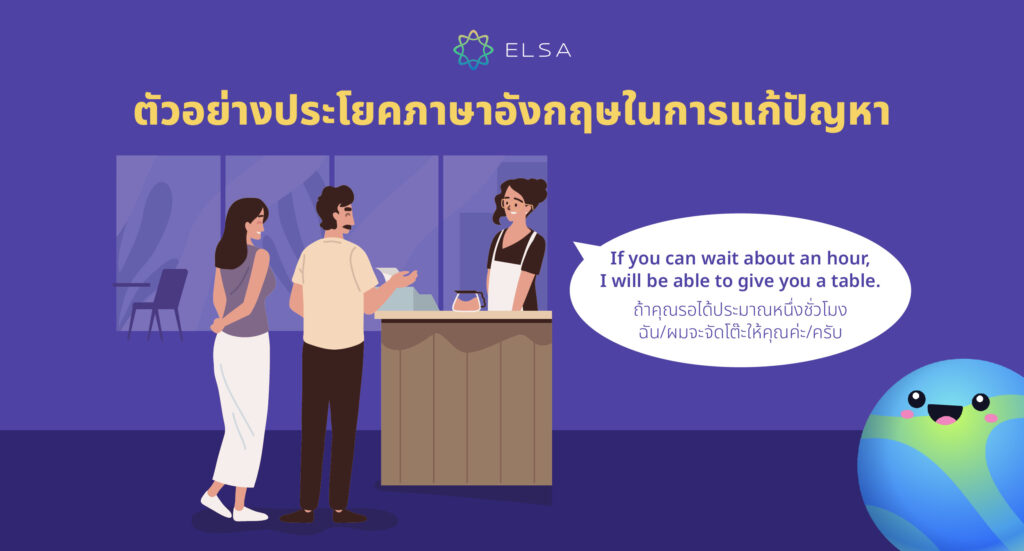
เมื่อลูกค้าไม่อยู่ในรายชื่อการจอง
| ตัวอย่างประโยคภาษาอังกฤษ | แปล |
| I’m so sorry but there’s no information about your reservation. Could you please tell me when you made your reservation, sir/madam? | ขออภัยจริง ๆ ค่ะ/ครับที่ไม่มีข้อมูลเกี่ยวกับการจองโต๊ะของคุณ โปรดบอกฉันว่าคุณจองไว้เมื่อไหร่เหรอคะ/ครับ? |
| If you can wait about an hour, I will be able to give you a table. | ถ้าคุณรอได้ประมาณหนึ่งชั่วโมง ฉัน/ผมจะจัดโต๊ะให้คุณค่ะ/ครับ |
ตัวอย่างประโยคเมื่อลูกค้าบ่นเรื่องอาหาร
| ตัวอย่างประโยคภาษาอังกฤษ | แปล |
| I’m so sorry. I’ll inform the chef and get you another dish. | ขอโทษจริง ๆ ค่ะ/ครับ จะแจ้งเชฟให้ทราบและเตรียมเมนูอื่นให้ค่ะ/ครับ |
| Will that be alright, sir/madam? Or would you prefer something else? | แบบนี้ได้หรือยังคะ/ครับ หรือคุณต้องการเมนูอื่นไหมคะ/ครับ? |
ตัวอย่างประโยคภาษาอังกฤษเมื่อลูกค้าชำระเงิน
| ตัวอย่างประโยคภาษาอังกฤษ | แปล |
| This is your bill. Would you like to pay by credit cash or cash? | นี่คือบิลของคุณค่ะ/ครับ คุณต้องการชำระเงินด้วยบัตรเครดิต หรือเงินสดคะ/ครับ? |
| Here is your change. | เงินทอนค่ะ/ครับ |
| Are you satisfied with our service? | คุณพอใจกับบริการของเราไหมคะ/ครับ? |
| Thank you for choosing our restaurant and See you soon. | ขอบคุณที่เลือกร้านอาหารของเราค่ะ/ครับ แล้วพบกันใหม่นะคะ/ครับ |

คำศัพท์ภาษาอังกฤษเพื่อการสื่อสารสำหรับพนักงานเสิร์ฟที่พบบ่อย
| คําศัพท์ | การออกเสียง | แปล |
| Starter | /ˈstɑːr.t̬ɚ/ | อาหารเรียกน้ำย่อย |
| Main course | /ˌmeɪn ˈkɔːrs/ | อาหารจานหลัก |
| Dessert | /dɪˈzɝːt/ | ของหวาน |
| Roast food | /roʊst fuːd/ | อาหารอบ |
| Grilled food | /ɡrɪld fuːd/ | อาหารย่าง |
| Fried food | /fraɪd fuːd/ | อาหารทอด |
| Saute | /sɔːˈteɪ/ | อาหารผัด |
| Stew | /stuː/ | อาหารตุ๋น |
| Steam food | /stiːm fuːd/ | อาหารนึ่ง |
| Napkin | /ˈnæp.kɪn/ | ผ้าเช็ดปาก |
| Tray | /treɪ/ | ถาด |
| Spoon | /spuːn/ | ช้อน |
| Knife | /naɪf/ | มีด |
| Fork | /fɔːrk/ | ส้อม |
| Bowl | /boʊl/ | ชาม |
| Chopsticks | /ˈtʃɑːp.stɪk/ | ตะเกียบ |
| Ladle | /ˈleɪ.dəl/ | ทัพพี |
| Plate | /pleɪt/ | จาน |
| Mug | /mʌɡ/ | แก้ว |
| Pepper shaker | /ˈpep.ə ˌʃeɪ.kər/ | ขวดพริกไทย |
| Straw | /strɑː/ | หลอดดูดน้ำ |
| Tablecloth | /ˈteɪ.bəl.klɑːθ/ | ผ้าปูโต๊ะ |
| Teapot | /ˈtiː.pɑːt/ | กาน้ำชา |
| Tongs | /tɑːŋz/ | ที่คีบอาหาร |
| Wine | /waɪn/ | ไวน์ |
| Beer | /bɪr/ | เบียร์ |
| Alcohol | /ˈæl.kə.hɑːl/ | แอลกอฮอล์ |
| Coke | /koʊk/ | โค้ก |
| Juice | /dʒuːs/ | น้ำผลไม้ |
| Smoothie | /ˈsmuː.ði/ | สมูทตี้ |
| Coffee | /ˈkɑː.fi/ | กาแฟ |
| Tea | /tiː/ | ชา |
| Milk | /mɪlk/ | นม |
| Sparkling water | /ˈspɑːr.klɪŋ ˈwɑː.t̬ɚ/ | น้ำอัดลม |
| Cocoa | /ˈkoʊ.koʊ/ | โกโก้ |
| Ice tea | /ˌaɪs ˈtiː/ | ชาเย็น |
| Green tea | /ˌɡriːn ˈtiː/ | ชาเขียว |
| Lemonade | /ˌlem.əˈneɪd/ | น้ำมะนาว |
| Milkshake | /ˈmɪlk.ʃeɪk/ | มิลค์เชค |
| Beef | /biːf/ | เนื้อวัว |
| Pork | /pɔːrk/ | เนื้อหมู |
| Lamb | /læm/ | เนื้อแกะ |
| Chicken | /ˈtʃɪk.ɪn/ | ไก่ |
| Goose | /ɡuːs/ | ห่าน |
| Duck | /dʌk/ | เป็ด |
| Seafood | /ˈsiː.fuːd/ | อาหารทะเล |
| Fish | /fɪʃ/ | ปลา |
| Octopus | /ˈɑːk.tə.pəs/ | ปลาหมึก |
| Shrimp | /ʃrɪmp/ | กุ้ง |
| Crab | /kræb/ | ปู |
| Lobster | /ˈlɑːb.stɚ/ | กุ้งมังกร |
| Mussels | /ˈmʌs.əl/ | หอยแมลงภู่ |
| Lettuce | /ˈlet̬.ɪs/ | ผักกาดหอม |
| Cabbage | /ˈkæb.ɪdʒ/ | กะหล่ำปลี |
| Apple pie | /ˌæp.əl ˈpaɪ/ | พายแอปเปิ้ล |
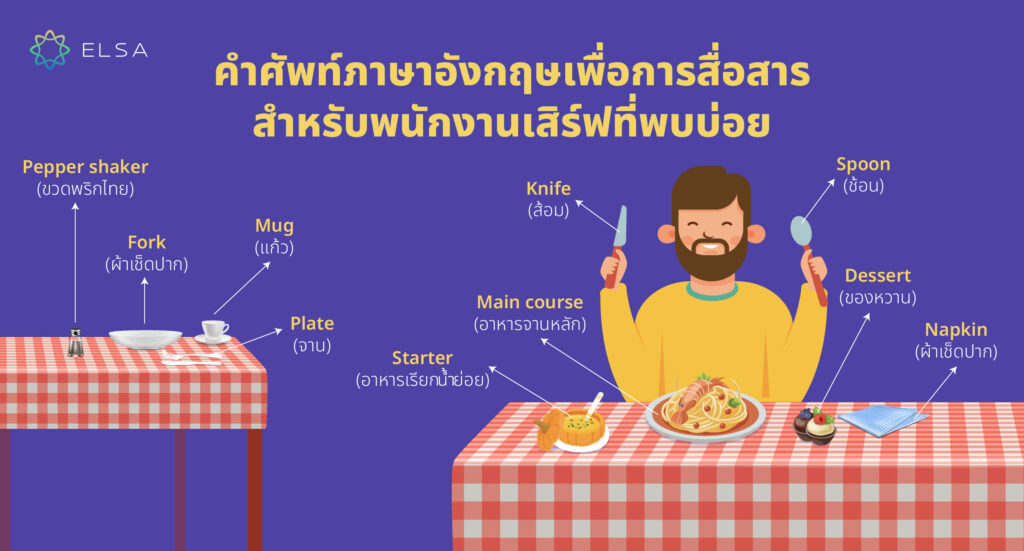
ตัวอย่าง บทสนทนาร้านอาหาร ภาษาอังกฤษ สำหรับพนักงานเสิร์ฟ
เมื่อต้อนรับลูกค้า
| บทบาท | บทสนทนาภาษาอังกฤษ ต้อนรับลูกค้า ร้านอาหาร | แปล |
| Waiter | Good evening! Welcome to our restaurant. How can I help you today? | สวัสดีตอนเย็นครับ ยินดีต้อนรับสู่ร้านอาหารของเรา มีอะไรให้ผมช่วยไหมครับ? |
| Customer | Good evening! Can I have a table for two, please? | สวัสดีตอนเย็นค่ะ ฉันขอจองโต๊ะสำหรับสองคนได้ไหมคะ? |
| Waiter | Certainly! Please follow me. | ได้สิครับ เชิญตามผมมาเลยครับ |
>>> Read more: ประโยคต้อนรับลูกค้าในภาษาอังกฤษที่ใช้บ่อยที่สุด
เมื่อสั่งอาหาร
| บทบาท | ภาษาอังกฤษ | ภาษาไทย |
| Waiter | Here are your menus. Would you like to start with something to drink? | เมนูครับ คุณอยากเริ่มด้วยเครื่องดื่มไหมครับ? |
| Customer | Yes, I’ll have a glass of red wine, and my friend will have orange juice. | ได้ค่ะ เอาไวน์แดงหนึ่งแก้ว และเพื่อนของฉันจะดื่มน้ำส้มค่ะ |
| Waiter | Excellent choice! Are you ready to order your food, or do you need more time? | เป็นตัวเลือกที่ดีครับ! คุณพร้อมที่จะสั่งอาหารแล้วหรือยังครับ หรือคุณต้องการเวลาเพิ่มไหมครับ? |
| Customer | We’re ready. I’ll have the grilled salmon, and my friend would like the chicken pasta. | พร้อมแล้วค่ะ ฉันเอาแซลมอนย่าง ส่วนเพื่อนของฉันจะทานพาสต้าไก่ค่ะ |
| Waiter | Perfect. Would you like any side dishes or appetizers? | ดีมากครับ คุณต้องการอาหารเพิ่มเติมหรืออาหารเรียกน้ำย่อยไหมครับ? |
| Customer | No, that will be all for now. Thank you. | ไม่เอาค่ะ เอาเท่านี้ก่อนล่ะกัน ขอบคุณค่ะ |
>>> Read more: สั่งอาหาร ภาษาอังกฤษ: ตัวอย่างประโยค คำศัพท์และบทสนทนาที่จำง่าย
เมื่อชําระเงิน
| บทบาท | ภาษาอังกฤษ | ภาษาไทย |
| Customer | Excuse me, can we have the bill, please? | ขอโทษค่ะ ขอบิลหน่อยได้ไหมคะ? |
| Waiter | Of course. I’ll bring it right away. | ได้ครับ ผมจะเอามาให้คุณลูกค้าทันทีครับ |
| Waiter | Here’s your bill. You can pay at the counter or here at the table. | นี่ครับ บิลของคุณครับ คุณสามารถชำระเงินที่เคาน์เตอร์หรือที่โต๊ะนี้ก็ได้นะครับ |
| Customer | We’ll pay here. Thank you! | เราจะจ่ายที่นี่ค่ะ ขอบคุณค่ะ! |
| Waiter | Thank you for dining with us. Have a great evening! | ขอบคุณที่มาทานอาหารกับเรานะครับ ขอให้คุณมีค่ำคืนที่ดีครับ! |
ด้วยบทสนทนา ภาษาอังกฤษ สำหรับพนักงานเสิร์ฟ ที่นําเสนอในบทความนี้ เราหวังว่าคุณจะสามารถปูพื้นฐานภาษาอังกฤษและใช้มันเมื่อจำเป็น นอกจากนี้ อย่าลืมแบ่งเวลาฝึกฝนกับ ELSA Speak เพื่อให้สามารถใช้ภาษาอังกฤษได้อย่างมั่นใจเหมือนเจ้าของภาษาด้วยนะ!
จะเริ่มเตรียมตัวสอบ TOEIC อย่างไรดี? คุณต้องรู้ข้อมูลอะไรบ้างเมื่อเตรียมตัวสอบด้วยตัวเอง? มาร่วมค้นหาวิธีการเกี่ยวกับการสอบ TOEIC และการเตรียมตัวที่คุณอาจจะยังไม่เคยรู้กับ ELSA Speak ได้ที่นี่!
แผนการเตรียมสอบ TOEIC 2025 สำหรับผู้ที่เริ่มต้น
ลองดูแผนการเตรียมสอบ TOEIC 2025 สำหรับผู้ที่เริ่มต้น ซึ่งจะช่วยให้คุณพัฒนาทักษะภาษาอังกฤษได้ทีละขั้นตอนและบรรลุเป้าหมายในการสอบ TOEIC ได้อย่างมีประสิทธิภาพ:
แผนการเรียนในระยะเวลา 6 เดือน
| เป้าหมาย | กิจกรรม |
| เดือนที่ 1: เรียนพื้นฐาน | • เรียนรู้คำศัพท์พื้นฐาน 100 คำ (ระดับ A1) • ทำความคุ้นเคยกับ Tense พื้นฐาน (Present Simple, Past Simple) • ฟังและอ่านสื่อภาษาอังกฤษง่าย ๆ เช่น นิทานสั้นๆหรือเพลง |
| เดือนที่ 2: เสริมไวยากรณ์และคำศัพท์ | • เรียนรู้คำศัพท์เพิ่มเติม 200 คำ (ระดับ A2) • ทบทวน 12 Tense พื้นฐาน • เริ่มเรียนรู้โครงสร้างประโยคทั่วไป เช่น ประโยคเงื่อนไขและประโยคที่ประธานเป็นผู้ถูกกระทำ |
| เดือนที่ 3: ฝึกทักษะการฟัง | • ฝึกฟังบทสนทนา บทความ หรือวิดีโอภาษาอังกฤษง่าย ๆ ทุกวัน • ทำแบบฝึกหัดการ • ฟังจากข้อสอบตัวอย่างเข้าร่วมห้องเรียนสนทนาภาษาอังกฤษถ้าเป็นไปได้ |
| เดือนที่ 4: พัฒนาการอ่านและการเขียน | • อ่านบทความหรือเอกสารสั้น ๆ และสรุปเนื้อหา • เขียนไดอารี่ประจำวันเป็นภาษาอังกฤษ (50-100 คำ) • เรียนรู้คำศัพท์ตามหัวข้อ เช่น ธุรกิจ การท่องเที่ยว ฯลฯ |
| เดือนที่ 5: ฝึกทำข้อสอบและทบทวน | • ทำข้อสอบจริงอย่างน้อย 2 ชุดต่อสัปดาห์ • ทบทวนคำศัพท์และไวยากรณ์ที่เรียนมา • ตรวจสอบข้อผิดพลาดและปรับปรุง |
| เดือนที่ 6: เตรียมตัวสอบ | • ทำข้อสอบตัวอย่างในสถานการณ์จำลองเหมือนจริง (เวลา พื้นที่) • ทบทวนทักษะที่ยังไม่แข็งแรง • เข้าร่วมกลุ่มเรียนเพื่อแลกเปลี่ยนประสบการณ์และเรียนรู้เพิ่มเติม |
ข้อควรทราบ:
- เวลาเรียน: ใช้เวลาเรียนอย่างน้อย 1-2 ชั่วโมงต่อวัน
- เอกสารเรียน: ใช้หนังสือเตรียมสอบ TOEIC แอปพลิเคชันเรียนภาษาอังกฤษ และเว็บไซต์การเรียนรู้ออนไลน์
- การประเมินตนเอง: ติดตามความก้าวหน้าของตัวเองด้วยการทำแบบทดสอบเป็นประจำ
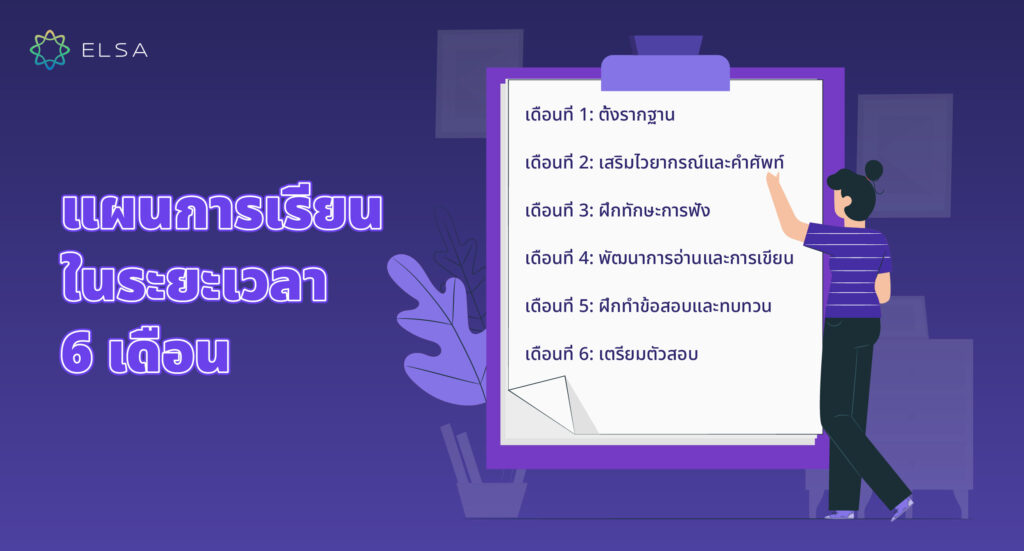
เคล็ดลับเตรียมสอบ TOEIC ไม่มีพื้นฐาน
เคล็ดลับบางประการที่คุณสามารถนำไปใช้เพื่อเตรียมสอบ TOEIC ด้วยตัวเองที่บ้านและได้คะแนนสูงโดยไม่ต้องมีพื้นฐาน:
เรียนคำศัพท์ที่มักออกสอบ
- การเรียนคำศัพท์ภาษาอังกฤษต้องใช้ความอดทนและความขยัน แต่หากคุณต้องการจำคำศัพท์ให้ได้มากที่สุด ขอแนะนำให้เรียนรู้คำศัพท์ผ่านวลีหรือกลุ่มคำที่พบได้บ่อยในหัวข้อต่าง ๆ แทนที่จะท่องจำทีละคำ
- คุณสามารถขีดเส้นใต้คำที่มักเจอบ่อยๆในข้อสอบ และจำคำเหล่านั้นในระหว่างการฝึกทำข้อสอบ
พิชิตทุกไวยากรณ์
- เรียนรู้ตามหลักการ 80-20: หมายถึง 80% ของผลลัพธ์ที่คุณได้รับเกิดจากการลงมือทำเพียง 20% ในระยะเวลาสั้น ๆ คุณอาจจะไม่สามารถจำไวยากรณ์ทั้งหมดในข้อสอบได้ ดังนั้นให้เน้นไปที่ 20% ของไวยากรณ์ที่สำคัญและใช้บ่อยที่สุด
- เรียนไวยากรณ์จากการแก้ข้อผิดพลาด: การแก้ไขข้อผิดพลาดในข้อสอบที่คุณทำจะช่วยเพิ่มประสบการณ์ให้กับคุณเมื่อเจอข้อสอบลักษณะคล้ายกันในอนาคต สำหรับวิธีการเรียนนี้ ต้องการความขยันทำแบบฝึกหัดให้มากที่สุด และเรียนรู้ร่วมกับกลุ่มเพื่อนเพื่อเพิ่มประสิทธิภาพของการเรียน
- เรียนโครงสร้างจากหนังสือพิมพ์ หนังสือ และการ์ตูน: หนังสือพิมพ์สองภาษาระหว่างไทย-อังกฤษหรืออังกฤษ-ไทยเป็นวิธีที่ดีในการพัฒนาทักษะไวยากรณ์ คุณสามารถเข้าถึงข่าวสารเพิ่มเติมและจำโครงสร้างใหม่ ๆ ได้พร้อมกัน
- เรียนรู้ผ่านเกมออนไลน์: ปัจจุบันมีเกมมากมายบนสมาร์ตโฟนและคอมพิวเตอร์ที่ช่วยให้คุณเรียนภาษาอังกฤษไปพร้อมกับความบันเทิง เกมเหล่านี้มักมาพร้อมคำอธิบายและตัวอย่างที่น่าสนใจ ช่วยให้จดจำได้ง่ายขึ้น
ฝึกทำข้อสอบจริง
- จัดสรรเวลาในการทำข้อสอบ: ควรแบ่งเวลาให้เหมาะสมกับแต่ละส่วนของข้อสอบ เพื่อหลีกเลี่ยงความตื่นเต้นเมื่อต้องรีบตอบคำถามในช่วงเวลาที่เหลือน้อยแต่ยังมีอีกหลายข้อที่ยังไม่เลือกคำตอบ นอกจากนี้ หลักการ 80/20 ก็เป็นวิธีที่มีประโยชน์สำหรับการจัดเวลาในระหว่างการสอบ
- ตัดตัวเลือกคำตอบ: หากคุณไม่มั่นใจในคำตอบที่เลือกไว้ ให้ลองวิเคราะห์ตัวเลือกที่เหลือโดยใช้ความรู้ของคุณเกี่ยวกับความหมายของคำเหล่านั้น
- สังเกต “กับดัก” ในข้อสอบ: การรู้จักกับดักในข้อสอบขึ้นอยู่กับประสบการณ์ในการทำข้อสอบบ่อย ๆ และการสังเกตรายละเอียดเล็ก ๆ น้อย ๆ ความคุ้นเคยเหล่านี้จะช่วยให้คุณสามารถเลือกคำตอบที่ถูกต้องได้ง่ายขึ้น
- อย่าปล่อยคำตอบให้ว่าง: เนื่องจากข้อสอบส่วนใหญ่เป็นแบบปรนัย หากคุณไม่สามารถตอบคำถามได้ทันเวลาหรือไม่มั่นใจ ควรตอบทุกข้อ เพราะอาจมีบางคำตอบที่ถูกต้องอยู่
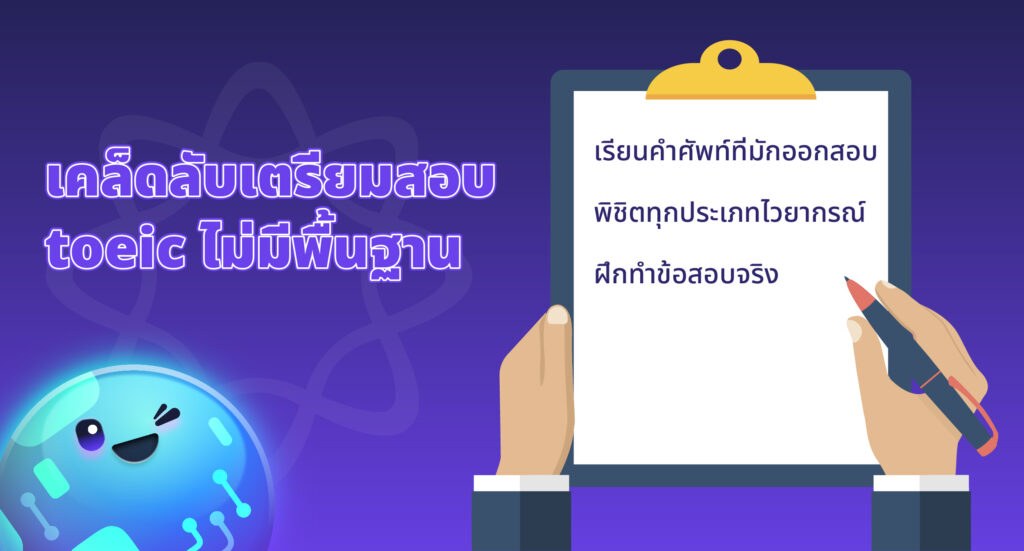
วิธีเตรียมสอบ toeic 7 วัน ถึง 1 เดือน
หากต้องการได้คะแนนสอบ TOEIC สูงๆ สิ่งสำคัญคือต้องวางแผนเวลาอย่างชัดเจนก่อนสอบ เพื่อให้เกิดประสิทธิภาพสูงสุด ELSA Speak มีคำแนะนำและวิธีการเรียนรู้ที่มีประสิทธิภาพสำหรับการเตรียมตัวสอบ toeic 1 อาทิตย์ ถึง 1 เดือนดังนี้
ประเมินระดับความสามารถของตัวเอง
ก่อนเริ่มกระบวนการเตรียมสอบ TOEIC สิ่งที่สำคัญที่สุดคือต้องประเมินระดับความสามารถและเป้าหมายของตัวเอง จากนั้นให้วางแผนการเรียนและการทบทวนที่เหมาะสม ลองตอบคำถามเหล่านี้เพื่อประเมินระดับปัจจุบันของคุณ:
- คุณอยู่ในระดับคะแนน TOEIC ใด และเป้าหมายคะแนนของคุณคือเท่าไร?
- ทักษะใดที่คุณถนัดมากกว่า: การฟังหรือการอ่าน? คุณควรให้เวลากับทักษะใดมากขึ้น?
- ระดับไวยากรณ์และคำศัพท์ของคุณเป็นอย่างไร? คุณควรปรับปรุงในด้านใด?
- คุณต้องเตรียมอะไรบ้างสำหรับการสอบ TOEIC ภายใน 1 เดือน?
เพื่อให้คำตอบเหล่านี้แม่นยำยิ่งขึ้น คุณควรลองทำข้อสอบจริงภายในเวลา 120 นาที จากนั้นตรวจคำตอบและให้คะแนนด้วยตัวเอง การทำเช่นนี้จะช่วยให้คุณประเมินระดับความสามารถของตัวเองได้อย่างถูกต้อง และกำหนดทิศทางการเรียนที่เหมาะสม
หากคุณได้คะแนน 500 คะแนนขึ้นไป: ให้เริ่มต้นฝึกทำข้อสอบทันที หากคุณได้คะแนนต่ำกว่า 495 คะแนน หรือพบว่าตัวเองยังทำผิดพลาดบ่อยครั้ง และยังไม่แม่นในไวยากรณ์และคำศัพท์ ให้มุ่งเน้นการฝึกฝนทักษะเฉพาะด้านและเสริมสร้างพื้นฐานความรู้ก่อน
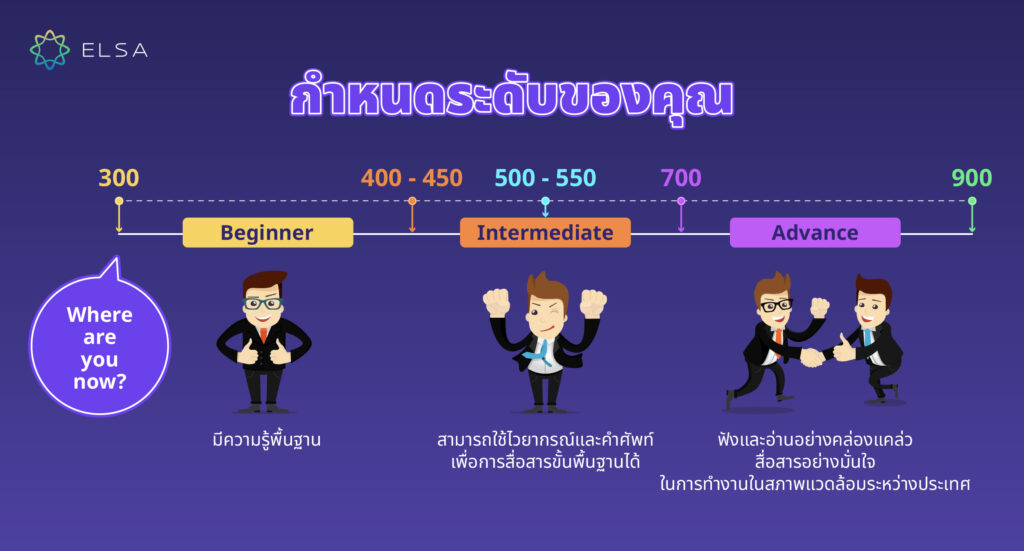
เตรียมทักษะการอ่านและการฟัง (Reading และ Listening)
ไวยากรณ์สำหรับการสอบ TOEIC
ไวยากรณ์ถือเป็นหนึ่งในเกณฑ์สำคัญที่ใช้ในการประเมินความสามารถในการใช้ภาษาของผู้เรียนทั้งในชีวิตประจำวันและการทำงาน เช่นเดียวกัน การสอบ TOEIC ก็มีการรวมโครงสร้างไวยากรณ์ภาษาอังกฤษที่ใช้บ่อยที่สุดไว้ในข้อสอบ
แกรมม่า เตรียมสอบ toeic ที่คุณควรรู้เพื่อให้ได้คะแนนสูงสุดในการสอบที่กำลังมาถึง::
- 12 Tense พื้นฐานในภาษาอังกฤษ (English Tenses)
- รูปแบบของคำกริยา (Gerund and Infinitive)
- กริยาช่วย (Modal Verbs)
- ประโยคเปรียบเทียบ (Comparison)
- ประโยคที่ประธานเป็นผู้ถูกกระทำ (Passive Voice)
- ประโยคเงื่อนไข (Conditional Sentences)
- อนุประโยค (Clauses)
- ประโยคสมมติ (Subjunctive)
- กริยาช่องที่ 3 และกริยาช่องที่ 1 (Past Participle และ Present Participle)
- ความสอดคล้องระหว่างประธานและกริยา (Subject-Verb Agreement)
- รูปแบบคำถามที่พบได้บ่อยในภาษาอังกฤษ (The Question)
- Parts of Speech คือชนิดของคำ
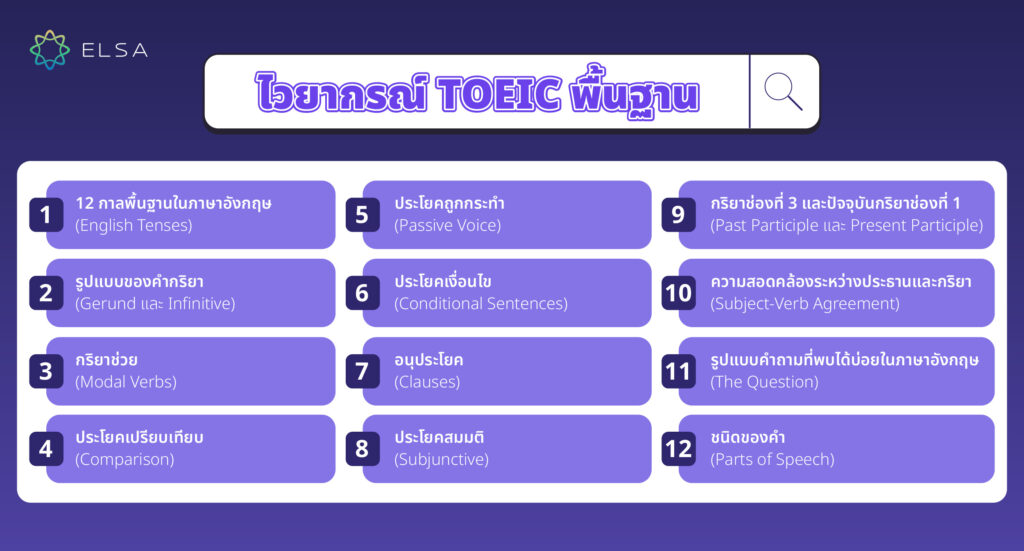
คำศัพท์สำหรับการสอบ TOEIC
ด้านล่างนี้คือขั้นตอนการเรียนรู้คำศัพท์สำหรับการสอบ TOEIC ที่พบบ่อยในข้อสอบ ซึ่งคุณสามารถใช้อ้างอิงได้
ขั้นตอนที่ 1: กำหนดจำนวนคำศัพท์ที่ต้องเรียนรู้
คุณต้องกำหนดเป้าหมายที่ชัดเจนในช่วงเวลาที่กำหนด เพื่อให้สามารถตัดสินใจเกี่ยวกับจำนวนคำศัพท์และระดับของคำศัพท์ที่ต้องเรียนรู้อย่างง่ายๆ การตั้งเป้าหมายที่ชัดเจนตั้งแต่แรกจะช่วยหลีกเลี่ยงการเรียนที่ไม่มีเป้าหมายและความเบื่อหน่ายเนื่องจากต้องพยายามจดจำคำศัพท์จำนวนมากในครั้งเดียว
ขั้นตอนที่ 2: รวบรวมและจดจำคำศัพท์ตามหมวดหมู่
การเรียนรู้คำศัพท์ภาษาอังกฤษตามหมวดหมู่ช่วยให้จดจำได้ง่ายขึ้นผ่านการเชื่อมโยงและสร้างระบบความรู้ เช่น หมวดหมู่ที่พบบ่อยได้แก่ การท่องเที่ยว เทคโนโลยีสารสนเทศ และการแพทย์
ขั้นตอนที่ 3: ทบทวนคำศัพท์ด้วยวิธี Spaced Repetition
มีหลายวิธีในการจดจำคำศัพท์ แต่ Spaced Repetition (การทบทวนแบบเว้นระยะ) ถือเป็นหนึ่งในวิธีที่มีประสิทธิภาพที่สุด โดยช่วยสร้างช่วงพักในกระบวนการเรียนรู้ของคุณ คือ “ช่วงเวลาทอง” เพื่อการจดจำที่ดีขึ้น ตัวอย่างเช่น หากวันนี้คุณเรียนรู้คำศัพท์ใหม่ 10 คำ และทบทวนอีกครั้งหลังจาก 1 ชั่วโมง จะช่วยเพิ่มความสามารถในการจดจำคำศัพท์ได้ถึง 75% เมื่อเทียบกับเพียง 30%
ขั้นตอนที่ 4: เรียนรู้คำศัพท์วันละ 15-20 คำ
ควรจัดเวลาในแต่ละวันเพื่อเรียนรู้คำศัพท์ใหม่เพียง 15-20 คำ พร้อมกับการทบทวนคำศัพท์เดิม วิธีนี้จะช่วยสร้างนิสัยการเรียนที่สม่ำเสมอและเสริมสร้างความรู้คำศัพท์เดิมให้แน่นขึ้น
ขั้นตอนที่ 5: นำคำศัพท์ไปใช้ในชีวิตจริง
สมองของมนุษย์จดจำภาพได้ดีกว่าคำพูด เมื่อเรียนรู้คำศัพท์ใหม่ อย่าจดจำแค่การเขียน แต่ลองเชื่อมโยงคำเหล่านั้นกับภาพในชีวิตประจำวัน นอกจากนี้ คุณยังสามารถเรียนรู้คำศัพท์ผ่านหนังสือพิมพ์หรือภาพยนตร์ ซึ่งมักมีคำศัพท์ใหม่ ๆ ให้คุณได้เรียนรู้และจดจำได้ดีขึ้น
ขั้นตอนที่ 6: ฝึกออกเสียงผ่านแอปพลิเคชัน
หากคุณกำลังมองหาแอปพลิเคชันสำหรับการเรียนรู้และฝึกฝนคำศัพท์ภาษาอังกฤษอย่างมีประสิทธิภาพ ลองใช้แอป ELSA Speak แอปนี้ช่วยพัฒนาการออกเสียง เสริมสร้างความมั่นใจในการพูดภาษาอังกฤษ และเพิ่มความสามารถในการสื่อสารได้อย่างเห็นผล ดาวน์โหลดแอปฝึกออกเสียงภาษาอังกฤษ ELSA Speak เพื่อเริ่มต้นเส้นทางการพิชิตภาษาอังกฤษของคุณได้เลย!
การเตรียมทักษะ Speaking และ Writing
ความรู้พื้นฐานที่คุณต้องฝึกฝนและฝึกปฏิบัติอย่างสม่ำเสมอเพื่อพัฒนาทักษะการพูดและการเขียนของคุณ
การออกเสียงภาษาอังกฤษ
การออกเสียงคำภาษาอังกฤษที่ถูกต้องช่วยให้คุณสื่อสารได้อย่างเป็นธรรมชาติและคล่องแคล่วมากขึ้น ขั้นตอนการฝึกออกเสียงที่บ้านสำหรับผู้ที่เตรียมสอบ TOEIC:
ขั้นตอนที่ 1: เลือกสำเนียง “มาตรฐาน”
ปัจจุบันมีสองสำเนียงที่เป็นมาตรฐานคือ สำเนียงอังกฤษ (British English) และสำเนียงอเมริกัน (American English) ดังนั้น คุณควรเลือกสำเนียงที่เหมาะกับตัวคุณโดยพิจารณาจากความชอบ สภาพแวดล้อมการสื่อสาร และระดับความยาก
ขั้นตอนที่ 2: อ่านออกเสียงคำศัพท์ภาษาอังกฤษตามตาราง IPA (International Phonetic Alphabet)
IPA คือตารางสัญลักษณ์การออกเสียงสากลที่ช่วยให้ผู้เรียนภาษาอังกฤษทราบวิธีการออกเสียงคำศัพท์แต่ละคำ IPA ประกอบด้วย 44 สัญลักษณ์ ซึ่งแบ่งเป็น 20 สระและ 24 พยัญชนะ คุณควรเรียนตามลำดับ: พยัญชนะ → สระเสียงสั้น → สระเสียงยาว เพื่อให้เรียนรู้ได้ง่ายขึ้น
ขั้นตอนที่ 3: เรียนรู้การเน้นเสียงและทำนอง
คำศัพท์ภาษาอังกฤษหนึ่งคำอาจประกอบด้วยหลายพยางค์ แต่จะมีเพียงพยางค์เดียวที่ถูกเน้นเสียง ดังนั้นคุณควรรู้:
- เสียงเน้นของคำอยู่ที่พยางค์ใด
- เจ้าของภาษามักเน้นเสียงในลักษณะใด
ขั้นตอนที่ 4: ฝึกออกเสียงคำศัพท์
เพื่อให้มั่นใจว่าคุณฝึกออกเสียงอย่างถูกต้อง คุณควรใช้พจนานุกรม Oxford หรือ Cambridge เพื่อตรวจสอบ จากนั้นฝึกพูดคำเดี่ยวหรือวลีในประโยค จากนั้นรวมคำเหล่านั้นเข้าด้วยกันและอ่านประโยคให้สมบูรณ์
ขั้นตอนที่ 5: บันทึกเสียงของตัวเองและตรวจสอบ
เพื่อให้รู้ถึงข้อผิดพลาดในการออกเสียง คุณสามารถใช้โทรศัพท์มือถือหรือเครื่องบันทึกเสียงเพื่อบันทึกเสียงของตัวเองและฟังซ้ำ ควรฝึกพูดวันละ 15-20 นาที เพื่อพัฒนาสำเนียงและน้ำเสียงของคุณ
ขั้นตอนที่ 6: แก้ไขข้อผิดพลาดในการออกเสียง
หลังจากเรียนในแต่ละวัน ให้จดบันทึกคำที่คุณออกเสียงผิดและตรวจสอบการออกเสียงแต่ละคำ หนึ่งในวิธีที่มีประสิทธิภาพที่สุดคือการฟังภาษาอังกฤษจากทีวี วิทยุ พอดแคสต์ หรือภาพยนตร์ต่างประเทศ
นอกจากนี้ คุณยังสามารถใช้แอปพลิเคชันฝึกออกเสียงและคำศัพท์อย่าง ELSA Speak ซึ่งไม่เพียงแต่ช่วยให้คุณเรียนรู้ทฤษฎี แต่ยังมีแบบฝึกหัดที่หลากหลาย เพื่อช่วยให้คุณฝึกออกเสียงได้เหมือนเจ้าของภาษาได้ทุกที่ทุกเวลา เริ่มต้นเส้นทางการพัฒนาภาษาอังกฤษของคุณวันนี้ด้วย ELSA Speak!

คำศัพท์สำหรับการพูดและการเขียน
เพื่อพัฒนาทักษะการพูดและการเขียนให้คล่องแคล่ว คุณจำเป็นต้องใช้คำศัพท์ที่พบบ่อยที่สุดและฝึกฝนอย่างสม่ำเสมอ ต่อไปนี้เป็นเคล็ดลับการเรียนรู้คำศัพท์ TOEIC ที่คุณควรทำเพื่อเพิ่มคะแนนในส่วน Speaking และ Writing:
- เรียนคำศัพท์เป็นวลีหรือกลุ่มคำ: เพื่อหลีกเลี่ยงการประกอบคำเดี่ยวๆ ให้กลายเป็นวลีที่ไม่มีความหมาย คุณควรเรียนรู้วลีที่พบบ่อยในภาษาอังกฤษ วิธีนี้ยังช่วยให้คุณเรียนรู้คำศัพท์เดี่ยวๆ ที่อยู่ในวลีนั้นได้อีกด้วย
- เรียนรู้คำศัพท์ตามหัวข้อ: การแบ่งคำศัพท์ออกเป็นหัวข้อช่วยให้คุณสามารถขยายไอเดียและนำเสนอได้คล่องแคล่วขึ้น นอกจากนี้ การเรียนรู้แบบนี้ยังช่วยให้คุณจำคำศัพท์ที่เรียนได้อย่างยาวนาน แทนการเรียนรู้คำที่ไม่เกี่ยวข้องกัน
- ใช้คำศัพท์ที่เหมาะสมกับบริบท: ในการพูดหรือเขียน คุณควรเลือกใช้คำศัพท์ที่เหมาะสมและเป็นทางการ หากต้องการตรวจสอบว่าคำใดเป็นทางการหรือไม่ คุณสามารถใช้พจนานุกรมหรืออ้างอิงจากบทความข่าวต่างๆ
- ฝึกฝนซ้ำหลายๆ ครั้ง: สำหรับการพูด (Speaking) คุณสามารถฝึกพูดเกี่ยวกับหัวข้อต่างๆ โดยพูดหน้ากระจกหรือฝึกซ้อมกับเพื่อน สำหรับการเขียน (Writing) คุณสามารถใช้เครื่องมือตรวจสอบคะแนนการเขียนออนไลน์ เพื่อช่วยตรวจสอบจุดที่ควรปรับปรุงในบทความของคุณ
โครงสร้างข้อสอบ TOEIC
โครงสร้างของข้อสอบ TOEIC มีสองรูปแบบที่ใช้กันทั่วโลก ได้แก่ ข้อสอบ 2 ทักษะ และ 4 ทักษะ ดังนี้:
โครงสร้างข้อสอบ 2 ทักษะ
ในข้อสอบ 2 ทักษะ ผู้เข้าสอบจะต้องทำข้อสอบแบบปรนัยทั้งหมด 200 ข้อ ภายในระยะเวลา 120 นาที
| ทักษะ | จำนวนข้อ | เนื้อหา | เวลา |
| Listening | 100 | • รูปภาพ: 6 ข้อ • คำถาม-คำตอบ: 25 • ข้อบทสนทนาสั้น: 39 • ข้อข้อความพูด: 30 ข้อ | 45 นาที |
| Reading | 100 | • เติมประโยค: 30 • ข้อเติมข้อความ: 16 • ข้ออ่านเพื่อความเข้าใจ: 54 ข้อ | 75 นาที |
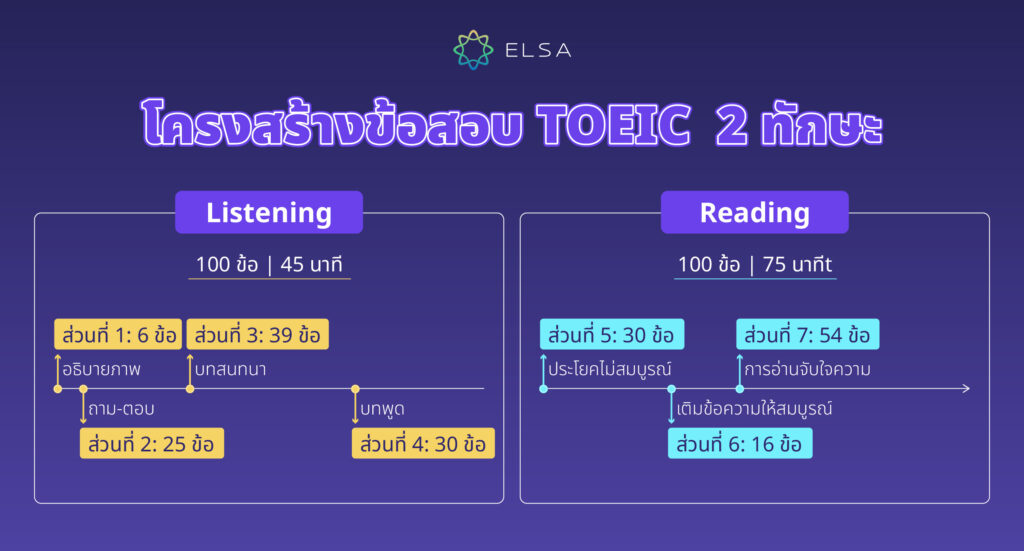
โครงสร้างข้อสอบ 4 ทักษะ
ในการทดสอบ 4 ทักษะ ผู้สมัครจะต้องผ่านอีก 2 ทักษะ คือ การพูดและการเขียน จำนวนคำถามทั้งหมดของทักษะทั้งหมดคือ 219 ข้อและใช้เวลาในการทำทั้งหมด 200 นาที
| ทักษะ | จำนวนข้อ | เนื้อหา | เวลา |
| Listening | 100 | • รูปภาพ: 6 ข้อ • คำถาม-คำตอบ: 25 ข้อ • บทสนทนาสั้น: 39 ข้อ • ข้อความพูด: 30 ข้อ | 45 นาที |
| Reading | 100 | • เติมประโยค: 30 ข้อ • เติมข้อความ: 16 ข้อ • อ่านเพื่อความเข้าใจ: 54 ข้อ | 75 นาที |
| Speaking | 11 | • อ่านออกเสียงข้อความ: 2 ข้อ • บรรยายภาพ: 2 ข้อ • ตอบคำถามในสถานการณ์: 3 ข้อ • ตอบคำถามจากข้อมูล: 3 ข้อ • แสดงความเห็น: 1 ข้อ | 20 นาที |
| Writing | 8 | • เขียนอธิบายภาพ: 5 ข้อ • ตอบกลับคำร้องขอ: 2 ข้อ • เขียนเรียงความแสดงความคิดเห็น: 1 ข้อ | 60 นาที |
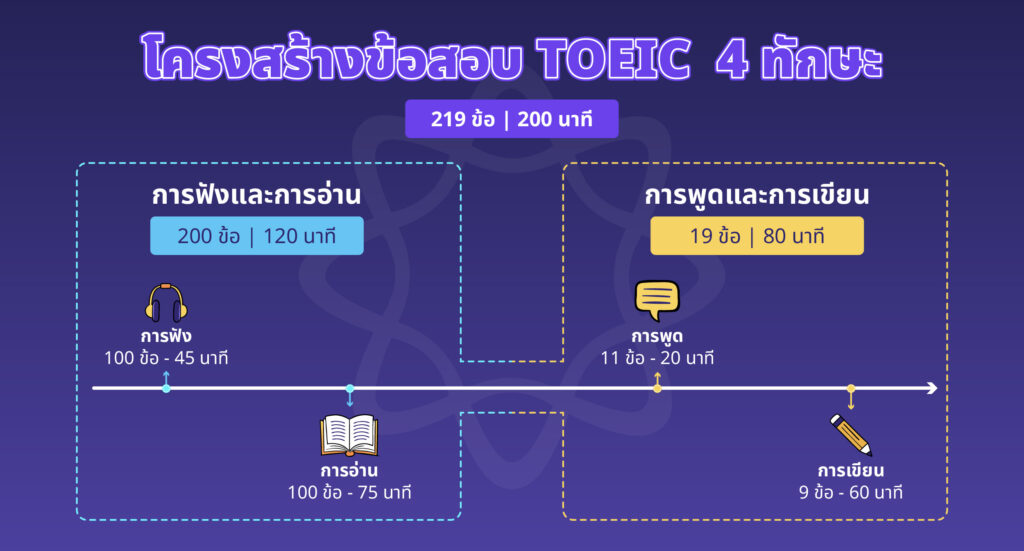
เว็บไซต์ฝึกทำข้อสอบ TOEIC ที่น่าเชื่อถือ
ต่อไปนี้คือเว็บไซต์สำหรับการเตรียมตัวสอบ TOEIC ในปี 2025 ที่คุณสามารถใช้เพื่อพัฒนาทักษะและเตรียมตัวให้พร้อมสำหรับการสอบ:
- Toeic-training.com: เว็บไซต์เตรียมสอบ TOEIC ฟรี ที่มีแบบทดสอบตัวอย่างและคลังคำศัพท์ครบถ้วน เหมาะสำหรับผู้ที่ต้องการเรียนรู้ด้วยตัวเองที่บ้าน
- Opendurian.com: หนึ่งในเว็บไซต์ฝึกสอบที่ดีที่สุดในปัจจุบัน มีแบบทดสอบออนไลน์พร้อมคำตอบที่ช่วยให้ผู้เรียนคุ้นเคยกับโครงสร้างข้อสอบและแก้ไขจุดที่ผิดพลาดได้อย่างตรงจุด
- Canpacificcollege.com: เว็บไซต์ฝึกทำข้อสอบที่เน้นสองทักษะ ได้แก่ Listening และ Reading มีตัวอย่างข้อสอบจริงที่ช่วยเพิ่มความมั่นใจและทักษะในการทำข้อสอบจริง
- 4tests.com: มีแบบทดสอบฟรีหลากหลายประเภทและแบบฝึกหัดเสริมอื่นๆ คุณสามารถเลือกทำข้อสอบที่เน้นแต่ละทักษะเพื่อการฝึกฝนที่ง่ายขึ้น
- Englishclub.com: เว็บไซต์ยอดนิยมสำหรับผู้เรียนภาษาอังกฤษ มีบทเรียน แบบทดสอบตัวอย่าง และทรัพยากรอื่นๆ มากมายที่จะช่วยให้คุณเตรียมสอบ TOEIC ด้วยตัวเอง
- English.best: เช่นเดียวกับเว็บไซต์อื่นๆ English.best มีแบบทดสอบที่เป็นไปตามมาตรฐานพร้อมฟังก์ชั่นที่ใช้งานง่าย นอกจากนี้ยังมีแบบฝึกหัดสำหรับการเตรียมสอบภาษาอังกฤษอื่นๆ เช่น TOEFL และ SAT ด้วย

สรุปแล้ว การเริ่มเตรียมสอบ TOEIC ไม่เคยง่ายเท่านี้มาก่อน ด้วยเคล็ดลับที่มีประสิทธิภาพและแผนการเรียนที่ชัดเจน ไม่ว่าคุณจะมีเวลาเตรียมตัวเพียง 7 วันหรือ 1 เดือน จงมั่นใจในการใช้ทักษะ คำศัพท์ และไวยากรณ์ที่ได้เรียนรู้มาเพื่อพิชิตเป้าหมายของคุณ ดาวน์โหลดแอป ELSA Speak วันนี้ เพื่อฝึกคำศัพท์ ปรับปรุงการออกเสียง และเตรียมตัวสอบ TOEIC 2025 ให้ดีที่สุด!
ในภาษาอังกฤษ finally เป็นคำคุ้นเคยที่ใช้เพื่อแสดงจุดสิ้นสุดหรือความสำเร็จของบางสิ่งหลังจากผ่านไปนาน อย่างไรก็ตาม การใช้คำว่า finally ในบริบทที่เหมาะสมและไม่สับสนกับคำพ้องความหมาย เช่น at last, in the end หรือ at the end จำเป็นต้องมีความเข้าใจที่ชัดเจน มาสำรวจ Finally ใช้ยังไง และวิธีแยกแยะความแตกต่างจากคำพ้องความหมายอื่น ๆ อย่างละเอียดกับ ELSA Speak ในบทความนี้กันนะ!
Finally แปลว่า?
Finally เป็นคำวิเศษณ์ที่หมายถึงความสิ้นสุด ซึ่งมักใช้เรียกเหตุการณ์หรือผลลัพธ์ที่เกิดขึ้นหลังจากพยายามมาหลายครั้งหรือรอคอยมานาน และ finally อ่านว่า /ˈfaɪ.nəl.i/
Finally ตัวอย่างประโยค :
- Finally, we arrived at our destination after hours of travel. (ในที่สุดเราก็มาถึงจุดหมายปลายทางหลังจากเดินทางมาหลายชั่วโมง)
- She finally agreed to the plan. (ในที่สุดเธอก็ตกลงตามแผนการ)

การใช้ finally ในประโยคภาษาอังกฤษ
การเข้าใจความหมายและวิธีการใช้ finally จะช่วยให้คุณใช้คำนี้ได้อย่างถูกต้องในทุกบริบท อย่าลืมดูตัวอย่างประโยคของ finally เพื่อทำความเข้าใจเกี่ยวกับวิธีการใช้ finally ในประโยคภาษาอังกฤษให้ดียิ่งขึ้น
| วิธีใช้ | อธิบาย | ตําแหน่งในประโยค | ตัวอย่าง |
| คำวิเศษณ์บอกเวลา | อธิบายเหตุการณ์ที่เกิดขึ้นหลังจากการรอคอยหรือเอาชนะความยากลำบากมาเป็นเวลานาน | • อยู่หน้าประโยค • อยู่ระหว่างประธานและกริยาหลัก • หลังกริยาช่วยหรือกริยา V to be | • She finally managed to finish the project on time. (ในที่สุดเธอก็สามารถทำโครงการได้เสร็จทันเวลา) • We finally finished the project after weeks of hard work. (ในที่สุดเราก็ทําโครงการนี้สําเร็จหลังจากทำงานหนักมาเป็นเวลาหลายสัปดาห์) • We should finally be able to take a break after finishing this project. (ในที่สุดเราก็สามารถพักผ่อนได้หลังจากทําโครงการนี้เสร็จ) |
| ให้ข้อโต้แย้งหรือความคิดเห็นขั้นสุดท้าย | เน้นข้อคิดสุดท้ายในการโต้แย้ง | มักจะอยู่หน้าประโยค | • Finally, I want to emphasize the importance of teamwork. (สุดท้ายนี้ ผมอยากจะเน้นย้ำถึงความสำคัญของการทำงานเป็นทีม) • Finally, we need to confirm the budget for this event. (สุดท้ายคือเราจะต้องยืนยันงบประมาณสำหรับกิจกรรมนี้) |
| คล้ายกับ at last เราจะใช้ finally เพื่อแนะนำตัวอย่างสุดท้ายในการเสนอแนะ | At last มักมีน้ำเสียงทางอารมณ์และใช้เป็นประโยคอุทาน แต่ finally ก็ใช้ในลักษณะที่เป็นกลางมากกว่าโดยไม่เน้นอารมณ์ | โดยปกติจะอยู่หน้าประโยคเพื่อเน้นข้อความสุดท้ายหลังจากพูดถึงข้อคิดแล้ว | • Firstly, review the project goals. Secondly, assign tasks to the team. Finally, implement the plan effectively. (ขั้นแรก ให้ทบทวนเป้าหมายของโครงการ ขั้นที่สอง ให้มอบหมายงานให้กับทีม และสุดท้าย ให้ปฏิบัติตามแผนอย่างมีประสิทธิภาพ) • Firstly, we’ll discuss the agenda. Secondly, we’ll review last week’s performance. Finally, we’ll plan for next week. (อย่างแรกเลย เราจะหารือเกี่ยวกับวาระการประชุม อย่างที่สอง เราจะทบทวนผลงานของสัปดาห์ที่แล้ว และสุดท้าย เราจะวางแผนสำหรับสัปดาห์หน้า) |
| Finally ใช้เมื่อมีคนรอนานเกินไปที่จะได้บางสิ่งบางอย่าง | ใช้เน้นระยะเวลาที่ใช้ในการรอเพื่อให้บรรลุเป้าหมาย/บางสิ่งบางอย่าง | มักจะอยู่กลางประโยค | • After waiting for hours in line, we finally got our tickets. (หลังจากรอคิวนานหลายชั่วโมง ในที่สุดเราก็ได้ตั๋วแล้ว) • She had been trying to get the promotion for years, and finally, she was offered the position. (เธอพยายามขอเลื่อนตำแหน่งมาหลายปีและในที่สุดเธอก็ได้รับตำแหน่งนั้น) |
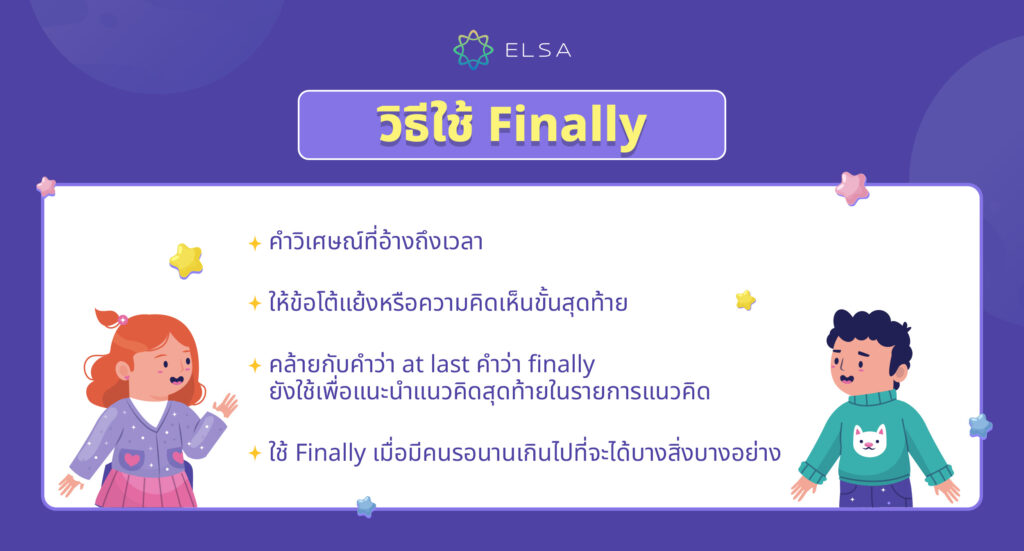
คำพ้องความหมายกับ Finally
เมื่อใช้ finally คุณสามารถแทน finally ด้วยคำพ้องความหมายอื่น ๆ ขึ้นอยู่กับบริบท
| คําศัพท์ | การออกเสียง | ความหมาย | ตัวอย่าง |
| Ultimately | /ˈʌltəmətli/ | ท้ายที่สุด | Ultimately, the decision lies with the board of directors. (ท้ายที่สุดแล้วการตัดสินใจก็ขึ้นอยู่กับคณะกรรมการบริหาร) |
| At last | /æt læst/ | ในที่สุดหลังจากผ่านไปนาน | At last, we arrived at our destination after a long journey. (ในที่สุดเราก็มาถึงจุดหมายปลายทางหลังจากการเดินทางอันยาวนาน) |
| In the end | /ɪn ði ɛnd/ | ในที่สุดเมื่อทุกอย่างจบลงแล้ว | In the end, everything worked out as planned. (ในที่สุดทุกอย่างก็ไปตามแผน) |
| Lastly | /ˈlæstli/ | สุดท้ายนี้ | Lastly, we will cover the upcoming changes. (สุดท้ายนี้เราจะครอบคลุมถึงการเปลี่ยนแปลงที่กำลังจะเกิดขึ้น) |
| Eventually | /ɪˈvɛntʃuəli/ | ในที่สุดหลังจากผ่านไปนาน | Eventually, they solved the issue after weeks of discussion. (ในที่สุดพวกเขาก็สามารถแก้ไขปัญหาได้หลังจากการหารือเป็นเวลาหลายสัปดาห์) |
| When all is said and done | /wɛn ɔːl ɪz sɛd ənd dʌn/ | ในที่สุดเมื่อทุกอย่างเสร็จสิ้น | When all is said and done, we made the right choice. (เมื่อพิจารณาทุก ๆ อย่างแล้ว เราก็ได้ตัดสินใจอย่างถูกต้อง) |
คำเหล่านี้มักใช้สลับกันได้ แต่คุณต้องใส่ใจกับบริบทเพื่อเลือกคำที่เหมาะสม โดยเฉพาะอย่างยิ่งเมื่อต้องแสดงจุดจบหลังจากการรอคอยหรือความพยายามเป็นเวลานาน

แยกแยะระหว่าง Finally กับ Eventually
แม้ว่าทั้ง finally และ eventually จะหมายถึงในที่สุด แต่ก็มีความแตกต่างในวิธีการใช้:
| คําศัพท์ | ความหมาย | วิธีใช้ | ตัวอย่าง |
| Finally | หมายถึงผลลัพธ์สุดท้ายหรือตอนสุดท้ายหลังจากเหตุการณ์หรือการกระทำต่าง ๆ | ใช้เมื่อสิ้นสุดของการกระทำ โดยเน้นผลลัพธ์สุดท้าย | Finally, we completed the project. (ในที่สุดเราก็ทำโครงการนี้สำเร็จแล้ว) |
| Eventually | แสดงถึงผลลัพธ์ที่จะเกิดขึ้นได้หลังจากระยะเวลาอันยาวนานหรือหลังจากเหตุการณ์ต่าง ๆ เกิดขึ้น | มักใช้เมื่อต้องรอนานหรือเมื่อผลลัพธ์เกิดขึ้นหลังจากระยะเวลานาน ไม่ใช่ทันที | Eventually, she became successful after years of hard work. (ในที่สุดเธอก็ประสบความสำเร็จหลังจากทำงานหนักมาหลายปี) |
ความแตกต่างส่วนใหญ่อยู่ที่ความแตกต่างของเวลา: finally จะเน้นไปที่ผลลัพธ์ที่เกิดขึ้นทันทีหลังจากเหตุการณ์ต่าง ๆ มากมาย ในขณะที่ eventually หมายถึงกระบวนการที่ยาวนานซึ่งนำไปสู่ผลลัพธ์
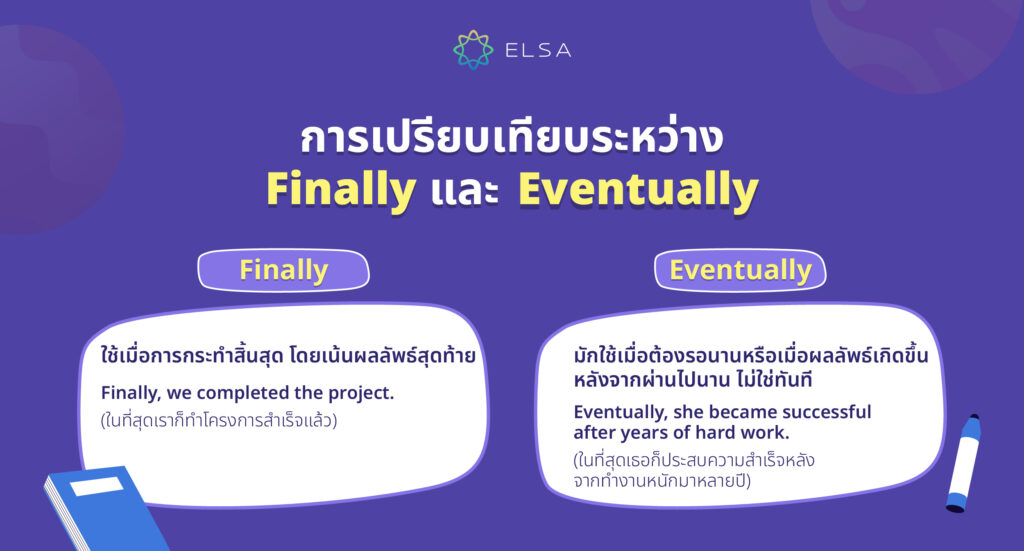
แยกแยะระหว่าง finally, lastly, at last, in the end กับ at the end ในภาษาอังกฤษ
การทำความเข้าใจความแตกต่างระหว่าง finally, lastly, at last, in the end กับ at the end จะช่วยให้คุณใช้คำเหล่านี้ในการสื่อสารและการเขียนภาษาอังกฤษได้แม่นยำยิ่งขึ้น
| คํา/วลี | ความหมาย | วิธีใช้หลัก | ตัวอย่าง |
| Finally | แสดงถึงผลลัพธ์หรือการกระทําสุดท้ายหลังจากเหตุการณ์ต่าง ๆ ที่เกิดขึ้นอย่างต่อเนื่องกัน สามารถบอกทั้งเวลาและข้อสรุป | • ใช้ในประโยคที่เน้นผลลัพธ์หรือข้อสรุป • อยู่หน้า ท้าย หรือกลางประโยค | • Finally, the project is complete. (ในที่สุดโครงการก็เสร็จสมบูรณ์แล้ว) We finally understood the problem. (ในที่สุดเราก็เข้าใจปัญหาแล้ว) • After all the struggles, I finished the project, finally. (หลังจากผ่านอุปสรรคต่าง ๆ มามากมาย ในที่สุดฉันก็สามารถทำโครงการนี้สำเร็จได้) |
| Lastly | ใช้เพื่อแสดงหรือแนะนำข้อคิดสุดท้ายในประโยคหรือสุนทรพจน์โดยไม่มีความหมายของเวลา | อยู่หน้าประโยคเมื่อแสดงข้อคิดสุดท้ายในข้อโต้แย้งหรือประโยค | • Lastly, don’t forget to submit your report. (สุดท้ายนี้ อย่าลืมส่งรายงานของคุณด้วย) • Lastly, let me remind you to check the details before submitting the application. (สุดท้ายนี้ ผมขอเตือนคุณว่าอย่าลืมตรวจสอบรายละเอียดก่อนส่งใบสมัคร) |
| At last | เป็นวลีที่ใช้บ่งบอกถึงความล่าช้าเป็นเวลานานที่ทำให้ความอดทนหมดลง เน้นความไม่อดทน หรือรู้สึกรำคาญกับความล่าช้า | ตำแหน่งในประโยคอยู่ระหว่างประธานและกริยาหลัก หลังกริยาช่วย หรือหลังกริยา to be นอกจากนี้ at last สามารถอยู่หน้าหรือท้ายประโยคก็ได้ | • At last, she has passed the exam. (ในที่สุดเธอก็สอบผ่านแล้ว) Ploy has at last paid off the debt she borrowed from me two years ago. (ในที่สุด พลอยก็ได้ชำระหนี้ที่เธอยืมมาจากฉันเมื่อสองปีก่อนหมดแล้ว) • After many attempts, they succeeded at last. (ในที่สุด พวกเขาก็ประสบความสำเร็จหลังจากพยายามหลายครั้ง) |
| In the end | เป็นการแสดงออกถึงผลลัพธ์สุดท้ายของเหตุการณ์หรือการกระทำ หลังจากมีตัวเลือกหรือข้อโต้แย้งมากมาย | โดยปกติจะอยู่หน้าของประโยค จะมีจุดหรือลูกน้ำแล้วตามด้วยลูกน้ำ | In the end, they decided to leave the city. (สุดท้ายนี้ พวกเขาก็ตัดสินใจออกจากเมือง) He didn’t get the job in the end. (สุดท้ายนี้ เขาก็ไม่ได้งานนั้น) |
| At the end | หมายถึงจุดสิ้นสุดที่เฉพาะเจาะจงในเวลาหรืออวกาศ ไม่ใช่ข้อสรุปเหมือนในตอนท้าย | • มักมาพร้อมกับตัวปรับแต่ง เช่น of the road หรือ of the movie. • อยู่กลางหรือท้ายประโยค | • At the end of the street, there is a park. (สุดถนนนี้มีสวนสาธารณะ) • The hero appears at the end of the film. (พระเอกปรากฏตัวในช่วงท้ายของภาพยนตร์) |
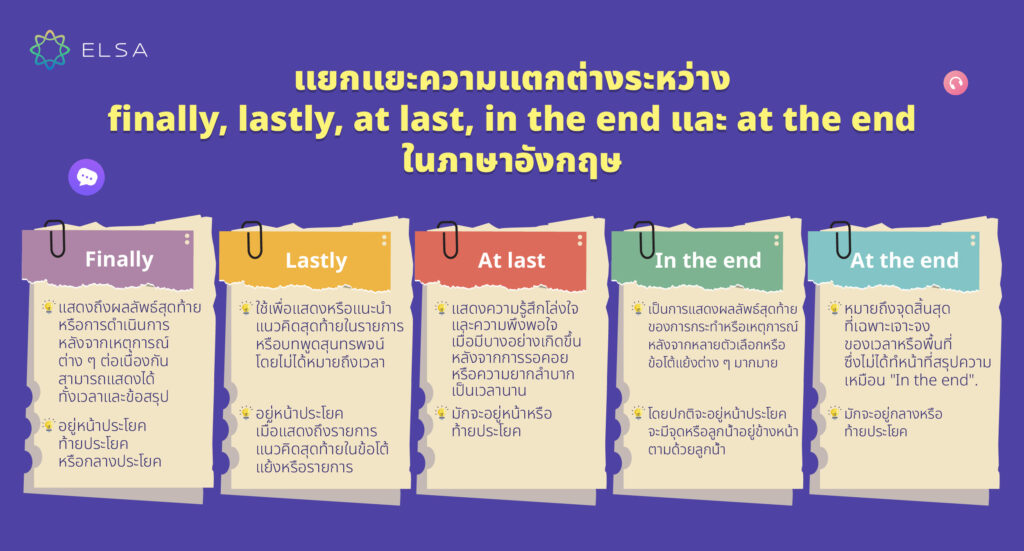
แบบฝึกหัดแยกแยะระหว่าง finally, lastly, at last, in the end กับ at the end
จงเลือกคำ/วลีที่เหมาะสมที่สุดและเติมลงในช่องว่าง
- ______, we managed to finish the report before the deadline.
- We met ______ after ten years of living in different cities.
- ______, I want to thank everyone who contributed to the success.
- ______ of the street, you will see a beautiful garden.
- ______, they decided to cancel the trip due to bad weather.
- The movie was so exciting, especially ______ when the twist was revealed.
- ______, he apologized for his behavior, and they made peace.
- The presentation was divided into several parts, and ______, we summarized the key points.
- ______, she was able to achieve her dream of becoming a doctor.
- I thought they would argue forever, but ______, they came to an agreement.
เฉลย
| เฉลย | อธิบาย |
| 1. Finally | ใช้เพื่ออ้างถึงผลลัพธ์สุดท้ายที่ได้รับหลังจากกระบวนการที่ยาวนาน ในประโยคที่ 1 เน้นความสมบูรณ์ของประโยค |
| 2. At last | การแสดงความรู้สึกโล่งใจเมื่อเหตุการณ์เกิดขึ้นหลังจากรอมานาน เช่น คนสองคนได้พบกันอีกครั้งหลังจาก 10 ปี |
| 3. Lastly | ใช้เพื่อแสดข้อคิดเห็นสุดท้ายในสุนทรพจน์ ข้อคิดนี้อยู่ท้ายรายการคําขอบคุณ |
| 4. At the end | หมายถึงสถานที่สุดท้ายที่เฉพาะเจาะจง อาจหมายถึง “จุดสิ้นสุดของถนน” |
| 5. In the end | ใช้เพื่ออ้างถึงผลลัพธ์สุดท้ายหลังจากกระบวนการพิจารณาหรือโต้แย้ง ทําให้เกิดผลลัพธ์คือการยกเลิกการเดินทาง |
| 6. At the end | อ้างถึงช่วงเวลาที่ได้กําหนด ซึ่งในที่นี้หมายถึงจุดสิ้นสุดของหนัง |
| 7. Finally | เน้นย้ำว่าการขอโทษถือเป็นการกระทำสุดท้ายหลังจากการถกเถียงกันมากมาย |
| 8. Lastly | ใช้เพื่อแสดงประเด็นสุดท้ายในการนำเสนอและเพื่อสรุปประเด็นหลัก |
| 9. At last | แสดงความรู้สึกพึงพอใจเมื่อบรรลุความฝันในการเป็นหมอ |
| 10. In the end | สรุปมติหลังการอภิปราย |

คําถามที่พบบ่อย
ในกระบวนการเรียนภาษาอังกฤษ คุณอาจประสบปัญหาในการแยกแยะคำที่มีความหมายคล้ายกัน เช่น finally, at last, in the end และ at the end แต่ละคำก็มีวิธีการใช้งานของตัวเองที่เหมาะกับแต่ละบริบทเฉพาะ ด้านล่างนี้คือคำถามทั่วไปเกี่ยวกับการใช้คำเหล่านี้ ซึ่งจะช่วยให้คุณเข้าใจได้ดีขึ้น และใช้คำเหล่านี้อย่างถูกต้องในการสื่อสารและการเขียนมากขึ้น
Finally ใช้ใน tense ไหนได้บ้าง
Finally สามารถใช้ได้กับหลายกาล ขึ้นอยู่กับบริบทของประโยค ที่พบบ่อยที่สุดคือ:
ปัจจุบันกาลสมบูรณ์: อธิบายถึงผลลัพธ์ที่ได้รับหลังจากกระบวนการอันยาวนาน
- ตัวอย่าง: I have finally finished my homework. (ในที่สุดฉันก็ทำการบ้านเสร็จแล้ว)
อดีตกาล: เน้นผลลัพธ์ในอดีต
- ตัวอย่าง: We finally arrived at the station. (ในที่สุดเราก็มาถึงสถานีแล้ว)
อนาคตกาล: เป็นการแสดงออกถึงผลลัพธ์ที่คาดว่าจะเกิดขึ้น
- ตัวอย่าง: I will finally achieve my goal next year. (ในที่สุดฉันก็จะบรรลุเป้าหมายของฉันในปีหน้า)
>>> Read more: 12 tense ในภาษาอังกฤษ: โครงสร้าง หลักการใช้ และสัญญาณการรับรู้
Finally กับ at last ต่างกันอย่างไร
Finally: เน้นผลลัพธ์หลังจากกระบวนการหรือเหตุการณ์ มักจะวัตถุวิสัยโดยไม่มีอารมณ์
- ตัวอย่าง: She finally agreed to the proposal. (ในที่สุดเธอก็ตกลงตามข้อเสนอนี้)
At last: การแสดงความรู้สึกโล่งใจหรืออารมณ์เชิงบวกหลังจากรอมานาน
- ตัวอย่าง: At last, the rain has stopped! (ในที่สุดฝนก็หยุดตกแล้ว!)
โดยทั่วไปแล้ว finally เหมาะกับบริบทที่เป็นทางการมากกว่า ในขณะ at last ก็สื่อถึงความรู้สึกส่วนตัวที่ชัดเจน
Finally ใช้กับทางการหรือไม่
Finally มักใช้ในบริบททั้งที่เป็นทางการและไม่เป็นทางการ อย่างไรก็ตาม เมื่อใช้เพื่อแสดงรายการหรือจบสุนทรพจน์ finally จะมีความเป็นทางการมากขึ้น
Finally vs in the end ต่างกันยังไง
Finally: เน้นย้ำถึงผลลัพธ์สุดท้ายที่ได้รับ สามารถใช้ได้กับทุกกาลและเป็นการยืนยัน
- ตัวอย่าง: She finally finished the marathon. (ในที่สุดเธอก็วิ่งมาราธอนเสร็จ)
In the end: อธิบายผลลัพธ์โดยรวมหลังจากพิจารณาหรือผ่านเหตุการณ์ต่าง ๆ มากมาย
- ตัวอย่าง: In the end, they decided to move to another city. (ในที่สุดพวกเขาก็ตัดสินใจย้ายไปยังเมืองอื่น)
สรุปแล้ว finally แล้วมุ่งเน้นไปที่การกระทำที่เฉพาะเจาะจง ในขณะที่ in the end จะมุ่งเน้นไปที่ผลลัพธ์หรือการตัดสินใจทั่วไป
Finally ใช้เดี่ยวๆได้มั้ย
finally สามารถใช้ finally แบบเดี่ยว ๆ ได้ในบางสถานการณ์ แต่มักจะตามด้วยประโยคเต็ม เมื่อยืนอยู่เดี่ยวๆ finally มักใช้เพื่อแสดงถึงความสมบูรณ์หรือการสิ้นสุดหลังจากการรอคอยมาเป็นเวลานาน
- ตัวอย่าง: Finally! (ในที่สุด!)
Finally I got it ใช้ยังไง
Finally i got it แปลว่า ในที่สุดฉันก็เข้าใจแล้ว หรือประสบความสำเร็จในบางสิ่งบางอย่างหลังจากพยายามมาเป็นเวลานาน
- ตัวอย่าง: After hours of studying, finally, I got it! (หลังจากเรียนมาหลายชั่วโมง ในที่สุดฉันก็เข้าใจแล้ว!)
Finally done แปลว่า
Finally done หมายถึง การทำงานหรือภารกิจเสร็จหลังจากเวลาอันยาวนาน
- ตัวอย่าง: I’ve been working on this project all day, and I’m finally done! (ฉันทำงานกับโครงการนี้ตลอดทั้งวัน และในที่สุดฉันก็เสร็จแล้ว!)
การทำความเข้าใจ Finally ใช้ยังไง อย่างถูกต้องจะช่วยให้คุณสื่อสารภาษาอังกฤษได้อย่างมีประสิทธิภาพมากขึ้น บทความนี้ได้นําความรู้พื้นฐานเกี่ยวกับคำว่า finally และแยกความแตกต่างจากคำพ้องความหมาย เช่น lastly, at last, in the end และ at the end ELSA Speak หวังว่าข้อมูลนี้จะช่วยให้คุณเลือกคำที่เหมาะสมไปใช้ในแต่ละบริบทได้ซึ่งจะทำให้การใช้ภาษาอังกฤษของคุณดีขึ้น
ซักผ้า ภาษาอังกฤษ เป็นวลีที่ขาดไม่ได้เมื่อต้องการสื่อสารหรือใช้บริการซักรีดในต่างประเทศ คำศัพท์เกี่ยวกับการซักผ้าไม่เพียงช่วยให้คุณเข้าใจและถ่ายทอดความคิดได้อย่างถูกต้อง แต่ยังช่วยให้คุณมีความมั่นใจเมื่อใช้ภาษานี้ในชีวิตประจำวัน ELSA Speak จะนำมาคำศัพท์ วลี และตัวอย่างประโยคทั่วไปในหัวข้อการซักผ้าเพื่อช่วยให้คุณใช้ภาษาอังกฤษได้ง่ายขึ้น เรามาดูด้วยกันนะ
ซักผ้า ภาษาอังกฤษคืออะไร?
ซักผ้า ภาษาอังกฤษคือ laundry ใช้เพื่ออ้างถึงกิจกรรมการซักและอบผ้า คำนี้ไม่เพียงแต่อธิบายขั้นตอนการซักเสื้อผ้าเท่านั้น แต่ยังพูดถึงบริการซักรีดที่ร้านค้าหรือบริการอัตโนมัติอีกด้วย นอกจากนั้น วลี washing clothes ยังใช้เมื่อบอกถึงการซักเสื้อผ้าเพียงอย่างเดียว
ซักผ้าในภาษาอังกฤษคําอ่านอย่างไร?
- Laundry: /ˈlɔːn.dri/ หรือ /ˈlɑːn.dri/
- Washing clothes: /ˈwɒʃɪŋ kləʊðz/ (อังกฤษ-บริติช) หรือ /ˈwɑːʃɪŋ kloʊðz/ (อังกฤษ-อเมริกา)
ตัวอย่าง:
- I need to do the laundry this afternoon. (ฉันต้องซักผ้าตอนบ่ายนี้)
- She went to the laundry to pick up her clothes. (เขาไปร้านซักผ้าเพื่อเอาเสื้อผ้าของเขากลับ)
- She is washing clothes in the bathroom. (เขากำลังซักผ้าอยู่ในห้องน้ำ)
คำว่า laundry เป็นคำที่ใช้บ่อยและเข้าใจง่ายที่สุดเมื่อคุณต้องการพูดถึงการซักผ้าหรือตากผ้าเป็นภาษาอังกฤษ

คำศัพท์เกี่ยวกับการซักผ้า ภาษาอังกฤษ
การเรียนรู้คำศัพท์ภาษาอังกฤษเกี่ยวกับการซักรีดช่วยให้คุณสื่อสารและใช้อุปกรณ์ซักรีดได้ง่ายขึ้น ด้านล่างนี้เป็นคำศัพท์พื้นฐานที่คุณต้องรู้
| คำศัพท์ | ถอดเสียง | แปล | ตัวอย่าง |
| Washing machine | /ˈwɒʃɪŋ məˈʃiːn/ | เครื่องซักผ้า | The washing machine is not working. (เครื่องซักผ้าไม่ทำงาน) |
| Dryer | /ˈdraɪər/ | เครื่องอบผ้า | I need to put my clothes in the dryer. (ฉันต้องเอาเสื้อผ้าเข้าเครื่องอบผ้า) |
| Iron | /ˈaɪən/ | (N)เครื่องรีดผ้า, (V) รีดเสื้อผ้า | I need to iron my shirt. (ฉันต้องรีดเสื้อของฉัน) |
| Spin | /spɪn/ | ปั่น, กรอ, บิด | Spin the clothes before hanging them to dry. (บิดเสื้อผ้าก่อนนำไปตากให้แห้ง) |
| Ironing board | /ˈaɪənɪŋ bɔːd/ | โต๊ะรีดผ้า | She put the shirt on the ironing board. (เขาวางเสื้อไว้บนโต๊ะรีดผ้า) |
| Clothes peg | /kləʊðz pɛɡ/ | ไม้หนีบผ้า (UK) | Use a clothes peg to hang the clothes. (ใช้ไม้หนีบผ้าเพื่อหนีบเสื้อผ้า) |
| Clothespin | /ˈkləʊðspɪn/ | ไม้หนีบผ้า(USA) | The clothespins are on the shelf. (ไม้หนีบผ้าอยู่บนชั้นวาง) |
| Detergent | /dɪˈtɜːdʒənt/ | ผงซักฟอก | I bought some new detergent today. (วันนี้ฉันซื้อผงซักฟอกใหม่) |
| Fabric softener | /ˈfæbrɪk ˈsɒftənər/ | น้ำยาปรับผ้านุ่ม | Fabric softener makes your clothes feel soft.(น้ำยาปรับผ้านุ่มช่วยให้เสื้อผ้านุ่ม) |
| Bleach | /bliːʧ/ | น้ำยาฟอกขาว | She used bleach to clean the towels. (เขาใส่น้ำยาฟอกขาวเพื่อทำความสะอาดผ้าเช็ดตัว) |
| Rinse | /rɪns/ | ล้างออก | I need to rinse these clothes. (ฉันต้องล้างเสื้อผ้าพวกนี้) |
| Spin cycle | /spɪn ˈsaɪkl/ | โหมดปั่นผ้าของเครื่องซักผ้า | Set the washing machine to the spin cycle. (ตั้งค่าเครื่องซักผ้าเป็นโหมดปั่นหมาด) |
| Hand wash | /hænd wɒʃ/ | ซักมือ | I have to hand wash this delicate fabric. (ฉันต้องซักผ้าบอบบางนี้ด้วยมือ) |
| Wash load | /wɒʃ ləʊd/ | จำนวนผ้าที่ซัก | This is my third wash load of the day. (นี่เป็นการซักครั้งที่สามของฉันในวันนี้) |
| Wash and wear | /wɒʃ ənd wɛər/ | ซักและใส่ทันที ไม่ต้องรีด | This shirt is wash and wear. (เสื้อตัวนี้สามารถสวมใส่ได้ทันทีหลังซักโดยไม่ต้องรีด) |
| Tumble dry | /ˈtʌmbəl draɪ/ | อบแห้งในเครื่องอบผ้า | Make sure to tumble dry the clothes. (อย่าลืมอบแห้งผ้าในเครื่องอบผ้า) |
| Dry cleaning | /ˈdraɪ ˈkliːnɪŋ/ | การซักแห้ง | I need to take my suit to the dry cleaners. (ฉันต้องเอาชุดสูทไปซักแห้ง) |
| Wash cycle | /wɒʃ ˈsaɪkl/ | โหมดซักผ้าของเครื่องซักผ้า | The wash cycle lasts for 45 minutes. (รอบการซักใช้เวลานาน 45 นาที) |
| Laundry detergent | /ˈlɔːndri dɪˈtɜːdʒənt/ | ผงซักฟอกน้ำยาซักผ้า | I prefer using liquid laundry detergent. (ฉันชอบใช้น้ำยาซักผ้าแทนผงซักฟอก) |
| Stain remover | /steɪn rɪˈmuːvər/ | น้ำยาขจัดคราบ | Use the stain remover for this shirt. (ใช้น้ำยาขจัดคราบสำหรับเสื้อตัวนี้) |
| Launder | /ˈlɔːndər/ | ซัก (ด้วยความหมายของการขจัดคราบและล้างให้สะอาด) | I launder my clothes every week. (ฉันซักเสื้อผ้าทุกสัปดาห์) |
| Softener | /ˈsɒftənər/ | น้ำยาปรับผ้านุ่ม | Add fabric softener for a fresh scent. (เติมน้ำยาปรับผ้านุ่มให้กลิ่นหอม) |
| Drying rack | /ˈdraɪɪŋ ræk/ | ราวตากผ้า | I put the laundry on the drying rack. (ฉันวางผ้าไว้บนราวตากผ้า) |
| Laundry basket/ hamper | /ˈlɔːndri ˈbɑːskɪt/ ˈhæmpər/ | ตะกร้าซักผ้า | The laundry basket is full. (ตะกร้าซักผ้าเต็มแล้ว) |
| Delicate fabric | /ˈdɛlɪkət ˈfæbrɪk/ | ผ้าบอบบาง ผ้าเสียหายง่าย | You should wash delicate fabrics separately. (คุณควรซักผ้าเนื้อบอบบางแยกต่างหาก) |
| Hanger | /ˈhæŋər/ | ไม้แขวนเสื้อ | Hang your clothes on the hanger after washing. (แขวนเสื้อผ้าบนไม้แขวนเสื้อหลังซัก) |
| Wall hooks | /wɔːl hʊks/ | ตะขอแขวนผนัง | You can use wall hooks to hang your jackets. (คุณสามารถใช้ตะขอแขวนผนังเพื่อแขวนเสื้อโค้ทได้) |
| Soak | /səʊk/ | แช่เสื้อผ้าในน้ำ | Soak the clothes in water for an hour before washing. (แช่ผ้าในน้ำประมาณหนึ่งชั่วโมงก่อนซัก) |
| Overflow rinse | /ˈəʊvərfləʊ rɪns/ | การล้างน้ำส่วนเกิน | The washing machine has an overflow rinse cycle. (เครื่องซักผ้ามีรอบการล้างน้ำส่วนเกิน) |
| Dirty | /ˈdɜːrti/ | สกปรก | The clothes are dirty and need washing. (เสื้อผ้าสกปรกและจำเป็นต้องซัก) |
| Stain | /steɪn/ | คราบรอยเปื้อน | This shirt has a stain on it. (เสื้อตัวนี้มีรอยเปื้อน) |
| Mould | /moʊld/ | รา | The clothes were left damp and developed mould. (เสื้อผ้าจะชื้นและขึ้นรา) |
| Load the washer | /ləʊd ðə ˈwɒʃər/ | ใส่เสื้อผ้าลงในเครื่องซักผ้า | I will load the washer with my dirty clothes. (ฉันจะนำเสื้อผ้าสกปรกไปใส่ในเครื่องซักผ้า) |
| Unload | /ʌnˈləʊd/ | นำสิ่งของออกจากเครื่องซักผ้า | After the wash cycle is done, unload the clothes. (หลังจากรอบการซักเสร็จสิ้น ให้เอาเสื้อผ้าออก) |
| Fold | /fəʊld/ | พับเสื้อผ้า | Please fold the clothes neatly after drying. (กรุณาพับเสื้อผ้าให้เรียบร้อยหลังจากการอบแห้ง) |
| Sort | /sɔːrt/ | คัดแยกเสื้อผ้า | Sort the clothes by color before washing. (คัดแยกเสื้อผ้าตามสีก่อนซัก) |
การทำความเข้าใจและการใช้คำศัพท์กับการซักผ้าภาษาอังกฤษอย่างคล่องแคล่วจะช่วยให้คุณมั่นใจในสถานการณ์จริงมากขึ้น

ประโยคภาษาอังกฤษเมื่อใช้บริการซักอบรีด
การซักเสื้อผ้าไม่ใช่แค่งานบ้านเท่านั้น แต่ยังเกี่ยวข้องกับสถานการณ์การสื่อสารในชีวิตประจำวันอีกด้วย ด้านล่างนี้คือรูปแบบประโยคภาษาอังกฤษที่ใช้กันทั่วไปในการขอใช้บริการซักรีดในสถานการณ์ต่างๆ
ขอใช้บริการซักผ้าคือ

เมื่อคุณต้องการขอใช้บริการซักรีด การใช้คำถามหรือการร้องขอที่ชัดเจนจะทำให้การสื่อสารง่ายขึ้น
| ตัวอย่างประโยค | แปล |
| Can you help me with the laundry? | คุณช่วยฉันซักผ้าได้ไหม |
| I’d like to have my clothes washed. | ฉันต้องการที่จะซักเสื้อผ้าของฉัน |
| How much is it to wash a shirt? | ซักเสื้อเชิ้ตราคาเท่าไหร่คะ? |
| Do you offer dry cleaning services? | คุณมีบริการซักแห้งหรือไม่คะ |
| Can you wash this in cold water? | คุณสามารถซักสิ่งนี้ด้วยน้ำเย็นได้หรือไม่คะ? |

ถามเรื่องเวลาที่จะซักผ้าเสร็จ
เมื่อใช้บริการซักรีด คุณอาจต้องการทราบเวลาเสร็จเพื่อจัดระเบียบงานของคุณ
| ตัวอย่างประโยค | แปล |
| How long will it take to wash my clothes? | จะใช้เวลานานแค่ไหนในการซักผ้าของฉัน? |
| When will my laundry be ready? | เสืื้อผ้าของฉันจะซักเสร็จเมื่อไหร่? |
| Can I get it done by tomorrow? | ฉันสามารถมารับภายในพรุ่งนี้ได้ไหม? |
| How soon can you finish the laundry? | คุณจะซักผ้าเสร็จได้เมื่อไหร่? |
| Is same-day service available? | มีบริการในวันเดียวกันไหม? |

ชำระค่าบริการซักผ้า
เมื่อชำระค่าบริการซักรีด คุณจะต้องรู้วิธีสอบถามราคาและวิธีการชำระเงิน
| ตัวอย่างประโยค | แปล |
| How much do I owe you for the laundry? | ฉันต้องจ่ายเท่าไหร่สำหรับการซักผ้านี้? |
| Do you accept credit cards? | คุณรับบัตรเครดิตไหม? |
| Can I pay with cash? | ฉันสามารถจ่ายเป็นเงินสดได้ไหม? |
| What’s the total charge for my laundry? | ค่าบริการซักผ้าของฉันทั้งหมดเท่าไหร่? |
| Is there an extra charge for dry cleaning? | มีค่าบริการเพิ่มเติมสำหรับการซักแห้งหรือเปล่า? |
ตัวอย่างบทสนทนาเกี่ยวกับหัวข้อซักผ้า ภาษาอังกฤษ

ด้านล่างนี้คือตัวอย่างบทสนทนาภาษาอังกฤษเกี่ยวกับหัวข้อการซักผ้า ช่วยให้คุณเข้าใจวิธีใช้ตัวอย่างประโยคในสถานการณ์จริงได้อย่างง่ายดาย
| ตัวอย่าง | แปล |
| ลูกค้า: Hi, I need to get my clothes washed. How long will it take? | สวัสดีค่ะ ฉันต้องการซักผ้า จะใช้เวลานานแค่ไหนคะ? |
| พนักงาน: Hello! It will take about 2 hours for regular laundry. If you need dry cleaning, it will take longer, about 3 hours. | สวัสดีค่ะ การซักผ้าปกติจะใช้เวลาประมาณ 2 ชั่วโมง ถ้าต้องการซักแห้งจะใช้เวลานานกว่านั้น ประมาณ 3 ชั่วโมงค่ะ |
| ลูกค้า: That’s fine. How much will it cost to wash a shirt and a pair of pants? | โอเคค่ะ แล้วซักเสื้อเชิ้ตหนึ่งตัวและกางเกงหนึ่งตัวจะราคาเท่าไหร่คะ |
| พนักงาน: It will cost $10 for the shirt and $12 for the pants. | การซักเสื้อเชิ้ตจะราคา 10 ดอลลาร์ และการซักกางเกงจะราคา 12 ดอลลาร์ |
| ลูกค้า: Okay, I’ll get them washed. Can I pay with a credit card? | โอเคค่ะ ฉันจะให้ซักผ้า ฉันสามารถจ่ายด้วยบัตรเครดิตได้ไหมคะ |
| พนักงาน: Yes, we accept credit cards. You can pay when you pick up your clothes. | ได้ค่ะ เรารับบัตรเครดิต คุณสามารถจ่ายเมื่อมารับผ้าค่ะ |
| ลูกค้า: Great! Thank you. | เยี่ยมเลยค่ะ ขอบคุณค่ะ |
บทสนทนานี้จำลองสถานการณ์การสื่อสารที่แท้จริงเมื่อคุณขอซักรีดและชำระเงินที่ร้านซักรีด ซึ่งมีประโยชน์มากเมื่อคุณต้องการใช้ภาษาอังกฤษในสภาพแวดล้อมนี้

คำถามที่พบบ่อย
ด้านล่างนี้เป็นคำถามที่เกี่ยวข้องกับหัวข้อการซักผ้าและการรีดผ้าในภาษาอังกฤษพร้อมวิธีใช้และตัวอย่าง
ซักผ้าด้วยเครื่องซักผ้า ภาษาอังกฤษ
ซักผ้าด้วยเครื่องซักผ้า ภาษาอังกฤษคือ wash clothes in a washing machine วลีนี้ใช้เมื่อคุณต้องการพูดถึงการซักผ้าโดยใช้อุปกรณ์อัตโนมัติ
ตัวอย่าง: I always wash clothes in a washing machine because it’s convenient. (ฉันมักจะซักผ้าในเครื่องซักผ้าเพราะมันสะดวก)
ร้านซักผ้า ภาษาอังกฤษ
ร้านซักผ้าในภาษาอังกฤษได้เรียกว่า laundry shop หรือ laundromat ถ้าเป็นสถานที่บริการตนเอง
ตัวอย่าง: There’s a laundry shop near my house where I take my clothes every week. (มีร้านซักผ้าใกล้บ้านของฉันที่ฉันเอาผ้าไปซักทุกสัปดาห์)
รีดผ้า ภาษาอังกฤษ
รีดผ้าในภาษาอังกฤษคือ iron clothes วลีนี้อธิบายการรีดเสื้อผ้าให้เรียบด้วยเตารีด
ตัวอย่าง: He always irons his clothes before going to work. (เขามักรีดเสื้อผ้าก่อนที่จะไปทำงาน)
หวังว่าบทความนี้จะช่วยคุณเข้าใจมากขึ้นเกี่ยวกับการ ซักผ้า ภาษาอังกฤษ พร้อมกับคำศัพท์และตัวอย่างประโยคทั่วไป เพื่อพัฒนาทักษะการสื่อสารภาษาอังกฤษของคุณ คุณสามารถศึกษาและฝึกฝนเพิ่มเติมได้ใน ELSA Speak ด้วยแอพพลิเคชั่นนี้ คุณจะปรับปรุงการออกเสียงและใช้ภาษาอังกฤษอย่างเป็นธรรมชาติมากขึ้น
ในภาษาอังกฤษ คำว่า House หมายถึงบ้านทางกายภาพ ส่วน ‘Home’ มีความหมายที่ลึกซึ้งกว่า สื่อถึงความรู้สึกของความผูกพันและความอบอุ่นใจ ซึ่งคำว่า บ้านภาษาอังกฤษ แปลว่าอย่างไรและมีความแต่กต่างอย่างไรระหว่างคำว่า House และ Home มาร่วมกับ ELSA Speak เพื่อเรียนรู้ความรู้ใหม่ๆในบทความนี้
House กับ home ต่างกันอย่างไร
ความเหมือนกัน
ตามพจนานุกรมอังกฤษ-ไทยเบสท์ครู คำว่า House และ Home มีความหมายว่า
- House means: a house with a roof, windows, and rooms in the house. It can be touched. It is a word with a tangible meaning. (บ้านหลังหนึ่ง ซึ่งมีหลังคา หน้าต่างและห้องต่าง ๆ ในบ้าน สามารถสัมผัสได้ เป็นคำที่มีความหมายจับต้องได้)
- Home means: a place of residence, which can be a house, an apartment, a condo, or a row house. It also means family in English or a place where we feel relaxed and warm. (สถานที่อยู่อาศัย ซึ่งอาจเป็นบ้าน อพาร์ตเมนต์ คอนโด หรือบ้านแถว ในภาษาอังกฤษ คำว่า Home ยังหมายถึงครอบครัวหรือสถานที่ที่เรารู้สึกผ่อนคลายและอบอุ่นอีกด้วย)
ดังนั้น House และ Home จึงหมายถึงบ้าน สถานที่ที่ผู้คนอาศัยอยู่
ตัวอย่างเกี่ยวกับจุดร่วมระหว่างคำว่า House และ Home :
- Let’s have a party at my house. (มาจัดปาร์ตี้ที่บ้านฉันกันเถอะ)
- Most older people prefer to stay in their own homes. (ผู้สูงอายุส่วนใหญ่มักนิยมอยู่อาศัยในบ้านของตนเองมากกว่า)
ความต่างกัน
เพื่อใช้คำว่า House และ Home ในภาษาอังกฤษให้ถูกต้องตามบริบท คุณจำเป็นต้องแยกความหมายของคำสองคำนี้ดังนี้
| House | Home | |
| บทนิยาม | House หมายถึงบ้านในฐานะสิ่งปลูกสร้างถาวรหรือโครงสร้างทางสถาปัตยกรรม House สามารถสัมผัสได้และมีผู้คนอาศัยอยู่ข้างใน. | Home หมายถึงทั้งบ้านและสถานที่ใดก็ตามที่เราอาศัยอยู่และรู้สึกว่าเราเป็นส่วนหนึ่งของบ้านHome หมายถึงความผ่อนคลายและความสบายใจเหมือนอยู่ที่บ้าน |
| คำอ่าน | House คําอ่าน /haʊs/ | Home อ่านว่า /həʊm/ |
| ตัวอย่าง | ตัวอย่าง: My house has three bedrooms and a big garden. (บ้านของฉันมีสามห้องนอนและสวนขนาดใหญ่) | ตัวอย่าง: My home is where I feel safe and loved. (บ้านของฉันเป็นที่ที่ฉันรู้สึกปลอดภัยและได้รับความรัก) |
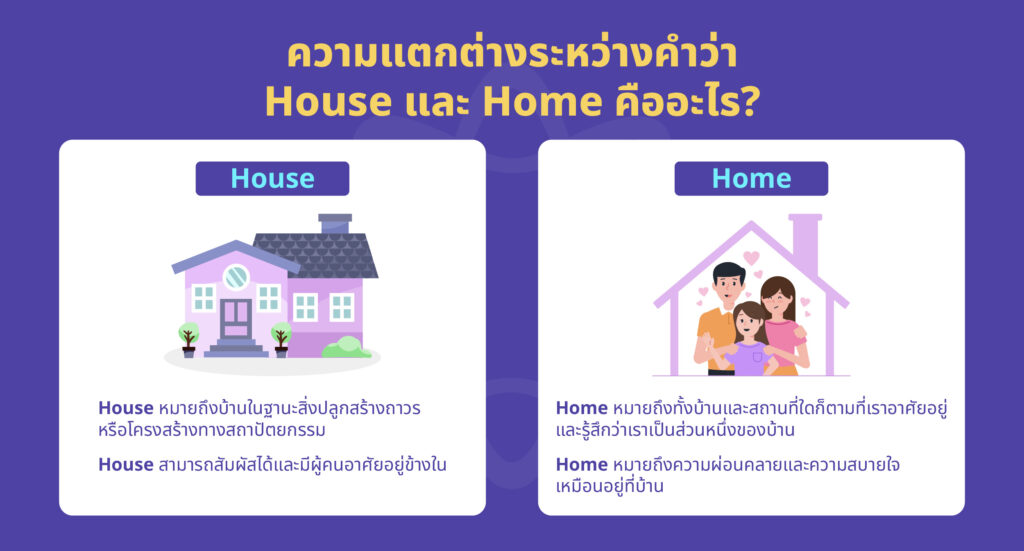
รวมคําศัพท์ภาษาอังกฤษ สิ่งของในบ้าน
รายการคำศัพภาษาอังกฤษท์ที่นิยมเกี่ยวกับสิ่งของและห้องต่าง ๆ ในบ้าน พร้อมกับภาพประกอบ
ห้องต่าง ๆ ในบ้านเป็นภาษาอังกฤษ
| คำศัพท์ภาษาอังกฤษ | คำอ่าน | ความหมาย | ตัวอย่าง |
| Attic | /ˈætɪk/ | ห้องเพดาน, ห้องใต้หลังคา | We store old furniture in the attic. (พวกเราเก็บเฟอร์นิเจอร์เก่าไว้ในห้องใต้หลังคา) |
| Bedroom | /ˈbɛdruːm/ | ห้องนอน | I love decorating my bedroom with new colors. (ฉันชอบตกแต่งห้องนอนของตนเองด้วยสีสันใหม่ๆ) |
| Bathroom | /ˈbæθruːm/ | ห้องนํ้า | Please wash your hands in the bathroom. (กรุณาล้างมือในห้องน้ำ) |
| Balcony | /ˈbæl.kəni/ | ระเบียง | They enjoy their morning coffee on the balcony. (เขาชอบดื่มกาแฟยามเช้าบนระเบียง) |
| Basement | /ˈbeɪsmənt/ | ห้องใต้ดิน | The basement is used for storage and laundry. (ห้องใต้ดินใช้สำหรับเก็บของและซักรีด) |
| Dining room | /ˈdaɪnɪŋ ruːm/ | ห้องอาหาร | We have family dinners in the dining room. (พวกเราทานอาหารเย็นกับครอบครัวในห้องอาหาร) |
| Dressing room | /ˈdrɛsɪŋ ruːm/ | ห้องแต่งตัว | She has a large dressing room for her clothes.(เธอมีห้องแต่งตัวขนาดใหญ่สำหรับเสื้อผ้าของเธอ) |
| Den | /dɛn/ | ห้องนั่งเล่น | The kids play games in the den. (เด็กๆ เล่นเกมในห้องนั่งเล่น) |
| Garage | /ɡəˈrɑːʒ/ | โรงรถ | He parks his car in the garage.(เขาจอดรถไว้ในโรงรถ) |
| Games room | /ɡeɪmz ruːm/ | ห้องเล้นเกมส์ | We set up a games room in the basement for family fun. (พวกเราจัดห้องเล่นเกมในชั้นใต้ดินเพื่อให้ครอบครัวสามารถสนุกด้วยกันได้) |
| Guest room | /ɡɛst ruːm/ | ห้องรับแขก | We always keep the guest room ready for visitors. (เราเตรียมห้องรับแขกไว้สำหรับแขกที่มาเยี่ยมเสมอ) |
| Hall | /hɔːl/ | ห้องโถง | The hall connects all the rooms in the house. (ห้องโถงเชื่อมต่อห้องทั้งหมดในบ้าน) |
| Kitchen | /ˈkɪtʃɪn/ | ห้องครัว | I love cooking in my kitchen. (ฉันชอบทำอาหารในห้องครัวของตนเอง) |
| Loft | /lɔːft/ | ห้องใต้หลังคา | They converted the loft into a cozy office. (พวกเขาเปลี่ยนห้องใต้หลังคาให้กลายเป็นสำนักงานที่แสนสบาย) |
| Living room | /ˈlɪvɪŋ ruːm/ | ห้องนั่งเล่น | We watch movies together in the living room. (พวกเราดูหนังด้วยกันในห้องนั่งเล่น) |
| Laundry room | /ˈlɔːndri ruːm/ | ห้องซักรีด | The laundry room has a washer and dryer.(ในห้องซักรีดมีเครื่องซักผ้าและเครื่องอบผ้า) |
| Master room | /ˈmæstər ruːm/ | ห้องนอนใหญ่ | The master room has its own bathroom. (ห้องนอนใหญ่มีห้องน้ำส่วนตัว) |
| Reading room | /ˈriːdɪŋ ruːm/ | ห้องอ่านหนังสือ | I spend my afternoons in the reading room. (ฉันใช้เวลาช่วงบ่ายของตนเองในห้องอ่านหนังสือ) |
| Study | /ˈstʌdi/ | ห้องทำงาน | He works from home in his study. (เขาทำงานจากที่บ้านในห้องทำงานของเขา) |
| Toilet | /ˈtɔɪ.lət/ | ห้องน้ำ | The toilet is located next to the bathroom. (ห้องส้วมอยู่ติดกับห้องอาบนํ้า) |
| Utility room | /juːˈtɪləti ruːm/ | ห้องอเนกประสงค์ | The utility room contains the furnace and water heater.(ห้องอเนกประสงค์มีเตาผิงและเครื่องทำน้ำร้อน.) |
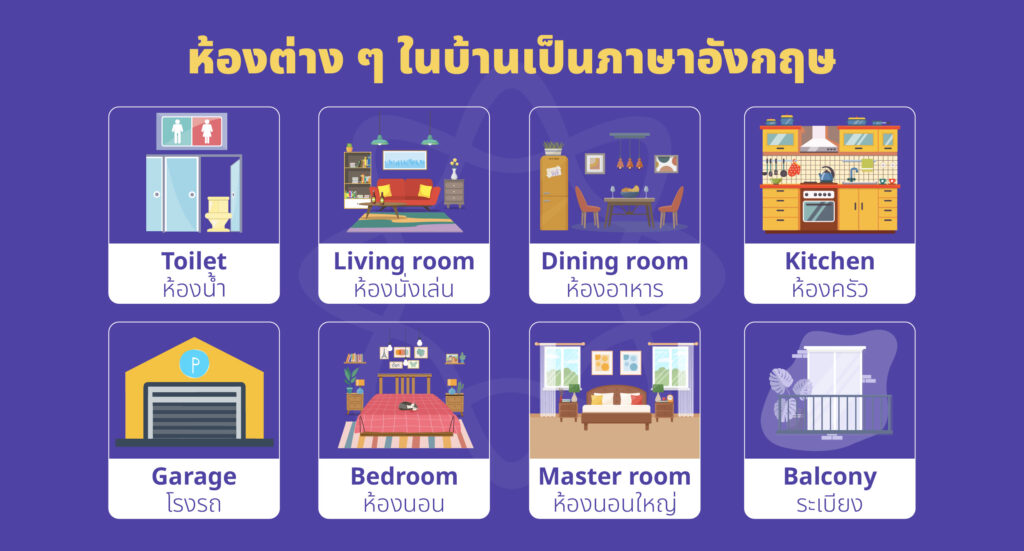
คำศัพท์เกี่ยวกับบ้าน
| คำศัพท์ภาษาอังกฤษ | คำอ่าน | ความหมาย | ตัวอย่าง |
| Aerial | /ˈeəriəl/ | เสาอากาศ | The TV aerial needs to be adjusted for better reception. (ต้องปรับเสาอากาศทีวีเพื่อให้สัญญาณดีขึ้น) |
| Back door | /bæk dɔːr/ | ประตูหลัง | Please use the back door to enter the house.(กรุณาใช้ประตูหลังเพื่อเข้าบ้าน) |
| Burglar alarm | /ˈbɜːrɡlər əˈlɑːrm/ | สัญญาณกันขโมย | We installed a burglar alarm for security. (พวกเราได้ติดตั้งสัญญาณกันขโมยเพื่อรักษาความปลอดภัย) |
| Cellar | /ˈsɛlər/ | ห้องใต้ดิน | The wine is stored in the cellar. (ไวน์ถูกเก็บไว้ในห้องใต้ดิน) |
| Ceiling | /ˈsiːlɪŋ/ | เพดาน | The ceiling is decorated with beautiful moldings. (เพดานถูกตกแต่งด้วยลวดลายที่สวยงาม) |
| Chimney | /ˈtʃɪmni/ | ปล่องไฟ | Smoke was coming out of the chimney. (ควันกำลังลอยออกมาจากปล่องไฟ) |
| Downstairs | /ˈdaʊnˌstɛrz/ | ชั้นล่าง | The living room is located downstairs. (ห้องนั่งเล่นอยู่ชั้นล่าง) |
| Door | /dɔːr/ | ประตู | Please close the door behind you. (กรุณาปิดประตูหลังจากที่คุณออกไปแล้ว) |
| Door knocker | /dɔːr ˈnɒkər/ | ที่เคาะประตู | She used the door knocker to announce her arrival. (เธอใช้ที่เคาะประตูเพื่อแจ้งการมาถึงของเธอ) |
| Drain | /dreɪn/ | ท่อระบายน้ำ | The drain is clogged and needs to be cleaned. (ท่อระบายน้ำอุดตันและจำเป็นต้องทำความสะอาด) |
| Driveway | /ˈdraɪvweɪ/ | ทางเข้าบ้าน) | The car is parked in the driveway.(รถจอดอยู่ในทางเข้าบ้าน) |
| Electrical socket | /ɪˈlɛktrɪkəl ˈsɒkɪt/ | ปลั๊กไฟ | Plug the charger into the electrical socket. (เสียบที่ชาร์จแบตเข้ากับปลั๊กไฟ) |
| Front door | /frʌnt dɔːr/ | ประตูหน้า | The front door is painted red. (ประตูหน้าถูกทาสีแดง) |
| Floor | /flɔːr/ | พื้น | The floor is made of hardwood. (พื้นทำจากไม้ธรรมชาติ) |
| Fireplace | /ˈfaɪərpleɪs/ | เตาผิง | We gathered around the fireplace on cold nights. (พวกเรามารวมตัวกันรอบเตาผิงในคืนที่หนาวเย็น) |
| Fence | /fɛns/ | รั้ว | The fence keeps the dog in the yard. (รั้วช่วยกักให้สุนัขอยู่ในลานบ้าน) |
| Garden | /ˈɡɑːrdən/ | สวน | She grows vegetables in her garden. (เธอปลูกผักในสวนของเธอ) |
| Gable roof | /ˈɡeɪbəl ruːf/ | หลังคาจั่ว | The house has a classic gable roof design. (บ้านหลังนี้มีการออกแบบหลังคาบ้านทรงจั่วแบบคลาสสิก) |
| Hanging basket | /ˈhæŋɪŋ ˈbæskɪt/ | กระถางแขวน | The hanging basket is filled with colorful flowers. (กระถางแขวนเต็มไปด้วยดอกไม้หลากสีสัน) |
| Knob | /nɒb/ | ลูกบิด | Turn the knob to open the door. (หมุนลูกบิดเพื่อเปิดประตู) |
| Lawn | /lɔːn/ | สนามหญ้า | The kids play on the lawn in the summer. (เด็กๆเล่นบนสนามหญ้าตอนฤดูร้อน) |
| Latch | /lætʃ/ | สลัก | Make sure to secure the latch when you leave. (ตรวจสอบให้แน่ใจว่าคุณสลักประตูเรียบร้อยก่อนออกไปข้างนอก) |
| Light switch | /laɪt swɪtʃ/ | สวิตช์ไฟ | Please turn off the light switch when you leave the room. (โปรดปิดสวิตช์ไฟก่อนออกจากห้อง) |
| Ladder | /ˈlædər/ | บันได | Use a ladder to reach the high shelves. (ใช้บันไดเพื่อเอื้อมถึงชั้นวางของที่อยู่สูง) |
| Mailbox | /ˈmeɪl.bɒks/ | ตู้ไปรษณีย์ | Check the mailbox for any letters. (ตรวจสอบตู้ไปรษณีย์ดูว่ามีจดหมายหรือไม่) |
| Porch | /pɔːrtʃ/ | ระเบียง | We sat on the porch to enjoy the sunset. (เรานั่งที่ระเบียงเพื่อชมพระอาทิตย์ตก) |
| Porch light | /pɔːrtʃ laɪt/ | ไฟระเบียง | The porch light is on during the night. (ไฟระเบียงเปิดอยู่ตลอดตอนกลางคืน) |
| Private road | /ˈpraɪvɪt roʊd/ | ถนนส่วนบุคคล | This private road leads to several houses. (ถนนส่วนบุคคลสายนี้นำไปสู่บ้านบางหลัง) |
| Ridge | /rɪdʒ/ | สันหลังคา | The ridge of the roof is covered with tiles. (สันหลังคาถูกปูด้วยกระเบื้อง) |
| Roof | /ruːf/ | หลังคา | The roof needs to be repaired after the storm. (หลังคาจำเป็นต้องซ่อมแซมหลังจากพายุผ่านไป) |
| Room wall | /ruːm wɔːl/ | ผนังห้อง | The room wall is painted blue. (ผนังห้องถูกทาด้วยสีฟ้า) |
| Shed | /ʃɛd/ | โรงเก็บของ | The shed is used for storing gardening tools. (โรงเก็บของถูกใช้สำหรับเก็บอุปกรณ์ทำสวน) |
| Satellite dish | /ˈsætəlaɪt dɪʃ/ | จานดาวเทียม | The satellite dish is installed on the roof. (จานดาวเทียมถูกติดตั้งบนหลังคา) |
| Screen door | /skriːn dɔːr/ | ประตูมุ้งลวด | The screen door keeps bugs out while allowing fresh air in. (ประตูมุ้งลวดกันแมลงเข้าไปในบ้านแต่ยังสามารถระบายอากาศที่บริสุทธิ์เข้ามาได้) |
| Stairs | /stɛrz/ | บันได | The stairs lead to the second floor. (บันไดขึ้นชั้นสอง) |
| Skylight | /ˈskaɪlaɪt/ | หน้าต่างหลังคา | The skylight brightens the room with natural light. (หน้าต่างหลังคาทำให้ห้องสว่างขึ้นด้วยแสงธรรมชาติ) |
| Terrace/Patio | /ˈtɛrəs//ˈpætioʊ/ | ดาดฟ้า | We have a barbecue on the terrace /patio every weekend. (พวกเรามีปาร์ตี้บาร์บีคิวบนดาดฟ้าทุกสุดสัปดาห์) |
| Tile | /taɪl/ | กระเบื้อง | The kitchen floor is covered with ceramic tiles. (พื้นห้องครัวปูด้วยกระเบื้องเซรามิก) |
| Turf | /tɜrf/ | หญ้าเทียม | The backyard has beautiful green turf.(ลานบ้านมีสนามหญ้าเทียมสีเขียวสวยงาม) |
| Threshold | /ˈθrɛʃhoʊld/ | ธรณีประตู | She stepped over the threshold into her new home. (เธอก้าวข้ามธรณีประตูเข้าไปในบ้านหลังใหม่ของเธอ) |
| Eaves | /ivz/ | ชายคา | The rainwater runs off the eaves of the house. (น้ำฝนไหลลงมาจากชายคาบ้าน) |
| Upstairs | /ˈʌpˌstɛrz/ | ชั้นบน | The bedrooms are located upstairs. (ห้องนอนอยู่ชั้นบน) |
| Wall | /wɔːl/ | ผนัง | The wall is painted white. (ผนังถูกทาด้วยสีขาว) |
| Window | /ˈwɪndoʊ/ | หน้าต่าง | She opened the window to let in fresh air. (เธอเปิดหน้าต่างเพื่อให้อากาศที่บริสุทธิ์เข้ามา) |
| Window shutters | /ˈwɪndoʊ ˈʃʌtərz/ | บานเกล็ดหน้าต่าง | The window shutters protect the house from the sun. (บานเกล็ดหน้าต่างทำหน้าที่ปกป้องบ้านจากแสงอาทิตย์) |
| Yard | /jɑːrd/ | สนาม | The kids play in the yard every afternoon. (เด็กๆ เล่นในสนามทุกบ่าย) |
คำศัพท์ภาษาอังกฤษเกี่ยวกับสิ่งของในห้องนั่งเล่น
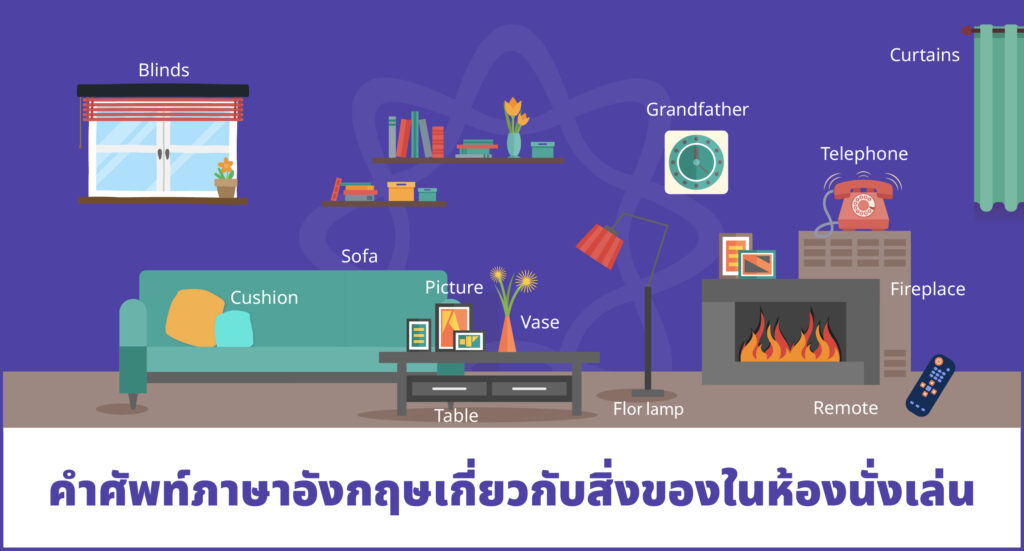
| คำศัพท์ภาษาอังกฤษ | คำอ่าน | ความหมาย | ตัวอย่าง |
| Artwork | /ˈɑːrtwɜrk/ | งานศิลปะ | The artwork on the wall adds color to the room. (ผลงานศิลปะบนผนังช่วยเพิ่มสีสันให้กับห้อง) |
| Bookcase/ Bookshelf | /ˈbʊkkeɪs//ˈbʊkʃɛlf/ | ชั้นหนังสือ | She organized her novels on the bookcase/ bookshelf. (เธอจัดนิยายของเธอบนชั้นหนังสือ) |
| Blinds | /blaɪndz/ | ม่านม้วน | The blinds keep the sunlight out of the room. (ม่านม้วนช่วยกันแสงแดดไม่ให้เข้ามาในห้อง) |
| Chair | /tʃɛr/ | เก้าอี้ | This chair is very comfortable for reading. (เก้าอี้อันนี้นั่งอ่านหนังสือสบายมาก) |
| Carpet | /ˈkɑːrpɪt/ | พรม | The living room has a soft carpet. (ห้องนั่งเล่นมีพรมนุ่มๆ) |
| Curtain | /ˈkɜːrtən/ | ม่านประตู | She closed the curtains to block the light. (เธอปิดม่านประตูเพื่อกันแสงสว่าง) |
| Cushion | /ˈkʊʃən/ | หมอนอิง | The cushion on the sofa is very soft. (หมอนอิงบนโซฟานุ่มมาก.) |
| Couch | /kaʊtʃ/ | โซฟา | We relax on the couch while watching TV. (พวกเรานั่งดูทีวีสบายๆบนโซฟา) |
| Coasters | /ˈkoʊstərz/ | ถาดรองแก้ว | Use coasters to protect the table from water rings. (ใช้ที่รองแก้วเพื่อป้องกันโต๊ะจากรอยน้ำ) |
| Chandelier | /ˌʃændəˈlɪr/ | โคมไฟระย้า | The chandelier in the dining room is stunning. (โคมระย้าในห้องนั้นงดงามมาก) |
| CD player | /ˈsiːdiː ˌpleɪər/ | เครื่องเล่นซีดี | I listen to music on my CD player.(ฉันฟังเพลงด้วยเครื่องเล่นซีดีของฉัน) |
| Chest of drawers | /tʃɛst əv drɔrz/ | ตู้ลิ้นชัก | I keep my clothes in the chest of drawers. (ฉันเก็บเสื้อผ้าของตนเองไว้ในตู้ลิ้นชัก) |
| Desk | /dɛsk/ | โต๊ะทำงาน | I work at my desk every day. (ฉันทำงานที่โต๊ะทำงานของตัวเองทุกวัน) |
| Door mat | /dɔːr mæt/ | พรมเช็ดเท้า | Wipe your feet on the door mat before entering. (กรุณาเช็ดเท้าที่พรมเช็ดเท้าตรงหน้าประตูก่อนเข้ามา) |
| Drinks cabinet | /drɪŋks ˈkæbɪnət/ | ตู้เก็บเครื่องดื่ม | The drinks cabinet holds a variety of beverages. (ตู้เก็บเครื่องดื่มมีเครื่องดื่มหลากหลายชนิด) |
| End table | /ɛnd ˈteɪbl/ | โต๊ะข้าง | I put my lamp on the end table next to the couch. (ฉันวางโคมไฟบนโต๊ะข้างโซฟา) |
| Entertainment center | /ˌɛntərˈteɪnmənt ˈsɛntər/ | ศูนย์รวมความบันเทิง | The entertainment center holds the TV and games. (ศูนย์รวมความบันเทิงมีเกมและทีวี) |
| Electric fire | /ɪˈlɛktrɪk faɪər/ | เตาผิงไฟฟ้า | The electric fire provides warmth in winter. (เตาผิงไฟฟ้าช่วยให้ความอบอุ่นในฤดูหนาว) |
| Floor lamp | /flɔːr læmp/ | โคมไฟตั้งพื้น | The floor lamp adds light to the corner of the room. (โคมไฟตั้งพื้นทำให้มุมห้องสว่างขึ้น) |
| Fan | /fæn/ | พัดลม | The fan keeps the room cool in the summer. (พัดลมทำให้ห้องเย็นสบายในฤดูร้อน) |
| Fireplace | /ˈfaɪərpleɪs/ | เตาผิง | We gather around the fireplace in the winter. (พวกเรามารวมตัวกันรอบเตาผิงในช่วงฤดูหนาว) |
| Family photos | /ˈfæmɪli ˈfoʊtoʊz/ | ภาพถ่ายครอบครัว | The family photos are displayed on the wall. (ภาพถ่ายครอบครัวถูกจัดแสดงอยู่บนผนัง) |
| Grandfather clock | /ˈɡrændfɑːðər klɑːk/ | นาฬิกาโบราณตั้งพื้น | The grandfather clock chimes every hour. (นาฬิกาตั้งพื้นตีบอกเวลาทุกชั่วโมง) |
| Houseplant | /ˈhaʊsplænt/ | ต้นไม้ในบ้าน | A houseplant can improve air quality. (ต้นไม้ในบ้านสามารถทำให้อากาศดีขึ้น) |
| Lampshade | /ˈlæmp.ʃeɪd/ | โป๊ะโคมไฟ | The lampshade matches the colors of the room. (โป๊ะโคมไฟเหมาะสมกับสีห้อง) |
| Mantel | /ˈmæntəl/ | หิ้งเตาผิง | We decorated the mantel with holiday decor. (พวกเราตกแต่งหิ้งเตาผิงด้วยของตกแต่งเทศกาล) |
| Ottoman | /ˈɑːtəmən/ | เก้าอี้ออตโตมัน | The ottoman serves as both a footrest and storage. (เก้าอี้ออตโตมันเป็นทั้งที่วางเท้าและที่เก็บของได้) |
| Ornament | /ˈɔːrnəmənt/ | เครื่องประดับ | She placed an ornament on the shelf. (เธอวางเครื่องประดับบนชั้นวาง) |
| Picture | /ˈpɪk.tʃər/ | รูปภาพ | The picture on the wall is a family portrait. (รูปภาพที่อยู่บนผนังนั้นเป็นภาพครอบครัว) |
| Radio | /ˈreɪdioʊ/ | วิทยุ | I listen to the radio while cooking. (ฉันฟังวิทยุระหว่างทำอาหาร) |
| Rug | /rʌɡ/ | พรมปูพื้น | The rug adds warmth to the hardwood floor. (พรมปูพื้นทำให้พื้นไม้มีความอบอุ่นขึ้น) |
| Remote | /rɪˈmoʊt/ | รีโมตคอนโทรล | Where is the remote for the TV? (รีโมตคอนโทรลของทีวีอยู่ไหน) |
| Soundbar | /ˈsaʊndˌbɑːr/ | ซาวด์บาร์ | The soundbar enhances the audio experience while watching movies. (ซาวด์บาร์ช่วยทำให้การณ์การฟังเสียงขณะชมภาพยนตร์ดีขึ้น) |
| Side table | /saɪd ˈteɪbl/ | โต๊ะข้าง | I keep my lamp on the side table next to the bed. (ฉันวางโคมไฟบนโต๊ะข้างเตียง) |
| Sofa | /ˈsoʊfə/ | โซฟา | The sofa is perfect for lounging on weekends. (โซฟาเหมาะสมกับการพักผ่อนในช่วงสุดสัปดาห์) |
| Shelving unit | /ˈʃɛlvɪŋ ˈjuːnɪt/ | ชั้นวางของ | The shelving unit holds books and decorative items. (ชั้นวางของมีหนังสือและเครื่องประดับ) |
| Speaker/ Amplifier | /ˈspiːkər/ /ˈæmplɪfaɪər/ | ลำโพง/ ตัวขยายสัญญาณ | The speakers/amplifier provide great sound quality for music. (ลำโพง/เครื่องขยายเสียงให้คุณภาพเสียงที่ยอดเยี่ยมสำหรับการฟังเพลง) |
| Throw blanket | /θroʊ ˈblæŋkɪt/ | ผ้าห่มผืนเล็ก | I keep a throw blanket on the couch for cold nights. (ฉันเก็บผ้าห่มผืนเล็กไว้บนโซฟาเผื่อคืนที่อากาศหนาว) |
| Television | /ˈtɛlɪˌvɪʒən/ | โทรทัศน์ / ทีวี | We watch our favorite shows on the television. (พวกเราดูรายการโปรดในทีวี.) |
| TV stand | /tiː viː stænd/ | ชั้นวางทีวี | The TV stand holds the television and media devices. (ชั้นวางโทรทัศน์ใช้สำหรับวางโทรทัศน์และอุปกรณ์สื่อต่างๆ) |
| Tea set | /tiː sɛt/ | ชุดน้ำชา | She uses her beautiful tea set for special occasions. ( เธอใช้ชุดน้ำชาสวยงามของเธอในโอกาสพิเศษ) |
| Telephone | /ˈtɛlɪˌfoʊn/ | โทรศัพท์ | The telephone rings when someone calls. (โทรศัพท์จะส่งเสียงเมื่อมีคนโทรเข้ามา) |
| Vase | /veɪs/ | แจกัน | The flowers are in a beautiful vase. (ดอกไม้ถูกใส่ในแจกันสวยงาม) |
| Vacuum cleaner | /ˈvæk.juːm ˈkliː.nər/ | เครื่องดูดฝุ่น | The vacuum cleaner is very effective for cleaning carpets. (เครื่องดูดฝุ่นทำความสะอาดพรมได้ดีมาก) |
| Wall art | /wɔːl ɑːrt/ | การตกแต่งผนัง | The wall art gives the room a modern touch. (การตกแต่งผนังด้วยงานศิลปะทำให้ห้องดูทันสมัยขึ้น) |
| Wing chair | /wɪŋ tʃɛr/ | เก้าอี้นวมขนาดใหญ่และสูง มีพนักพิง | She loves to read her books in the comfortable wing chair by the window. (เธอชอบนั่งอ่านหนังสือในเก้าอี้นวมขนาดใหญ่ริมหน้าต่าง) |
คำศัพท์ภาษาอังกฤษเกี่ยวกับสิ่งของในห้องนํ้า
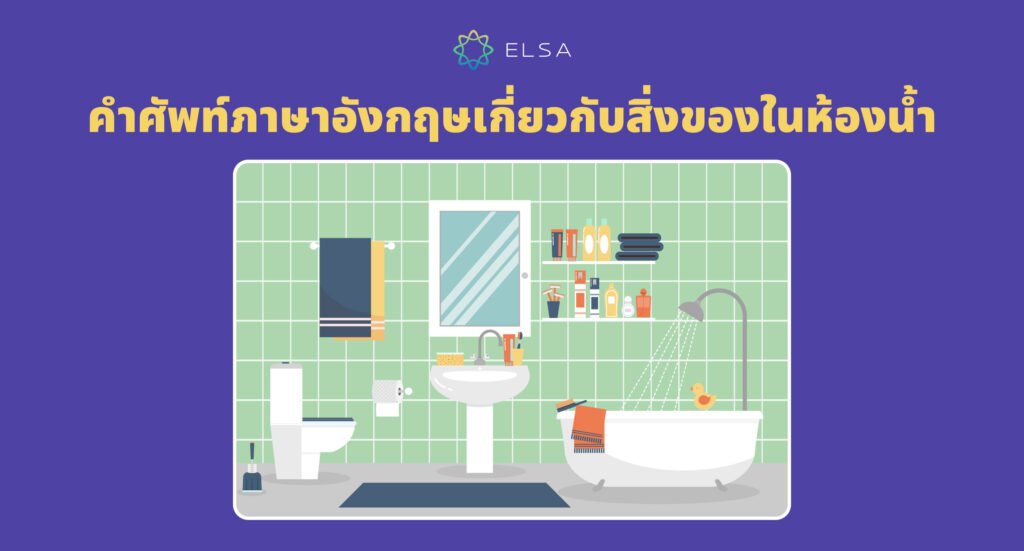
| คำศัพท์ภาษาอังกฤษ | คำอ่าน | ความหมาย | ตัวอย่าง |
| Bath mat | /bæθ mæt/ | พรมห้องน้ำ | The bath mat absorbs water after a shower. (พรมห้องน้ำซับน้ำหลังอาบน้ำเสร็จ) |
| Bath toys | /bæθ tɔɪz/ | ของเล่นในน้ำ | The kids love playing with their bath toys. (เด็กๆชอบเล่นกับของเล่นในน้ำของเขา) |
| Bathtub | /ˈbæθtʌb/ | อ่างอาบน้ำ | I enjoy relaxing in the bathtub after a long day. (ฉันชอบพักผ่อนในอ่างอาบน้ำหลังจากวันที่เหนื่อยล้า) |
| Bucket | /ˈbʌkɪt/ | ถัง | I filled the bucket with water for cleaning. (ฉันเทน้ำใส่ถังเพื่อทำความสะอาด) |
| Comb | /koʊm/ | หวี | I always carry a comb in my bag. (ฉันพกหวีไว้ในกระเป๋าเสมอ) |
| Cleanser | /ˈklɛnzər/ | โฟมล้างหน้า | Use a gentle cleanser for your skin. (จงใช้โฟมล้างหน้าสูตรอ่อนโยนกับผิวของคุณ) |
| Clothesline | /ˈkloʊðzlaɪn/ | ราวตากผ้า | I hung the laundry on the clothesline to dry. (ฉันตากผ้าไว้ที่ราวตากผ้าให้เสื้อผ้าแห้ง) |
| Clothes peg/ Clothespin | /kloʊðz pɛɡ/ /ˈkloʊθspɪn/ | ไม้หนีบผ้า | She used a clothes peg/clothespin to secure the sheets. (เธอใช้ไม้หนีบผ้าหนีบผ้าปูที่นอนให้แน่น) |
| Cold water faucet | /koʊld ˈwɔːtər ˈfɔːsɪt/ | ก๊อกน้ำเย็น | Turn on the cold water faucet to fill the sink. (เปิดก๊อกน้ำเย็นเพื่อเติมนํ้าให้เต็มอ่าง) |
| Conditioner | /kənˈdɪʃənər/ | ครีมนวดผม | Apply conditioner after shampooing your hair. (หมักครีมนวดผมหลังจากสระผม) |
| Electric razor | /ɪˈlɛktrɪk ˈreɪzər/ | เครื่องโกนหนวดไฟฟ้า | He prefers using an electric razor for shaving. ( เขาชอบใช้เครื่องโกนหนวดไฟฟ้าเพื่อโกนหนวด) |
| Faucet | /ˈfɔːsɪt/ | ก๊อก | The faucet is leaking and needs to be fixed. (ก๊อกน้ำกำลังรั่วและจำเป็นต้องซ่อมแซม) |
| Hanger | /ˈhæŋər/ | ที่แขวน | Hang your coat on the hanger. (แขวนเสื้อโค้ทของคุณไว้ที่ราวแขวน) |
| Hair brush | /hɛr brʌʃ/ | แปรงหวีผม | I use a hair brush to detangle my hair. (ฉันใช้แปรงหวีผมเพื่อหวีผมให้ไม่พันกัน) |
| Hair dryer | /hɛr ˈdraɪər/ | เครื่องเป่าผม | She dried her hair with a hair dryer. (เธอเป่าผมด้วยเครื่องเป่าผมแล้ว) |
| Hamper | /ˈhæmpər/ | ตะกร้าผ้า | I put my dirty clothes in the hamper. (ฉันใส่เสื้อผ้าสกปรกของฉันลงในตะกร้าผ้า) |
| Hot water faucet | /hɑːt ˈwɔːtər ˈfɔːsɪt/ | ก๊อกน้ำร้อน | Use the hot water faucet to fill the tub. ( ใช้ก๊อกน้ำร้อนเติมนํ้าร้อนให้เต็มอ่าง) |
| Laundry detergent | /ˈlɔːndri dɪˈtɜːrdʒənt/ | ผลิตภัณฑ์ซักผ้า | Add laundry detergent to the washing machine. (เติมผลิตภัณฑ์ซักผ้าใส่เครื่องซักผ้า) |
| Laundry basket | /ˈlɔːndri ˈbæskɪt/ | ตะกร้าผ้า | The laundry basket is full of clothes. (ตะกร้าผ้าเต็มไปด้วยเสื้อผ้า) |
| Mirror | /ˈmɪrər/ | กระจก | She looked at herself in the mirror. ( เธอมองตัวเองในกระจก) |
| Mouthwash | /ˈmaʊθwɑːʃ/ | น้ำยาบ้วนปาก | Rinse with mouthwash for fresh breath. (บ้วนปากด้วยน้ำยาบ้วนปากเพื่อให้ลมหายใจสดชื่น) |
| Mop | /mɑːp/ | ไม้ถูพื้น | Use a mop to clean the floor. (ใช้ไม้ถูพื้นทำความสะอาดพื้น) |
| Measuring jug | /ˈmɛʒərɪŋ dʒʌɡ/ | ถ้วยตวง | Pour the water into the measuring jug. (เทนํ้าใส่ถ้วยตวง) |
| Mirror cabinet | /ˈmɪrər ˈkæbɪnɪt/ | ตู้กระจก | The mirror cabinet holds all my toiletries. (ตู้กระจกเก็บอุปกรณ์อาบน้ำของฉันไว้ทั้งหมด) |
| Polish | /ˈpɒlɪʃ/ | น้ำยาขัดเงา | Use furniture polish to make it shine. (ใช้น้ำยาขัดเงาเฟอร์นิเจอร์เพื่อให้มันเงางาม) |
| Q-tip | /ˈkjuː tɪp/ | คอตตอนบัด | I use a Q-tip to clean my ears. (ฉันใช้คอตตอนบัดเพื่อทำความสะอาดหู) |
| Razor | /ˈreɪzər/ | มีดโกน | He bought a new razor for shaving. (เขาซื้อมีดโกนใหม่เพื่อโกนหนวด) |
| Shaving cream | /ˈʃeɪvɪŋ kriːm/ | ครีมโกนหนวด | Apply shaving cream before using the razor. (ทาครีมโกนหนวดก่อนใช้มีดโกน) |
| Soap | /soʊp/ | สบู่ | I like using scented soap in the shower. (ฉันชอบใช้สบู่ที่มีกลิ่นหอมตอนอาบนํ้า) |
| Soap dish | /soʊp dɪʃ/ | จานวางสบู่ | The soap dish is placed next to the sink. (จานวางสบู่วางไว้ข้างอ่างล้างหน้า) |
| Soap dispenser | /soʊp dɪsˈpɛnsər/ | เครื่องจ่ายสบู่ | The soap dispenser is empty and needs to be refilled. (เครื่องจ่ายสบู่ว่างเปล่าและจำเป็นต้องเติมใหม่) |
| Scale | /skeɪl/ | Cân | Step on the scale to check your weight. (ขึ้นไปยืนบนตาชั่งเพื่อเช็คน้ำหนักของคุณ) |
| Sink | /sɪŋk/ | อ่าง | She washed her hands in the sink. (เธอล้างมือในอ่างล้างมือ) |
| Soapy water | /ˈsoʊpi ˈwɔːtər/ | น้ำยาล้างจาน | The soapy water is great for washing dishes. (น้ำยาล้างจานดีต่อการล้างจาน) |
| Shower | /ˈʃaʊər/ | ฝักบัว | I take a shower every morning. (ฉันอาบนํ้าด้วยฝักบัวทุกเช้า) |
| Shampoo | /ʃæmˈpuː/ | แชมพู | I need to buy some more shampoo. ( ฉันต้องซื้อแชมพูเพิ่ม) |
| Shower curtain | /ˈʃaʊər ˈkɜːrtən/ | ม่านห้องน้ำ | The shower curtain keeps the bathroom dry. (ม่านห้องน้ำช่วยให้ห้องน้ำแห้ง) |
| Shower caddy | /ˈʃaʊər ˈkædi/ | ชั้นวางของในห้องน้ำ | I keep my toiletries in the shower caddy. (ฉันวางสิ่งของส่วนตัวบนชั้นวางของในห้องน้ำ) |
| Tissue | /ˈtɪʃuː/ | ทิชชู่ | I always carry a tissue in my pocket. (ฉันพกทิชชู่ไว้ในกระเป๋าเสมอ) |
| Toilet | /ˈtɔɪlɪt/ | โถชักโครก | The toilet is in the bathroom. (โถชักโครกอยู่ในห้องนํ้า) |
| Toilet seat | /ˈtɔɪlɪt siːt/ | ที่นั่งชักโครก | The toilet seat needs to be replaced. (ที่นั่งชักโครกต้องเปลี่ยนใหม่) |
| Towel | /ˈtaʊəl/ | ผ้าขนหนู | I wrapped myself in a towel after the shower. (ฉันได้ใช้ผ้าขนหนูห่อร่างกายหลังจากอาบน้ำเสร็จ) |
| Towel rail | /ˈtaʊəl reɪl/ | ราวแขวนผ้าขนหนู | The towel rail is full of wet towels. (ราวแขวนผ้าขนหนูเต็มไปด้วยผ้าขนหนูเปียก) |
| Towel hook | /ˈtaʊəl hʊk/ | ไม้แขวนผ้าขนหนู | Hang your towel on the towel hook. (แขวนผ้าขนหนูของคุณไว้บนไม้แขวนผ้าขนหนู) |
| Toothbrush | /ˈtuːθbrʌʃ/ | แปรงสีฟัน | Don’t forget to bring your toothbrush. (อย่าลืมพกแปรงสีฟันของคุณ) |
| Toothbrush holder | /ˈtuːθbrʌʃ ˈhoʊldər/ | ที่วางแปรงสีฟัน | The toothbrush holder keeps my toothbrush clean. (ที่วางแปรงสีฟันช่วยให้แปรงสีฟันของฉันสะอาด) |
| Toothpaste | /ˈtuːθpeɪst/ | ยาสีฟัน | I need to buy some more toothpaste. (ฉันต้องซื้อยาสีฟันเพิ่ม) |
| Toilet paper | /ˈtɔɪlɪt ˈpeɪpər/ | กระดาษชำระ | We need to buy more toilet paper. (เราต้องซื้อกระดาษชำระเพิ่ม) |
| Trash can | /træʃ kæn/ | ถังขยะ | Please throw that in the trash can. (กรุณาทิ้งมันลงถังขยะ) |
| Trash bag | /træʃ bæɡ/ | ถุงขยะ | I need a new trash bag for the kitchen. (ฉันต้องการถุงขยะใหม่สำหรับห้องครัว) |
| Washing machine | /ˈwɒʃɪŋ məˈʃiːn/ | เครื่องซักผ้า | The washing machine is broken. (เครื่องซักผ้าเสีย) |
| Washing powder/ Detergent | /ˈwɒʃɪŋ ˈpaʊdər/ /dɪˈtɜːrdʒənt/ | ผงซักฟอก / น้ำยาซักผ้า | Add washing powder/detergent to the machine before starting it. (เติมผงซักฟอกลงในเครื่องซักผ้าก่อนเริ่มใช้งาน) |
>>> Read more: ห้องน้ำภาษาอังกฤษมีคำอะไรบ้าง? วิธีแยกแยะและคำศัพท์พร้อมคำอ่าน
คำศัพท์ภาษาอังกฤษเกี่ยวกับเฟอร์นิเจอร์ห้องนอน
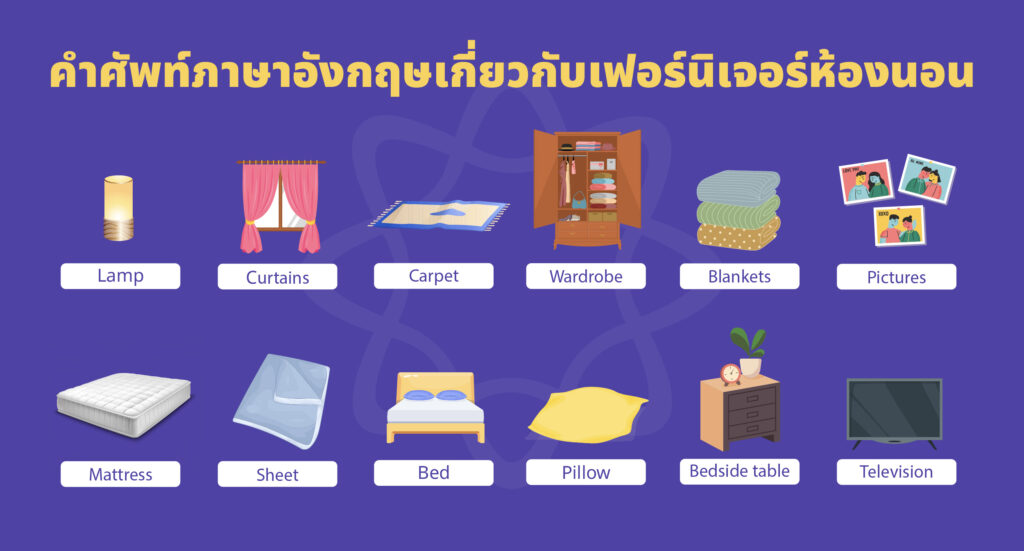
| คำศัพท์ภาษาอังกฤษ | คำอ่าน | ความหมาย | ตัวอย่าง |
| Alarm clock | /əˈlɑːrm klɑːk/ | นาฬิกาปลุก | I set my alarm clock for 7 AM. (ฉันตั้งนาฬิกาปลุกไว้ตอน 7 โมงเช้า) |
| Air conditioner | /ˈeə kənˌdɪʃ.ən.ər/ | เครื่องปรับอากาศ | The air conditioner keeps the room cool in summer. (เครื่องปรับอากาศช่วยทำให้ห้องเย็นสบายในช่วงฤดูร้อน) |
| Bed | /bɛd/ | เตียง | I love my comfortable bed. (ฉันรักเตียงที่สบายของฉัน) |
| Bedside table | /ˈbɛdˌsaɪd ˈteɪbl/ | โต๊ะข้างเตียง | I keep my lamp on the bedside table. (ฉันวางโคมไฟไว้บนโต๊ะข้างเตียง) |
| Blanket | /ˈblæŋkɪt/ | ผ้าห่ม | I need an extra blanket for winter. (ฉันต้องการผ้าห่มเพิ่มสำหรับฤดูหนาว ) |
| Bedspread | /ˈbɛdˌsprɛd/ | ผ้าคลุมเตียง | The bedspread adds color to the bedroom. (ผ้าคลุมเตียงช่วยเพิ่มสีสันให้กับห้องนอน) |
| Bunk bed | /bʌŋk bɛd/ | เตียงสองชั้น | The kids sleep in a bunk bed. (เด็ก ๆ นอนบนเตียงสองชั้น) |
| Calendar | /ˈkælɪndər/ | ปฏิทิน | I marked the date on my calendar. (ฉันทำเครื่องหมายวันไว้ในปฏิทิน) |
| Carpet | /ˈkɑːrpɪt/ | พรมปูพื้น | The carpet in the living room is soft. (พรมปูพื้นในห้องนั่งเล่นนุ่มมาก) |
| Chest of drawers | /tʃɛst əv drɔːrz/ | ตู้ลิ้นชัก | I store my clothes in the chest of drawers. (ฉันเก็บเสื้อผ้าของฉันไว้ในตู้ลิ้นชัก) |
| Coat hanger | /koʊt ˈhæŋər/ | ไม้แขวนเสื้อ | Please hang your coat on the coat hanger. (โปรดแขวนเสื้อโค้ตของคุณในไม้แขวนเสื้อ) |
| Curtain | /ˈkɜːrtən/ | ม่านประตู | I closed the curtain to block the sunlight. (ฉันปิดม่านประตูเพื่อกันแสงแดด) |
| Desk | /dɛsk/ | โต๊ะทำงาน | I do my homework at the desk. (ฉันทำการบ้านบนโต๊ะทำงาน) |
| Double bed | /ˈdʌbəl bɛd/ | เตียงคู่ | They sleep in a double bed. (พวกเขานอนบนเตียงคู่) |
| Dresser | /ˈdrɛsər/ | ตู้เสื้อผ้า | She keeps her clothes in the dresser. (เธอเก็บเสื้อผ้าไว้ในตู้เสื้อผ้า) |
| Dressing table | /ˈdrɛsɪŋ ˈteɪbl/ | โต๊ะแต่งตัว | I put my makeup on the dressing table. (ฉันแต่งหน้าที่โต๊ะแต่งตัว) |
| Fan | /fæn/ | พัดลม | The fan helps keep the room cool. (พัดลมช่วยให้ห้องเย็นสบาย) |
| Fitted sheet | /ˈfɪtɪd ʃiːt/ | ผ้าปูที่นอนแบบรัดมุม | I need a new fitted sheet for my mattress. (ฉันต้องการผ้าปูที่นอนแบบรัดมุมใหม่สำหรับที่นอนของฉัน) |
| Flat sheet | /flæt ʃiːt/ | ผ้าปูที่นอนแบบแบน | The flat sheet goes on top of the fitted sheet. (ผ้าปูที่นอนแบบแบนวางไว้บนผ้าปูที่นอนแบบรัดมุม) |
| Footboard | /ˈfʊtbɔːrd/ | ปลายเตียง | The footboard of the bed is beautifully carved. (ปลายเตียงแกะสลักได้อย่างสวยงาม) |
| Headboard | /ˈhɛdˌbɔːrd/ | หัวเตียง | The headboard adds elegance to the bed. (หัวเตียงเพิ่มความหรูหราให้กับเตียง) |
| Mattress | /ˈmætrəs/ | ที่นอน | A good mattress is important for sleep. (ที่นอนที่ดีมีความสำคัญต่อการนอน) |
| Mirror | /ˈmɪrər/ | กระจก | I checked my appearance in the mirror. (ฉันตรวจสอบรูปร่างหน้าตาของตัวเองในกระจก) |
| Nightlight | /ˈnaɪtlaɪt/ | โคมไฟกลางคืน | The nightlight helps me see in the dark. (โคมไฟกลางคืนช่วยให้ฉันมองเห็นในความมืด) |
| Photo frame | /ˈfoʊtoʊ freɪm/ | กรอบรูปภาพ | I put the family picture in a photo frame. (ฉันใส่รูปครอบครัวลงในกรอบรูป) |
| Pillow | /ˈpɪloʊ/ | หมอน | I need a new pillow for my bed. (ฉันต้องการหมอนใบใหม่สำหรับเตียงของฉัน) |
| Pillowcase | /ˈpɪloʊkeɪs/ | ปลอกหมอน | I changed the pillowcase to match the sheets. (ฉันเปลี่ยนปลอกหมอนให้เข้ากับผ้าปูที่นอน) |
| Sofa bed | /ˈsoʊfə bɛd/ | เตียงโซฟา | The sofa bed is perfect for guests. (เตียงโซฟาเหมาะสำหรับแขกมาก) |
| Under-bed storage | /ˈʌndər bɛd ˈstɔːrɪdʒ/ | ที่เก็บของใต้เตียง | I keep extra blankets in the under-bed storage. (ฉันเก็บผ้าห่มสำรองไว้ในที่เก็บของใต้เตียง) |
| Wallpaper | /ˈwɔːlpeɪpər/ | กระดาษติดฝาผนัง | We decided to put up new wallpaper in the bedroom. (พวกเราได้ตัดสินใจติดกระดาษติดฝาผนังใหม่ในห้องนอน) |
| Wardrobe | /ˈwɔːrdroʊb/ | ตู้เสื้อผ้า | She organized her clothes in the wardrobe. (เธอจัดเรียงเสื้อผ้าของเธอในตู้เสื้อผ้า) |
| Wind chimes | /wɪnd tʃaɪmz/ | กระดิ่งลม | The wind chimes create a soothing sound in the garden. (กระดิ่งลมส่งเสียงที่น่ารื่นรมย์ในสวน.) |
คำศัพท์ภาษาอังกฤษเกี่ยวกับสิ่งของในห้องครัว
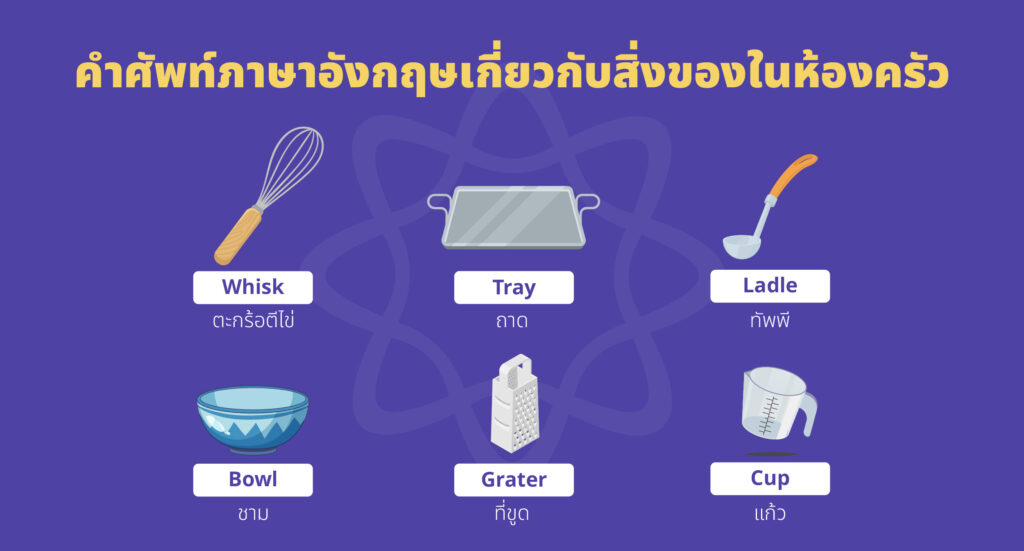
| คำศัพท์ภาษาอังกฤษ | คำอ่าน | ความหมาย | ตัวอย่าง |
| Apron | /ˈeɪprən/ | ผ้ากันเปื้อน | I wear an apron while cooking to keep my clothes clean. (ฉันใส่ผ้ากันเปื้อนระหว่างทำอาหารเพื่อให้เสื้อผ้าสะอาด) |
| Baking tray | /ˈbeɪkɪŋ treɪ/ | ถาดอบขนม | Place the cookies on a baking tray. (วางคุกกี้บนถาดอบขนม) |
| Basket | /ˈbæskɪt/ | ตะกร้า | I bought a basket for the fruits. (ฉันซื้อตะกร้ามาใส่ผลไม้) |
| Bowl | /boʊl/ | ชาม | She served the salad in a large bowl. (เธอให้เสิร์ฟสลัดในชามขนาดใหญ่) |
| Blender | /ˈblɛndər/ | เครื่องปั่น | Use the blender to make a smoothie. (ใช้เครื่องปั่นทำสมูทตี้) |
| Can opener | /kæn ˈoʊpənər/ | ที่เปิดกระป๋อง | I need a can opener to open this tin. (ฉันต้องการที่เปิดกระป๋องเพื่อเปิดกระป๋องนี้) |
| Colander | /ˈkɒlɪndər/ | กระชอน | Use the colander to drain the pasta. (ใช้กระชอนเพื่อสะเด็ดน้ำพาสต้า) |
| Chopsticks | /ˈtʃɑːpstɪks/ | ตะเกียบ | I eat sushi with chopsticks. (ฉันใช้ตะเกียบทานซูชิ) |
| Cooker | /ˈkʊkər/ | หม้อหุงข้าว | The cooker is used for boiling rice. (หม้อหุงข้าวใช้สำหรับหุงข้าว) |
| Crockery | /ˈkrɒkəri/ | เครื่องถ้วยกระเบื้อง | I need to buy new crockery for the dinner party. (ฉันต้องซื้อเครื่องถ้วยกระเบื้องใหม่สำหรับงานเลี้ยงอาหารค่ำ) |
| Cup | /kʌp/ | แก้ว | She drank tea from her favorite cup. (เธอได้ดื่มชาจากแก้วใบโปรดของเธอ) |
| Cupboard | /ˈkʌbərd/ | ตู้กับข้าว | The plates are in the cupboard. (จานอยู่ในตู้กับข้าว) |
| Cooker hood | /ˈkʊkər hʊd/ | เครื่องดูดควัน | The cooker hood removes smoke from the kitchen. (เครื่องดูดควันช่วยดูดควันออกจากห้องครัว) |
| Cutting board | /ˈkʌtɪŋ bɔːrd/ | เขียง | I chopped the vegetables on a cutting board. (ฉันหั่นผักบนเขียง) |
| Dessert spoon | /dɪˈzɜːrt spuːn/ | ช้อนขนม | Use a dessert spoon for the pudding. (ใช้ช้อนขนมสำหรับทานพุดดิ้ง) |
| Dishwasher | /ˈdɪʃˌwɔːʃər/ | เครื่องล้างจาน | The dishwasher makes cleaning up easy. (เครื่องล้างจานทำให้การทำความสะอาดสะดวกขึ้น) |
| Dish soap | /dɪʃ soʊp/ | น้ำยาล้างจาน | I use dish soap to wash the dishes. (ฉันใช้น้ำยาล้างจานเพื่อล้างจาน) |
| Dish rack | /dɪʃ ræk/ | ตะแกรงวางจาน | Place the clean dishes on the dish rack. (วางจานสะอาดลงบนตะแกรงวางจาน) |
| Fork | /fɔrk/ | ส้อม | I need a fork for my salad. (ฉันต้องการส้อมสำหรับสลัดของฉัน) |
| Fryer | /ˈfraɪər/ | หม้อทอด | The fryer is perfect for making crispy fries. (หม้อทอดเหมาะสำหรับการทำเฟรนช์ฟรายกรอบ) |
| Frying pan | /ˈfraɪɪŋ pæn/ | กะทะ | I use a frying pan to cook eggs. (ฉันต้องการกะทะเพื่อทอดไข่) |
| Glass | /ɡlæs/ | แก้ว | She poured water into a glass. (เธอเทน้ำใส่แก้ว) |
| Grill | /ɡrɪl/ | ตะแกรงปิ้งย่าง | We will use the grill for the barbecue. (พวกเราจะใช้เตาย่างสำหรับปาร์ตี้บาร์บีคิว) |
| Grater | /ˈɡreɪtər/ | ที่ขูด | Use the grater to shred cheese. (ใช้ที่ขูดเพื่อขูดชีส) |
| Kettle | /ˈkɛtəl/ | กาต้มน้ำ | I boiled water in the kettle for tea. (ฉันต้มน้ำในกาต้มน้ำเพื่อชงชา) |
| Kitchen scale | /ˈkɪtʃɪn skeɪl/ | เครื่องชั่งในครัว | Weigh the ingredients using the kitchen scale. (ชั่งส่วนผสมโดยเครื่องชั่งในครัว) |
| Kitchen shears | /ˈkɪtʃɪn ʃɪrz/ | กรรไกร | Use kitchen shears to cut herbs. (ใช้กรรไกรเพื่อตัดผักหอม) |
| Kitchen counter | /ˈkɪtʃɪn ˈkaʊntər/ | เคาน์เตอร์ครัว | I prepare food on the kitchen counter. (ฉันเตรียมอาหารบนเคาน์เตอร์ครัว) |
| Knife | /naɪf/ | มีด | Be careful with that knife. (ระวังมีดเล่มนั้น) |
| Ladle | /ˈleɪdəl/ | ทัพพี | Use a ladle to serve the soup into the bowls. (ใช้ทัพพีตักซุปใส่ชาม) |
| Microwave | /ˈmaɪkroʊweɪv/ | เตาไมโครเวฟ | I heated the leftovers in the microwave. (ฉันอุ่นอาหารที่เหลือในเตาไมโครเวฟ) |
| Mug | /mʌɡ/ | แก้วมีหู | I drink my coffee from a large mug. (ฉันดื่มกาแฟจากแก้วมีหูขนาดใหญ่) |
| Measuring cups | /ˈmɛʒərɪŋ kʌps/ | ถ้วยตวง | Use measuring cups for accurate measurements. (ใช้ถ้วยตวงเพื่อการวัดที่แม่นยำ) |
| Oven | /ˈʌvən/ | เตาอบ | Preheat the oven to 350 degrees. (อุ่นเตาอบที่ 350 องศาก่อน) |
| Oven glove | /ˈʌvən ɡlʌv/ | ถุงมือเตาอบ | Wear an oven glove when taking out the hot dish. (ใส่ถุงมือสำหรับเตาอบเมื่อนำจานร้อนออก) |
| Plate | /pleɪt/ | จาน | Serve the pasta on a white plate. (ให้เสิร์ฟพาสต้าใส่จานสีขาว) |
| Pot | /pɒt/ | หม้อ | I cooked the soup in a large pot. (ฉันทำซุปในหม้อขนาดใหญ่) |
| Pressure cooker | /ˈprɛʃər ˈkʊkər/ | หม้ออัดแรงดัน | The pressure cooker cooks food quickly. (หม้ออัดแรงดันปรุงอาหารได้รวดเร็ว) |
| Peeler | /ˈpiːlər/ | มีดปอก | Use a peeler to remove the skin from the apples. (ใช้มีดปอกเพื่อปอกเปลือกแอปเปิ้ล) |
| Rolling pin | /ˈroʊlɪŋ pɪn/ | ไม้คลึงแป้ง | Roll out the dough with a rolling pin. (รีดแป้งด้วยไม้คลึงแป้ง) |
| Refrigerator/ Fridge | /rɪˈfrɪdʒəreɪtər/ /frɪdʒ/ | ตู้เย็น | Keep the milk in the refrigerator/ fridge. (เก็บนมไว้ในตู้เย็น) |
| Sauté pan | /soʊˈteɪ pæn/ | กระทะผัด | Use a sauté pan to cook the vegetables quickly. (ใช้กระทะผัดผักให้สุกอย่างรวดเร็ว) |
| Saucer | /ˈsɔːsər/ | จานรอง | Place the cup on the saucer. (วางถ้วยบนจานรอง) |
| Soup spoon | /suːp spuːn/ | ช้อนซุป | I need a soup spoon for the broth. (ฉันต้องการช้อนซุปสำหรับน้ำซุป) |
| Spice container | /spaɪs kənˈteɪnər/ | กล่องใส่เครื่องเทศ | Store your herbs in a spice container. (เก็บสมุนไพรของคุณไว้ในกล่องใส่เครื่องเทศ) |
| Spoon | /spuːn/ | ช้อน | I need a spoon for my cereal. (ฉันต้องมีช้อนสำหรับซีเรียลของฉัน) |
| Tablespoon | /ˈteɪbəlˌspuːn/ | ช้อนโต๊ะ | Add a tablespoon of sugar to the recipe. (เพิ่มน้ำตาลหนึ่งช้อนโต๊ะลงในสูตร) |
| Teacup | /ˈtiːkʌp/ | ถ้วยน้ำชา | I drank my tea from a delicate teacup. (ฉันดื่มชาจากถ้วยชาอันบอบบาง) |
| Teapot | /ˈtiːpɑːt/ | กาน้ำชา | The teapot is on the stove. (กาน้ำชาอยู่บนเตา) |
| Teaspoon | /ˈtiːspuːn/ | ช้อนชา | Stir the mixture with a teaspoon. (คนส่วนผสมด้วยช้อนชา) |
| Timer | /ˈtaɪmər/ | นาฬิกาจับเวลา | Set the timer for 20 minutes. (ตั้งเวลาไว้ 20 นาที) |
| Toaster | /ˈtoʊstər/ | เครื่องปิ้งขนมปัง | I made toast in the toaster. (ฉันทำขนมปังปิ้งในเครื่องปิ้งขนมปัง) |
| Tray | /treɪ/ | ถาด | She carried the drinks on a silver tray to the guests. (เธอนำเครื่องดื่มใส่ถาดเงินมาให้แขก) |
| Wok | /wɑːk/ | กระทะ | She cooked the stir-fry in a wok. (เธอผัดผักในกระทะ) |
| Whisk | /wɪsk/ | ตะกร้อตีไข่ | Use a whisk to beat the eggs. (ใช้ตะกร้อตีไข่ให้ขึ้นฟู) |

คำศัพท์ภาษาอังกฤษเกี่ยวกับสิ่งของในสวน
| คำศัพท์ภาษาอังกฤษ | คำอ่าน | ความหมาย | ตัวอย่าง |
| Broom | /bruːm/ | ไม้กวาด | I use a broom to sweep the floor. (ฉันใช้ไม้กวาดกวาดพื้น) |
| Boots | /buːts/ | รองเท้าบูท | I wear boots when gardening to keep my feet dry. (ฉันสวมรองเท้าบูทเมื่อทำสวนเพื่อให้เท้าของฉันแห้ง) |
| Bucket | /ˈbʌkɪt/ | ถัง | Fill the bucket with water for the plants. (เทน้ำลงในถังสำหรับปลูกต้นไม้) |
| Faucet | /ˈfɔːsɪt/ | ก๊อกน้ำ | Turn off the faucet after washing your hands. (ปิดก๊อกน้ำหลังล้างมือ) |
| Fence | /fɛns/ | รั้ว | They built a fence around the garden. (พวกเขาสร้างรั้วรอบสวน) |
| Flower | /ˈflaʊər/ | ดอกไม้ | The flower blooms in spring. (ดอกไม้บานในฤดูใบไม้ผลิ) |
| Gloves | /ɡlʌvz/ | ถุงมือ | Wear gloves to protect your hands while gardening. (ใส่ถุงมือเพื่อป้องกันมือของคุณเมื่อทำสวน) |
| Grass | /ɡræs/ | หญ้า | The grass is green and lush in the summer. (หญ้าฤดูร้อนมีสีเขียวและหนา) |
| Hedge | /hɛdʒ/ | รั้ว | We trimmed the hedge to shape it nicely. (เราตัดแต่งรั้วให้สวยงาม) |
| Hoe | /hoʊ/ | จอบ | Use a hoe to break up the soil. (ใช้จอบขุดดินให้แตกออก) |
| Lawn mower | /lɔːn ˈmoʊər/ | เครื่องตัดหญ้า | I need to buy a new lawn mower for the yard. (ฉันต้องซื้อเครื่องตัดหญ้าใหม่สำหรับสนามหญ้า) |
| Plant | /plænt/ | ต้นไม้ | I want to have some plants in the garden. (ฉันอยากจะปลูกต้นไม้ในสวนบ้าง) |
| Pond | /pɒnd/ | บ่อน้ำ | The pond is home to many fish and frogs. (บ่อน้ำนี้เป็นที่อยู่ของปลาและกบมากมาย) |
| Shovel | /ˈʃʌvəl/ | พลั่ว | Use a shovel to dig a hole for the tree. (ใช้พลั่วขุดหลุมสำหรับต้นไม้) |
| Soil | /sɔɪl/ | ดิน | The soil is rich and perfect for planting. (ดินมีความอุดมสมบูรณ์มากและเหมาะสำหรับการเจริญเติบโต) |
| Seed packet | /siːd ˈpækɪt/ | ซองเมล็ดพันธุ์ | I bought a seed packet to grow vegetables. (ฉันซื้อเมล็ดพืชมาหนึ่งห่อเพื่อปลูกผัก) |
| Tree | /triː/ | ต้นไม้ | The tree provides shade in the summer. (ต้นไม้ต้นนี้ให้ร่มเงาในฤดูร้อน) |
| Wheelie bin/ Recycling bin | /ˈwiːli bɪn/ /rɪˈsaɪklɪŋ bɪn/ | ถังขยะ/ถังรีไซเคิล | Please put the waste in the wheelie bin/ recycling bin. (กรุณาทิ้งขยะลงถังขยะ) |
| Watering can | /ˈwɔːtərɪŋ kæn/ | บัวรดน้ำ | Use a watering can to water the plants. (ใช้บัวรดน้ำรดน้ำต้นไม้) |
| Wheelbarrow | /ˈwiːlˌbæroʊ/ | รถสาลี่ | I used a wheelbarrow to transport the soil. (ฉันใช้รถสาลี่ในการขนย้ายดิน) |
คำศัพท์ภาษาอังกฤษเกี่ยวกับแบบบ้าน
| คำศัพท์ แบบบ้าน ภาษาอังกฤษ | คำอ่าน | ความหมาย | ตัวอย่าง |
| Apartment | /əˈpɑːrtmənt/ | อพาร์ตเมนต์ | I live in a small apartment in the city. (ฉันอาศัยอยู่ในอพาร์ตเมนต์เล็กๆ ในเมือง) |
| Barn | ยุ้งฉาง | ยุ้งฉาง | The farmer stores hay in the barn. (ชาวนาเก็บหญ้าแห้งไว้ในยุ้งฉาง) |
| Bungalow | /ˈbʌŋɡəloʊ/ | บ้านชั้นเดียว | They bought a bungalow by the beach. (พวกเขาซื้อบ้านชั้นเดียวริมชายหาด) |
| Condo | /ˈkɒndəʊ/ | คอนโด | She lives in a condo downtown. (เธออาศัยอยู่ในคอนโดใจกลางเมือง) |
| Cottage | /ˈkɒtɪdʒ/ | กระท่อม | The cottage is surrounded by beautiful gardens. (กระท่อมแห่งนี้ล้อมรอบไปด้วยสวนที่สวยงาม) |
| Cabin | /ˈkæbɪn/ | ห้องโดยสาร | We stayed in a cabin in the woods. (เราพักอยู่ในห้องโดยสารกลางป่า) |
| Castle | /ˈkæsəl/ | ปราสาท | The king lives in a magnificent castle. (กษัตริย์ประทับอยู่ในปราสาทอันงดงาม) |
| Camper van | /ˈkæm.pər væn/ | รถบ้าน | They traveled across the country in a camper van. (พวกเขาเดินทางข้ามประเทศด้วยรถบ้าน) |
| Duplex | /ˈduːplɛks/ | บ้านแฝด | My friend lives in a duplex with his family. (เพื่อนของฉันอาศัยอยู่ในบ้านแฝดกับครอบครัวของเขา |
| Dormitory | /ˈdɔːrmɪtɔːri/ | หอพัก | The students stayed in a dormitory on campus. (นักศึกษาพักอยู่ในหอพักภายในวิทยาเขต) |
| Detached house | /dɪˈtæʧt haʊs/ | บ้านเดี่ยว | They bought a detached house in the suburbs. (พวกเขาซื้อบ้านเดี่ยวในแถบชานเมือง) |
| Farmhouse | /ˈfɑːrmhaʊs/ | บ้านนา | The farmhouse has a large garden. (บ้านนามีสวนขนาดใหญ่) |
| House | /haʊs/ | บ้าน | We are planning to buy a new house. (เรากำลังวางแผนที่จะซื้อบ้านใหม่) |
| Hotel | /hoʊˈtɛl/ | โรงแรม | We stayed at a luxury hotel during our vacation. (เราไปพักที่โรงแรมหรูในวันหยุด) |
| Hut | /hʌt/ | กระท่อม | They built a small hut in the forest. (พวกเขาสร้างกระท่อมเล็ก ๆ ไว้ในป่า) |
| Igloo | /ˈɪɡluː/ | บ้านน้ำแข็ง | The Inuit people build igloos from ice blocks. (ชาวอินูอิตสร้างบ้านน้ำแข็งจากก้อนน้ำแข็ง) |
| Log cabin | /lɔɡ ˈkæbɪn/ | กระท่อมไม้ซุง | We spent the weekend in a cozy log cabin. (เราใช้เวลาช่วงสุดสัปดาห์ในกระท่อมไม้ซุงอันแสนสบาย) |
| Mobile Home | /ˈmoʊbəl hoʊm/ | บ้านเคบื่อนที่ | They live in a mobile home in a trailer park. (พวกเขาอาศัยอยู่ในบ้านเคลื่อนที่ในสวนสาธารณะบ้านเคลื่อนที่) |
| Mansion | /ˈmænʃən/ | คฤหาสน์ | The billionaire owns a lavish mansion. (มหาเศรษฐีเป็นเจ้าของคฤหาสน์หรู) |
| Nursing home | /ˈnɜːrsɪŋ hoʊm/ | บ้านพักผู้สูงอายุ | She moved to a nursing home for better care. (เธอย้ายไปอยู่บ้านพักผู้สูงอายุเพื่อรับการดูแลที่ดีขึ้น) |
| Skyscraper | /ˈskaɪˌskreɪpər/ | ตึกระฟ้า | The city skyline is filled with skyscrapers. (เส้นขอบฟ้าของเมืองเต็มไปด้วยตึกระฟ้า) |
| Semi-detached houses | /ˈsɛmi dɪˈtæʧt haʊzɪz/ | บ้านแฝด | They live in semi-detached houses on the same street. (พวกเขาอาศัยอยู่ในบ้านแฝดที่อยู่ติดกันบนถนนสายเดียวกัน) |
| Terraced houses | /ˈtɛrəst haʊzɪz/ | บ้านเรียงแถว | The terraced houses create a charming street view. (บ้านเรียงแถวสร้างทัศนียภาพถนนอันน่าหลงใหล) |
| Townhouse | /ˈtaʊnhaʊs/ | ทาวน์เฮาส์ | We looked at several townhouses before making a decision. (เราได้ดูทาวน์เฮาส์หลายๆ หลังก่อนตัดสินใจ) |
| Tent | /tɛnt/ | เต็นท์ | We set up a tent for camping in the backyard. (เรากางเต็นท์สำหรับตั้งแคมป์ในสวนหลังบ้าน) |
| Villa | /ˈvɪlə/ | วิลล่า | They rented a villa by the sea for their vacation. (พวกเขาเช่าวิลล่าริมทะเลสำหรับพักผ่อน) |
| Yurt | /jɜrt/ | เต็นท์ทรงกลม | The nomads live in a yurt while traveling. (คนเร่ร่อนอาศัยอยู่ในเต็นท์ทรงกลมขณะเดินทาง) |
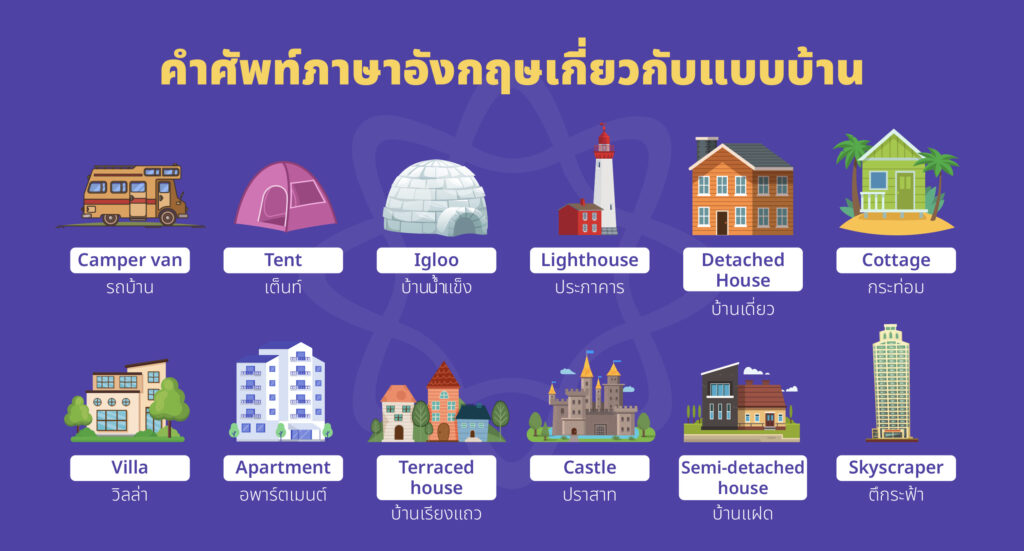
ตัวอย่างประโยคแนะนำเกี่ยวกับบ้านเป็นภาษาอังกฤษ
เพื่อเตรียมเรียงความภาษาอังกฤษที่เขียนอย่างดีในหัวข้อเรื่องที่อยู่อาศัย คุณจะต้องสร้างโครงร่างที่สมบูรณ์โดยประกอบด้วยแนวคิดต่อไปนี้:
| แนวคิด | ประโยคภาษาอังกฤษ | ความหมาย |
| Talking about your home (พูดถึงบ้านของคุณ) | I’d like to talk about my home. It’s a cozy little apartment in the heart of the city. | .ฉันอยากคุยเรื่องบ้านของฉัน เป็นอพาร์ตเมนต์เล็กๆ ที่สะดวกสบายในใจกลางเมือง |
| Let me tell you about where I live. I have a beautiful house with a garden in the suburbs. | ให้ฉันเล่าให้คุณฟังเกี่ยวกับที่ฉันอาศัยอยู่ ฉันมีบ้านสวยพร้อมสวนในเขตชานเมือง | |
| Today, I want to share some details about my residence. It’s a modern condo with a fantastic view. | วันนี้ผมอยากจะมาแบ่งปันรายละเอียดเกี่ยวกับที่พักของผมบ้าง เป็นอพาร์ตเมนต์ทันสมัยพร้อมวิวสวยงาม. | |
| Describing your house (อธิบายบ้านของคุณ) | My house is a spacious two-story villa with a large backyard. | บ้านของฉันเป็นวิลล่า 2 ชั้นกว้างขวางพร้อมสวนหลังบ้านขนาดใหญ่ |
| I live in a charming cottage that’s surrounded by nature. | ฉันอาศัยอยู่ในบ้านไม้ที่มีเสน่ห์ รายล้อมไปด้วยธรรมชาติ | |
| The place I call home is a stylish townhouse with a contemporary design. | ที่ที่ฉันเรียกว่าบ้านคือบ้านในเมืองมีสไตล์พร้อมการออกแบบที่ทันสมัย | |
| Introducing different rooms (แนะนำห้องต่างๆ) | There are four rooms in my house, one bedroom, one living room, one kitchen, and one bathroom. | ในบ้านของฉันมีสี่ห้อง: ห้องนอน ห้องนั่งเล่น ห้องครัว และห้องน้ำ |
| Behind the living room is the kitchen, this room is used for cooking and enjoying meals. | ด้านหลังห้องนั่งเล่นเป็นห้องครัว ห้องนี้ใช้สำหรับทำอาหารและทานอาหาร | |
| In my home, we have a lovely living room where we spend most of our evenings. | ที่บ้านของฉัน เรามีห้องนั่งเล่นที่สวยงามที่เราใช้เวลาส่วนใหญ่ในตอนเย็น | |
| Let me take you to my bedroom, which is a peaceful sanctuary for me. | ให้ฉันพาคุณไปที่ห้องนอนของฉันซึ่งเป็นสถานที่อันเงียบสงบสำหรับฉัน | |
| Our kitchen is the heart of the house, where we gather and enjoy delicious meals. | ห้องครัวคือหัวใจของบ้านซึ่งเราใช้ร่วมกันและเพลิดเพลินกับมื้ออาหารแสนอร่อย | |
| Talking about decor and furnishings (พูดถึงการตกแต่งและเฟอร์นิเจอร์) | There is a green sofa, a television and a sideboard in the living room. | ในห้องนั่งเล่นมีโซฟาสีเขียว ทีวี และตู้ข้าง |
| The interior of my house is decorated with a mix of vintage and modern furniture. | ภายในบ้านของฉันตกแต่งด้วยการผสมผสานระหว่างเฟอร์นิเจอร์คลาสสิกและทันสมัย | |
| I’ve adorned my living room with vibrant colors and unique artwork. | ฉันตกแต่งห้องนั่งเล่นด้วยสีสันสดใสและงานศิลปะที่เป็นเอกลักษณ์ | |
| Our dining room features an elegant chandelier and a long wooden table. | ห้องรับประทานอาหารของเรามีโคมระย้าที่หรูหราและโต๊ะไม้ยาว | |
| Sharing favorite spots (แบ่งปันสิ่งที่ชื่นชอบ) | One of my favorite spots in the house is the cozy reading nook by the window. | หนึ่งในสถานที่โปรดของฉันในบ้านคือมุมอ่านหนังสือแสนสบายริมหน้าต่าง |
| I absolutely love spending time on the balcony, especially during sunset. | ฉันชอบใช้เวลาอยู่บนระเบียงมากโดยเฉพาะตอนพระอาทิตย์ตก | |
| The fireplace in our living room is where we create cherished memories as a family. | เตาผิงในห้องนั่งเล่นคือที่ที่เราสร้างความทรงจำอันล้ำค่าร่วมกับครอบครัว | |
| Discussing changes and improvements (พูดถึงการเปลี่ยนแปลงและการปรับปรุง) | Recently, I’ve been considering renovating the kitchen to create a more open layout. | ช่วงนี้ผมกำลังพิจารณาปรับปรุงห้องครัวให้มีพื้นที่เปิดโล่งมากขึ้น |
| I’m planning to redecorate the guest room to make it more welcoming for visitors. | ฉันกำลังวางแผนตกแต่งห้องนั่งเล่นใหม่เพื่อให้เป็นมิตรกับผู้เข้าพักมากขึ้น | |
| Upgrading the garden is next on my list to make our outdoor space even more enjoyable. | การอัพเกรดสวนเป็นลำดับถัดไปของฉันเพื่อทำให้พื้นที่กลางแจ้งน่าอยู่ยิ่งขึ้น | |
| Talking about future plans (พูดถึงแผนการในอนาคต) | In the future, I hope to expand the house to accommodate a home office. | ในอนาคตหวังว่าจะขยายบ้านเพื่อรองรับโฮมออฟฟิศได้ |
| I’m looking forward to landscaping the backyard and adding a small pond. | ฉันกำลังตั้งตารอที่จะจัดสวนหลังบ้านและเพิ่มสระน้ำเล็กๆ | |
| My future dream home would be a cabin in the mountains, surrounded by nature. | บ้านในฝันของฉันในอนาคตจะเป็นกระท่อมบนภูเขาที่รายล้อมไปด้วยธรรมชาติ |
ตัวอย่างเรียงความบรรยายเกี่ยวกับบ้านเป็นภาษาอังกฤษ

คุณสามารถเรียนรู้คำศัพท์ผ่านตัวอย่างเรียงความเพื่ออธิบายวัตถุ ห้อง หน้าต่าง หรือประตูบ้านเป็นภาษาอังกฤษ เช่น:
| เรียงความที่ 1 | I live in a small house in my hometown and it is very beautiful. It has a living room, a kitchen, a balcony, two bedrooms and a bathroom. In the living room, there is a sofa, a television, a small aquarium, and an air conditioner. My bedroom is very cute. There is a computer, a pink bed, a lamp, and some teddy bears. I have a bookshelf above the table and a wardrobe next to my bed. The kitchen has a refrigerator, a microwave, a stove, and a sink. Next to the kitchen is the bathroom. It has a shower, a bath, a washing machine, and a tub. I love my house very much. |
| ความหมาย | ฉันอาศัยอยู่ในบ้านหลังเล็กๆในบ้านเกิดของฉันและมันสวยงามมาก บ้านมีห้องนั่งเล่น ห้องครัว ระเบียง ห้องนอน 2 ห้อง และห้องน้ำ ในห้องนั่งเล่นมีโซฟา ทีวี ตู้ปลาขนาดเล็ก และเครื่องปรับอากาศ ห้องนอนของฉันน่ารักมาก มีคอมพิวเตอร์ เตียงสีชมพู โคมไฟตั้งโต๊ะ และตุ๊กตาหมี ฉันมีชั้นวางหนังสือบนโต๊ะและมีตู้เสื้อผ้าข้างเตียง ห้องครัวมีตู้เย็น ไมโครเวฟ เตาแก๊ส และอ่างล้างจาน ถัดจากห้องครัวเป็นห้องน้ำ ห้องน้ำมีฝักบัว อ่างอาบน้ำ เครื่องซักผ้า ฉันรักบ้านของฉันมาก |
| เรียงความที่ 2 | My home is a serene sanctuary, nestled in a tranquil neighborhood. The living room, adorned with earthy tones, emanates warmth and comfort, offering a perfect space for relaxation. The modern kitchen boasts granite countertops and modern appliances, while the bedrooms, each unique in charm, provide comfort and solace. The backyard, a serene haven, flourishes with a variety of flowers, while a wooden deck serves as a spot for outdoor gatherings. This house holds cherished memories and echoes of laughter, truly a place where love and life flourish. |
| ความหมาย | บ้านของฉันเป็นสถานที่เงียบสงบ ตั้งอยู่ในใจกลางย่านที่เงียบสงบ ห้องนั่งเล่นตกแต่งด้วยโทนสีธรรมชาติ ให้ความรู้สึกอบอุ่น สบาย เป็นพื้นที่เหมาะกับการพักผ่อน ห้องครัวทันสมัยพร้อมเคาน์เตอร์หินแกรนิตและเครื่องใช้ล้ำสมัย ในขณะที่ห้องนอนแต่ละห้องมีเสน่ห์ในตัวเอง ให้ความสะดวกสบายและความสงบสุข สวนด้านหลังซึ่งเป็นสวรรค์อันเงียบสงบเบ่งบานไปด้วยดอกไม้นานาชนิด ในขณะที่ระเบียงไม้เหมาะสำหรับการพบกันกลางแจ้ง บ้านหลังนี้เก็บความทรงจำอันมีค่าและเสียงหัวเราะที่ก้องกังวาน เป็นสถานที่ที่ความรักและชีวิตเบ่งบานอย่างแท้จริง |

ตัวอย่างบทสนทนาเกี่ยวกับบ้านเป็นภาษาอังกฤษ
วิธีถามและเขียนที่อยู่บ้านเป็นภาษาอังกฤษผ่านการสนทนาสั้นๆ ระหว่างเพื่อนสองคนในชั้นเรียน:
| คนพูด | บทสนทนาภาษาอังกฤษ | ความหมาย |
| Alice | Hi, Tom! Where do you live? | สวัสดีทอม คุณอาศัยอยู่ที่ไหน? |
| Tom | I live at 123 Maple Street. What about you? | ฉันอาศัยอยู่ที่ 123 ถนนเมเปิ้ล แล้วคุณล่ะ |
| Alice | I live at 456 Oak Avenue. It’s a nice neighborhood. | ฉันอาศัยอยู่ที่ 456 Oak Avenue เป็นเพื่อนบ้านที่ดี |
| Tom | That sounds great! Is it far from your house? | ฟังดูดีมาก! มันไกลจากบ้านของคุณหรือเปล่า? |
| Alice | Not really. It’s about a ten-minute walk. Do you have a back door? | ไม่ไกลมาก ใช้เวลาประมาณสิบนาทีในการเดิน บ้านของคุณมีประตูหลังมไหม? |
| Tom | Yes, I do! It leads to my garden. | มี มันนำไปสู่สวนของฉัน |
| Alice | That’s nice! I love spending time in my yard. | ดีจัง ฉันชอบใช้เวลาอยู่ในสวนของฉัน |
| Tom | What do you like to do at home? | คุณชอบทำอะไรตอนอยู่ที่บ้าน? |
| Alice | I enjoy reading and watching movies. How about you? | ฉันชอบอ่านหนังสือและดูหนัง แล้วคุณล่ะ? |
| Tom | I like cooking and hosting friends. It’s always fun! | ฉันชอบทำอาหารและสนุกสนานกับเพื่อนฝูง น่าสนุกเสมอ |
| Alice | That sounds fun! Let’s plan a get-together at your place soon. | ฟังดูน่าสนใจ! วางแผนเจอกันที่บ้านคุณเร็วๆ นี้นะ |
| Tom | Sure! I’ll send you the address. | แน่นอน ฉันจะส่งที่อยู่ที่บ้านไปให้คุณ |
คำถามที่พบบ่อย
คำว่า House ใช้ a หรือ an?
ใช้ a ก่อนหน้า house เพราะคำว่า house ขึ้นต้นด้วยพยัญชนะ /h/
ตัวอย่าง: There is a house between the supermarket and the bookshop.
>>> Read more: A An The ใช้ยังไง ทฤษฎีและแบบฝึกหัดในภาษาอังกฤษ
คำว่า ประตูบ้านภาษาอังกฤษ คืออะไร?
ประตูบ้าน ในภาษาอังกฤษคือ door
ตัวอย่าง: Close the door behind you, please. (ปิดประตูด้านหลังของคุณหน่อย)
เลขที่บ้านภาษาอังกฤษ เขียนอย่างไร?
ใช้เลขหรือตัวอักษรเพื่อ เขียนบ้านเลขที่ในภาษาอังกฤษ
ตัวอย่างการเขียนเลขที่บ้านภาษาอังกฤษ : 123 Avenue หรือสามารถเขียนด้วยตัวอักษร one hundred twenty-three Avenue.
เขียนที่อยู่บ้านภาษาอังกฤษ อย่างไรให้ถูกต้อง?
เขียนที่อยู่บ้านเป็นภาษาอังกฤษที่ถูกต้องตามโครงสร้าง บ้านเลขที่ – ชื่อถนน – จังหวัด – รหัสไปรษณีย์
ตัวอย่าง: 123 Main Street, New York, NY 10001.
>>> Read more: วิธีการเขียนที่อยู่ภาษาอังกฤษให้ถูกต้องที่สุด
ในพจนานุกรม Cambridge บ้านมีความหมายว่าอย่างไร?
ตามพจนานุกรม Cambridge, House – a building that people, usually one family, live in. หมายถึง อาคารที่ผู้คน มักจะเป็นครอบครัวอาศัยอยู่
สรุป House และ Home ล้วนแต่ใช้พูดถึง บ้านภาษาอังกฤษ อย่างไรก็ตาม มีความแตกต่างระหว่างสองคำข้างต้นในบางบริบท บทความข้างต้นช่วยให้คุณแยกแยะระหว่าง House และ Home เมื่อใช้ในการสื่อสาร เรียนภาษาอังกฤษที่บ้านกับ ELSA Speak เพื่อขยายคำศัพท์ภาษาอังกฤษ บทสนทนาภาษาอังกฤษ ของคุณผ่านหัวข้อต่างๆ มากมาย
รอสักครู่ ภาษาอังกฤษ ในภาษาอังกฤษพูดยังไง และการออกเสียงที่ถูกต้องที่สุดคืออะไร? มาเรียนรู้วิธีพูดและประโยคที่คล้ายกับ “รอสักครู่” กับ ELSA Speak ในบทความต่อไปนี้กันนะ!
รอสักครู่ ภาษาอังกฤษ
รอสักครู่ เป็นประโยคที่คุ้นเคยในการสื่อสารในชีวิตประจำวัน มักใช้เพื่อขอให้ใครสักคนรอในช่วงเวลาสั้น ๆ ในภาษาอังกฤษ ประโยคนี้สามารถแปลได้หลายประโยค แต่ประโยคที่พบบ่อยที่สุดคือ Wait a Moment เป็นวิธีการพูดที่สุภาพและเข้าใจง่าย ซึ่งใช้กันทั่วไปในสถานการณ์ที่เป็นทางการและไม่เป็นทางการ
ตัวอย่าง:
- Wait a moment, please. I’ll arrive in a minute. (กรุณารอสักครู่ ฉันจะไปถึงในอีกไม่กี่นาที)
- Can you wait a moment? I’m almost done. (รอสักครู่ได้ไหม ใกล้เสร็จแล้ว)

รอสักครู่ ภาษาอังกฤษ คํา อ่าน
การออกเสียงและคําอ่านของ Wait a moment เป็นดังนี้:
- Wait: /weɪt/
- a: /ə/ (เสียง schwa, ออกเสียงเบาและไม่เน้นเสียงหนัก)
- Moment: /ˈmoʊ.mənt/
ถ้าต้องการฝึกการออกเสียงที่ถูกต้อง คุณสามารถเข้ามาเรียนรู้ภาษาอังกฤษบนแอป ELSA Speak ได้เลย ต่อไปนี้คือสิ่งที่โดดเด่นของ ELSA เมื่อเปรียบเทียบกับการใช้งานบนแอปอื่น ๆ:
- AI สามารถจดจำเสียงอย่างแม่นยำ: วิเคราะห์ข้อผิดพลาดในการออกเสียงในแต่ละพยางค์ เหมาะสำหรับผู้ที่เริ่มเรียนและมีมากกว่า 120 ภาษา
- แก้ไขข้อผิดพลาดอย่างละเอียด: แนะนำการแก้ไขข้อผิดพลาดที่ชัดเจน พร้อมวิดีโอฝึกการออกเสียงที่แม่นยำและแบบฝึกหัด
- การปรับเปลี่ยนในแบบของคุณ: เส้นทางการเรียนรู้ที่กำหนดตามระดับของตนเอง
- แบบฝึกหัดมากมาย: ฝึกการออกเสียง คำศัพท์ และน้ำเสียงที่หลากหลาย
- คอร์สเรียนประกอบด้วยสี่ส่วน: Speech Analyzer, ELSA AI และ ELSA Pro และคอร์สเรียนเตรียมสอบ แบบฝึกหัดและบทสนทนาภาษาอังกฤษที่เหมือนจริงของ ELSA จะทำให้คุณมั่นใจในขณะที่คุณเตรียมตัวสอบ (คอร์สเรียนนี้ไม่มีจำหน่ายแต่อยู่ในแพ็คเกจ ELSA Premium – 4 in 1 ราคาเรียนเริ่มต้นเพียง 12 บาท/วัน)
>>> Read more:
- เคน นครินทร์ แบ่งปันเคล็ดลับพิชิตภาษาอังกฤษภายใน 1 ปี
- ลูกกอล์ฟ Review เคล็ดลับในการเรียนภาษาอังกฤษที่มีประสิทธิภาพอย่างน่าประหลาดใจ

ประโยคที่คล้ายกับ Wait a moment
นอกจาก Wait a moment แล้ว คุณยังสามารถพูดประโยคต่อไปนี้ได้:
| ประโยค | ความหมาย | กรณี |
| Hold on a second | รอสักครู่ | ใช้เมื่อคุณต้องการให้ใครสักคนรอในช่วงเวลาสั้น ๆ |
| Give me a moment | ขอเวลาสักครู่ | วิธีพูดอย่างสุภาพเมื่อคุณต้องการเวลามากขึ้นในการทำบางสิ่งบางอย่าง |
| Just a second | รอเดี๋ยวนะ | เป็นมิตร ไม่เป็นทางการเกินไปเมื่อคุณต้องการให้ใครสักคนรอ |
| Hang on | รอแป๊บ (ไม่เป็นทางการ) | วิธีพูดที่สั้น ๆ สะดวกสบายเมื่อคุณต้องการขอให้รอ |
| One moment, please | รอสักครู่นะ (ทางการ) | ใช้ในสถานการณ์การสื่อสารที่สุภาพ มักใช้ในสภาพแวดล้อมการทำงานหรือการบริการ |
| Bear with me | ทนรอฉันหน่อยนะ | ใช้เมื่อคุณต้องการให้ใครสักคนรอและรักษาความอดทน โดยปกติเพื่ออธิบายสถานการณ์ |
| Hold tight | จับไว้แน่น ๆ นะ/รอหน่อยนะ | ไม่เป็นทางการ บางครั้งจะใช้เพื่อให้กำลังใจหรือทำให้มั่นใจ |
| Wait a bit | รอฉันหน่อย | เป็นกันเอง มักจะใช้ในการสื่อสารในชีวิตประจำวัน |
| Hang on a moment | รอสักครู่ | คล้ายกับ Hang on ไม่เป็นทางการ |
| Give us a second | ขอเวลาสักครู่ | ไม่เป็นทางการ มักใช้เมื่อมีคนที่เกี่ยวข้องในบริบทมากกว่า |
| Half a moment | รอสักครู่ | วิธีการพูดที่เป็นกันเองและไม่จริงจัง |
| I’ll be right with you | เดี๋ยวมานะ | ใช้เพื่อรับรองผู้อื่นว่าคุณจะกลับมาทันทีเมื่อทําบางอย่างเสร็จ |
| Wait and see | คอยดูเหอะ | มักใช้เพื่อกระตุ้นให้ใครสักคนอดทน โดยเฉพาะในสถานการณ์ที่ไม่คาดคิด |
| You’ll just have to be patient. | คุณต้องอดทนรอหน่อยก็เท่านั้น | มักใช้เพื่อเตือนใครบางคนให้อดทนในบางสถานการณ์ |
| We wish to apologize for the delay to… | ขออภัยที่ล่าช้าในการ… | ใช้ในบริบทที่เป็นทางการ มักใช้เพื่อขอโทษลูกค้าหรือคู่ค้า |
| Don’t be so impatient | อย่าใจร้อนสิ | การเตือนที่เป็นมิตรหรือเข้มงวด ขึ้นอยู่กับบริบท |

คําถามที่พบบ่อย
รอสักครู่นะคะ ภาษาอังกฤษ คืออะไร?
Please wait a moment.
โปรดรอ ภาษาอังกฤษ คืออะไร?
Please wait; Hold a moment, please; หรือ Wait for me
เช็คให้สักครู่ ภาษาอังกฤษ คืออะไร?
Let me check./ Let me check it for you./ Let me check for a second.
Wait a Moment สุภาพไหม?

ประโยค Wait a Moment เป็นประโยคที่ค่อนข้างสุภาพเมื่อคุณต้องการขอให้ใครสักคนรอในช่วงเวลาสั้น ๆ อย่างไรก็ตาม ระดับของความสุภาพนั้นขึ้นอยู่กับน้ำเสียงและบริบท ถ้าต้องการเพิ่มความสุภาพ คุณสามารถเพิ่มคำว่า please หรือใช้โครงสร้างที่เป็นทางการมากขึ้นได้
ตัวอย่าง:
- Could you please wait a moment. (กรุณารอสักครู่ได้ไหมคะ/ครับ?)
- Please wait for a moment. (กรุณารอสักครู่ค่ะ/ครับ)
ถ้าพูดโดยไม่เอ่ยคำว่า please หรือพูดด้วยน้ำเสียงที่แข็งกระด้าง ประโยคนี้สามารถตีความได้ว่าเป็นการไม่สุภาพ
ความแตกต่างระหว่าง Just a moment และ Wait a minute
| Just a moment | Wait a minute | |
| ระดับความสุภาพ | สุภาพและเป็นทางการกว่า | เป็นทางการน้อยลง เป็นมิตรมากขึ้น และเข้าถึงได้ง่ายกว่า |
| บริบท | เหมาะสำหรับสถานการณ์การทำงาน การสื่อสารทางวิชาชีพ หรือเมื่อต้องการความสุภาพ | มักใช้ในการสนทนาในชีวิตประจำวัน บางทีอาจแสดงความประหลาดใจหรือขอให้หยุด |
| ตัวอย่าง | Just a moment, I’ll check that for you. (รอสักครู่นะ ฉันจะตรวจสอบให้คุณ) | Wait a minute, are you saying he didn’t show up? (เดี๋ยวก่อนนะ คุณกำลังจะบอกว่าเขาไม่ได้มาเหรอ?) |
A moment หมายถึงอะไร?
A moment เป็นวลีที่ใช้เพื่อแสดงถึงช่วงเวลาสั้น ๆ โดยปกติจะเทียบเท่ากับแป๊ปเดียว หรือ นิดนึง ในภาษาไทย
ตัวอย่าง:
- It’ll only take a moment. (จะใช้เวลาเพียงชั่วครู่เท่านั้น)
- Can you give me a moment? (คุณช่วยให้เวลาฉันสักครู่ได้ไหม?)
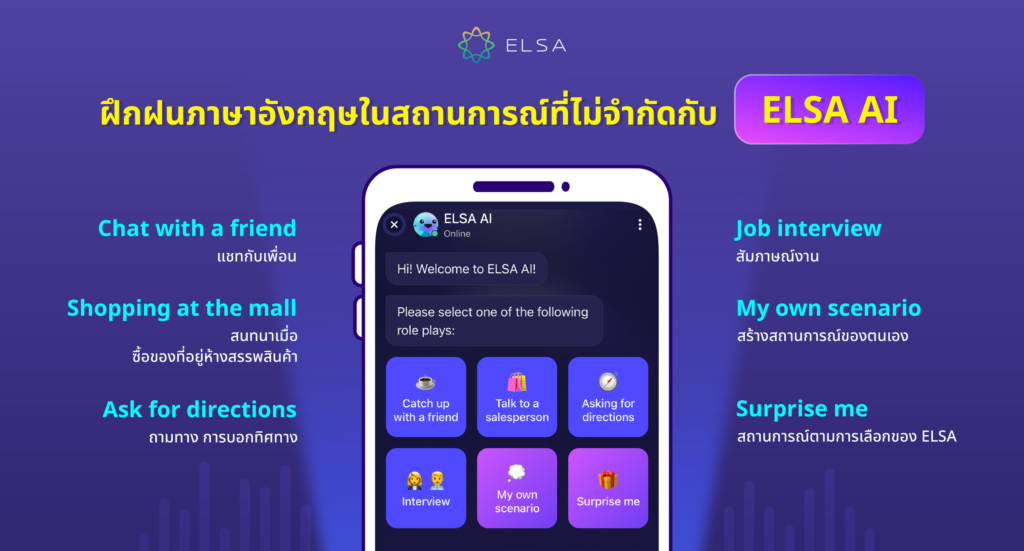
กรุณารอสักครู่ แปลอังกฤษ
ประโยครอสักครู่ สามารถแปลเป็นภาษาอังกฤษได้ดังนี้:
| ประโยค | ความหมาย | วิธีใช้ |
| Please wait for a moment. | กรุณารอสักครู่ | ใช้ในบริบทที่สุภาพ เพื่อขอให้ใครสักคนรอสักครู่ |
| Could you please wait for a moment? | กรุณารอสักครู่ได้ไหม? | ใช้ในบริบทที่เป็นทางการและสุภาพกว่า มักใช้เมื่อขอให้ใครสักคนรอด้วยความเคารพ |
| Just a moment, please. | กรุณารอสักครู่ | ใช้เมื่อคุณต้องการพูดให้ใครสักคนรอสักครู่แบบสั้น ๆ แต่ยังมีความสุภาพ |
คุณสามารถเลือกคำที่เหมาะสมที่สุด ซึ่งขึ้นอยู่กับบริบท
การทำความเข้าใจและการใช้ประโยคที่คล้ายกับ Wait a Moment ไม่เพียงแต่ช่วยให้คุณเพิ่มคลังคำศัพท์ แต่ยังเพิ่มความสามารถในการสื่อสารอย่างยืดหยุ่นในหลาย ๆ สถานการณ์อีกด้วย ในขณะเดียวกัน การเรียนรู้คําว่า รอสักครู่ ภาษาอังกฤษ คําอ่าน ให้เชี่ยวชาญก็เป็นปัจจัยสำคัญที่จะช่วยให้คุณสื่อสารได้อย่างมั่นใจและเป็นธรรมชาติมากขึ้น นอกจากนี้ คุณยังสามารถใช้แอปพลิเคชัน ELSA Speak ซึ่งเป็นเครื่องมือที่มีประโยชน์เพื่อช่วยพัฒนาทักษะภาษาอังกฤษได้อย่างมีประสิทธิภาพ